Sites: news | india | latam | brasil | indonesia
Feeds: news | india | latam | brasil | indonesia
topic: Green Energy
Social media activity version | Lean version
Indonesia civil society groups raise concerns over proposed Borneo nuclear reactor
- Indonesia’s largest environmental advocacy group, Walhi, staged demonstrations in Jakarta and West Kalimantan province to raise awareness about a proposed nuclear power plant in West Kalimantan’s Bengkayang district.
- In 2021, a U.S. agency signed a partnership agreement with Indonesia’s state-owned power utility to explore possibilities for a reactor in the province. Survey work is currently being conducted to determine the project’s viability and safety.
- Some environmental groups have questioned the merit of the plan on safety grounds and the availability of alternative renewable sources.
Rocky rollout for Bangladesh’s ambitious solar-powered irrigation plans
- Nearly half of irrigation costs in Bangladesh are due to irrigation, and the diesel pumps that currently power irrigation networks are responsible for 1.6% of the country’s greenhouse gas emissions.
- To address both issues, the government is rolling out a nationwide program to gradually replace these diesel pumps with solar-powered ones, aiming to slash irrigation-related emissions by 0.8 million metric tons by 2030.
- It also says that given that irrigation use is concentrated in the non-monsoon months, the surplus energy generated by the pumps the rest of the time can be fed into the grid, providing up to 480 gigawatt-hours of clean energy a year.
- In pilot programs, however, farmers have expressed concern over the reliability of the solar pump systems, especially for water-intensive crops such as rice and corn, and have also noted that their irrigation costs remain the same.
Tribes turn to the U.N. as major wind project plans to cut through their lands in the U.S.
- Last week a United States federal judge rejected a request from Indigenous nations to stop SunZia, a $10 billion dollar wind transmission project that would cut through traditional tribal lands in southwestern Arizona.
- Indigenous leaders and advocates are turning to the U.N. to intervene and are calling for a moratorium on green energy projects for all U.N. entities “until the rights of Indigenous peoples are respected and recognized.”
- Indigenous leaders say they are not in opposition to renewable energy projects, but rather projects that don’t go through the due process and attend their free, prior and informed consent.
- According to the company, the wind transmission project is the largest clean energy infrastructure initiative in U.S. history, and will provide power to 3 million Americans, stretching from New Mexico to as far as California.
Consent and costs are key questions on extraction of ‘energy transition’ minerals
- The many environmental, social, and health impacts of extracting minerals that power renewable energy, mobile phones and electric vehicles need more debate and detailed media coverage, an Indigenous rights activist and journalist say on the podcast.
- Mongabay speaks with Galina Angarova, Indigenous executive director of the SIRGE Coalition, and environmental journalist Ian Morse about critical questions to ask about the demand for certain minerals and who benefits from their extraction.
- Research indicates as much as 54% of all transition minerals are on or near Indigenous land, however, no nation has properly implemented the protocols of Free Prior and Informed Consent (FPIC), a framework that’s key to ensuring that local communities are aware of, benefit from – and especially are not harmed by – such activities.
- The risk of global supply chain disruptions due to the concentration of minerals in relatively few countries, or the potential formation of cartels restricting their supply, adds further complexity to the situation, the two podcast guests say.
E-bikes could cut smog, energy use and congestion globally — but will they?
- The global market for e-bikes is surging. These bicycles, usually equipped with pedals and an electric motor assist, are popular with consumers and commuters and are becoming part of local business delivery systems. The trend could significantly reduce particulate pollution and smog, as well as cut carbon emissions in the transportation sector.
- But there are barriers. No international manufacturing standard yet exists for e-bikes. Also, transportation and charging infrastructure doesn’t adequately accommodate e-bikes, especially in the developing world where electric bicycles have the potential to replace super-polluting gas-powered scooters, motorcycles and pedicabs.
- Poorly made or improperly maintained e-bike batteries have developed a reputation for sometimes causing fires, exploding and even killing people, which has caused hesitation among consumers. While this safety problem is a real one, manufacturers and enthusiasts say the e-bike industry can effectively deal with it.
- Some governments are offering subsidies and tax incentives to e-bike buyers, while some companies are offering deals allowing customers to trade in gas two-wheelers for e-bikes. As sales and use grow, updated bike lane construction and safety rules setting permissible e-bike horsepower, speed and size will be required.
This year’s ranking of EV carmakers from most to least ‘clean’: Report
- A new scorecard by a coalition of labor and environmental civil society organizations ranked the top 18 automakers against 80 measures of what a clean car supply chain would look like.
- While car companies are increasingly embracing electric vehicles, a lack of tailpipe emissions is not enough for a car to be considered truly ‘clean,’ the authors say.
- From the steel, aluminum, tires, batteries and people affected along the supply chain, the mining and manufacturing of these metal-dense machines puts heavy burdens on landscapes, Indigenous peoples and workers.
- Ford and Mercedes-Benz lead the automotive world in working to clean up their supply chains, while Tesla jumped to third from last year’s ninth spot. East Asian firms fell behind as they lacked policies to address decarbonization in the production of steel and aluminum.
Critics fear catastrophic energy crisis as AI is outsourced to Latin America
- AI use is surging astronomically around the globe, requiring vastly more energy to make AI-friendly semiconductor chips and causing a gigantic explosion in data center construction. So large and rapid is this expansion that Sam Altman, the boss of OpenAI, has warned that AI is driving humanity toward a “catastrophic energy crisis.”
- Altman’s solution is an audacious plan to spend up to $7 trillion to produce energy from nuclear fusion. But even if this investment, the biggest in all of history, occurred, its impact wouldn’t be felt until mid-century, and do little to end the energy and water crises triggered by AI manufacture and use, while having huge mining and toxic waste impacts.
- Data centers are mushrooming worldwide to meet AI demand, but particularly in Latin America, seen as strategically located by Big Tech. One of the largest data center hubs is in Querétaro, a Mexican state with high risk of intensifying climate change-induced drought. Farmers are already protesting their risk of losing water access.
- As Latin American protests rise over the environmental and social harm done by AI, activists and academics are calling for a halt to government rubber-stamping of approvals for new data centers, for a full assessment of AI life-cycle impacts, and for new regulations to curb the growing social harm caused by AI.
We need a better understanding of how crops fare under solar panels, study shows
- In agrivoltaics, farmers grow crops beneath or between solar panels.
- Proponents say the technology can help achieve clean energy goals while maintaining food production, but experts caution that careful analysis and guidelines are needed if we’re not to compromise agricultural production.
- A new synthesis of previously published studies finds that overall crop yields decline as the amount of land covered by solar panels increases.
- This ground cover ratio is a convenient, easily measured and reproducible metric that can be used to predict crop yields and better evaluate agrivoltaic systems.
Report: Rush for ‘clean energy’ minerals in Africa risks repeating harmful extractivist model
- The nonprofit Global Witness investigated lithium mining projects in Zimbabwe, the Democratic Republic of Congo, and Namibia, which appear to reproduce the same model of extractivism that has impoverished African countries for centuries.
- In March, residents of the Namibian town of Uis took to the streets to protest the activities of Chinese miner Xinfeng, alleging the company was carrying out large-scale industrial mining without the proper permits or social license.
- In Zimbabwe, activist Farai Maguwu from the Centre for Natural Resource Governance described a similar experience of exclusion and exploitation at Chinese miner Sinomine’s Bikita lithium operation, calling it “typical extractivism.”
- One of the ways to prevent exploitation is to shut out companies that “socialize the costs and privatize the profits,” Maguwu said, adding he remains hopeful that encouraging competition between companies from across the world is the way to ensure better outcomes for Zimbabweans.
New dams in Cambodia pit ‘green’ hydropower against REDD+ project
- The recent approval of two hydropower dams in Cambodia’s Cardamom Mountains could undermine a REDD+ carbon project in the area.
- The Southern Cardamom REDD+ Project relies on keeping the forests in this region standing — a goal researchers say is “completely incompatible” with the forest clearing and flooding necessitated by the new dams.
- The lack of transparency inherent in both the carbon market and the Cambodian government means that the fate of the Cardamoms remains unclear for now.
Little achieved for Indigenous groups at U.N. climate summit, delegates say
- At this year’s U.N. climate conference, COP28, Indigenous delegates numbered more than 300, but were left generally disappointed with the outcomes of the event.
- The final agreement had little inclusion of Indigenous rights and excluded an Indigenous representative from sitting on the board of the newly launched loss and damage fund.
- Indigenous groups say two big climate mitigation strategies, the clean energy transition and carbon markets, should include robust protection of Indigenous rights and consent.
- Despite setbacks, Indigenous leaders say they’re working on increasing their presence and influence at the next climate conferences, including upping their numbers to 3,000 delegates, creating a large international Indigenous Commission, and taking part in the summit’s decision-making.
Indonesia pushes carbon-intensive ‘false solutions’ in its energy transition
- Indonesia’s newly revised plan for a $20 billion clean energy transition has come under criticism for offering “false solutions” that would effectively cancel out any gains it promises.
- One of its most controversial proposals is to not count emissions from off-grid coal-fired power plants that supply industrial users without feeding into the grid.
- Emissions from these so-called captive plants alone would exceed any emissions reductions projected under the rest of the Just Energy Transition Partnership.
- The plan also puts a heavy emphasis on “false” renewables solutions such as biomass cofiring and replacing diesel generators with natural gas ones.
The Cloud vs. drought: Water hog data centers threaten Latin America, critics say
- Droughts in Uruguay and Chile have led residents to question the wisdom of their governments allowing transnational internet technology companies to build water-hungry mega-data centers there.
- As servers process data, they need lot of water to keep them cool. But if demand grows as expected, the world will need 10-20 times more data centers by 2035, and they’ll be using far more water. Many will likely be built in economically and water-challenged nations already facing climate change-intensified droughts.
- Latin American communities fear that this “data colonialism” will consume water they desperately need for drinking and agriculture, and are critical of their governments for giving priority treatment to transnational tech giants like Google and Microsoft, while putting people’s access to a basic human necessity at risk.
- Surging digital data use by 2030 may cause each of us in the developed world to have a “digital doppelganger,” with our internet use consuming as much water as our physical bodies. But much of the stored data is “junk.” Critics urge that nations insist on tougher regulations for transnational companies, easing the crisis.
Study: Tricky balancing act between EV scale-up and mining battery metals
- A recent study finds rapidly switching to electric vehicles could significantly cut emissions but also increase demand for critical battery metals like lithium and nickel.
- Mining metals like lithium has major environmental impacts including deforestation, high water use, and toxic waste.
- Electrifying heavy-duty vehicles requires substantially more critical metals than other EVs and could account for 62% of critical metal demand in coming decades despite making up just 4-11% of vehicles.
- The researchers recommend policies to support recycling, circular economies, alternative battery chemistries, and coordinated action to balance environmental and material needs.
Indonesian voters want a clean energy plan, but candidates haven’t delivered
- Candidates running in Indonesia’s presidential election next year must make clear their plans for transition the country away from fossil fuels and toward clean energy, policy experts say.
- A survey shows young Indonesians, who make up the majority of potential voters, view environmental issues in general, and a just energy transition in particular, as crucial issues for a new president to tackle.
- However, none of the three hopefuls who have declared their candidacies to date have addressed these issues, with the survey reflecting a sense of pessimism among respondents.
- Indonesia, a top greenhouse gas emitter, has said it aims to hit net-zero emissions by 2060 and retire its existing fleet of coal-fired power plants, but continues to build more coal plants to serve its growing metal-processing sector.
In Brazil, rural communities are caught in the eye of the wind farm storm
- In Brazil’s semiarid Caatinga biome, wind power farms have brought dirt, noise and disruption to the livelihood of local communities.
- Many locals say the project developers have failed to properly consult them before building roads, infrastructure and turbines in the region.
- Wind power is considered a clean energy source in Brazil, which qualifies developers for access to easier financing and licensing, often at the expense of conflicts with local villages.
- From loss of livelihoods to damaged houses, this investigation by the Marco Zero news outlet shows how the development model that Brazil has adopted for wind power expansion has come at a high cost to rural communities.
EVs offer climate hope, but total auto supply chain revamp is vital
- Internal combustion engine vehicles (ICE) and electric vehicles (EV) both have supply chains that generate significant environmental impacts. Experts argue that circular economy principles — based on reducing, reusing and recycling materials — are key to increasing EV sustainability. But the auto industry has far to go to get there.
- Circularity is deemed particularly important for EVs, which are tipped as a vital climate solution and as the future of light transport across the globe. But their introduction globally is dependent on soaring material resourcing and production, all coming with “embedded emissions,” pollution and other impacts.
- At present, circularity is low in the auto industry, but experts see great potential, particularly for EV batteries. They argue for changes all along the supply chain to reduce material use and encourage advanced recycling.
- Others emphasize a holistic approach to land transport that reduces demand for automobiles in favor of public transportation. Circular economy solutions need to be achieved quickly in the transport sector if emissions are to be cut enough to help curb climate change and reduce pollution and other environmental ills.
Internal combustion vs. EVs: Learning from the past to boost sustainability
- Sales of electric vehicles are gathering pace, with numbers taking to the road steadily increasing in the U.S., Europe, and China; though that rollout is lagging far behind in emerging economies, especially in the Global South. That’s an issue that will need to be addressed if the world is to maximize transportation carbon cuts.
- EVs clearly outperform internal combustion engines (ICEs) in their vehicle carbon emissions. But assessments must be made across the whole life cycle of both types of vehicles to create true comparisons of environmental impacts and learn from them. EVs, for example, require lithium, the mining of which seriously pollutes.
- Even the amount of emissions produced by EVs needs to be carefully evaluated. While the cars themselves are clean, total emissions vary greatly depending on how the electricity to run them is produced (if the electrical grid is powered by coal, oil or gas, that’s very different than energy coming from wind and solar).
- For EVs to achieve their full sustainability potential, every aspect of automotive production needs to be assessed not only for environmental impacts, but for their effects on society, livelihoods and more. The use of a circular economy blueprint for creating clean EV supply chains will be assessed in part two of this story.
Nuclear pioneers press ahead with plans for Indonesia island frontier
- PT ThorCon Power Indonesia is moving closer toward building an experimental nuclear reactor on a remote island in a strait bisecting the islands of Sumatra and Borneo.
- The company says the electricity generated by a thorium-powered reactor could generate electricity at 3 cents per kilowatt hour while emitting close to zero greenhouse gases.
- Some worry the project could threaten delicate marine ecosystems on an island that was, until recently, protected as a conservation area.
A just energy transition requires better governance & equity in the DRC
- The global energy transition has increased demand for critical minerals involved in the making of products such as lithium-ion batteries, solar panels and other renewable energy sources.
- In the Democratic Republic of Congo, this demand has fueled a poorly regulated mining sector that has forced Indigenous communities off their land, polluted water and air, and given little back in the way of infrastructure or development.
- The DRC has also recently opened 27 blocks of land for oil exploration under the auspices of lifting the nation out of poverty, but our guests say the handling of these other mineral revenues doesn’t bode well for an equitable oil boom.
- Joseph Itongwa Mukumo, an Indigenous community member of Walikale in the North Kivu province and director of ANAPA-DRC, and Christian-Géraud Neema Byamungu, Francophone editor at the China Global South Project, speak with Mongabay about the impacts of mining on local and Indigenous communities and what DRC residents need for a just energy transition.
Norway cites ‘green transition’ in move toward embracing deep-sea mining
- Norway has announced its intention to open 281,200 square kilometers (nearly 108,600 square miles) of its nearby ocean to deep-sea mining.
- The country’s parliament could still overturn the decision, but most political parties in Norway currently support moving forward with deep-sea mining.
- Critics of deep-sea mining say Norway needs to pay attention to the warnings of its own scientists about the dangers of deep-sea mining.
Indonesian coal giant Adaro’s ‘sustainable’ smelter slammed as ‘greenwashing’
- Indonesia’s largest coal miner, Adaro, has been criticized for plans to build coal-fired power plants for a new aluminum smelter, contradicting the company’s claim of a green transition.
- Adaro is marketing the smelter project as a flagship green, renewable development for Indonesia, a move that environmentalists describe as “greenwashing.”
- Adaro is reportedly struggling to secure financing for the project due to the greenwashing allegations as more banks steer clear of fossil fuel projects.
- Adaro has denied the report, saying five banks are committed to funding the project, but hasn’t named them.
A powerful U.S. political family is behind a copper mine in the Colombian rainforest
- Two members of the Sununu family, a powerful U.S. Republican Party dynasty, are among the directors or shareholders of Libero Copper, a copper mine promoted in the Colombian Amazon. John H. Sununu, a powerful former governor of New Hampshire and former White House chief of staff to George Bush Sr. is one of its ultimate beneficial owners. His son Michael Sununu sits on the mining company’s board of directors.
- The government sees the mine as strategic to the clean energy transition by providing copper used in electric cars, solar panels and wind turbines. However, Libero’s two Sununus are known in the U.S. as skeptics of the scientific consensus that climate change is man-made, raising questions now that they are at the helm of a ‘green energy’ mining project in the midst of such a fragile and strategic biome as the Amazon rainforest.
- In order for Libero Copper’s project to become a reality, the company says it requires not only an exploitation license and an environmental permit from the Colombian government, but also that authorities lift the protected area status of part of the deposit. The reason is that one-fifth of the copper that the mining company seeks to extract is buried under a protected natural area known as a nationally protected forest reserve.
- The prospect of this mine is a cause of concern for the Indigenous communities in its area of influence, especially the Inga reservation of Condagua to the north and Kamentsá Biya of Sibundoy to the west, who fear disruption of critical waterways and the destruction of their territory.
Report: Forest-razing biomass plant in Indonesia got millions in green funds
- An Indonesian oil and gas company is using government money to clear rainforest for a biomass power plant, according to a new report.
- The project has received a total of $9.4 million from two Ministry of Finance agencies, including one tasked with managing environmental protection funds from international donors.
- Criticism of Medco’s activities reflects a broader debate over whether clear-cutting rainforest can ever be considered sustainable, even when done in the name of transitioning a major coal-producing country away from fossil fuels.
Flooding for hydropower dams hits forest-reliant bats hard, study shows
- Researchers have found that bats specialized to feed on insects within the dense canopy of tropical forests are disproportionately affected by hydropower development.
- The study in Peninsular Malaysia adds to a growing body of evidence demonstrating how hydropower developments impoverish tropical ecosystems.
- Although forest-specialist bats were lost from the flooded landscape, bats that forage along forest edges and in open space were still present.
- To minimize localized extinctions, the researchers advocate a preventive rather than mitigative approach to hydropower planning that prioritizes habitat connectivity and avoids creating isolated forest patches.
From palm oil waste to cellulosic ethanol: Indonesia’s opportunity (commentary)
- Many Indonesian farmers say they haven’t seen benefits from the country’s biofuel program. Cellulosic ethanol could help fix the problem, a new op-ed says.
- Tenny Kristiana of the International Council on Clean Transportation argues Indonesia could develop a domestic cellulosic ethanol industry that would use leftover plant residues such as palm trunks, empty palm fruit bunches and palm press fiber.
- Currently, Indonesia exports these leftovers to countries like Japan, but developing an industry at home could aid local farmers and create new jobs in factories, transportation and plantation work.
- This post is a commentary. The views expressed are those of the author, not necessarily of Mongabay.
As Exxon bows out, industry takes step toward sustainable algae biofuels
- In February, ExxonMobil gave up its decade-long attempt to cultivate algae as a profitable and scalable feedstock for biofuel — a liquid alternative energy source needed to power aviation, ocean-going ships, and long-distance trucking, while also combating climate change.
- That corporate setback was offset by advances elsewhere in the industry: California-based algae biofuel company Viridos, which lost ExxonMobil as its partner, raised $25 million this year as it gained United Airlines, Chevron and Breakthrough Energy Ventures as investors to keep its algae project moving toward commercialization.
- Also, this year, the U.S. Department of Energy Bioenergy Technologies Office (BETO) funded four major algae biofuel and biomass projects to chart scalable production processes and achieve low-carbon intensity efficiency.
- Several of these algae initiatives are now moving from basic R&D into pilot programs, with scaled-up commercial production possibly just a few years away, according to industry experts. Environmentalists are concerned about future land, energy and fertilizer impacts during production, though say it is too early to assess potential commercialization effects.
Apache tribe decry loss of sacred site to massive copper mine at both court and the U.N.
- The San Carlos Apache Tribe in Arizona, United States, has taken its legal battle against the U.S. government to the United Nations to save its traditional territory from what could be North America’s largest copper mine.
- The Indigenous tribe say that the mine will permanently alter desert ecosystems and destroy their most sacred site, akin to Jerusalem’s Temple Mount or Mecca’s Kaaba.
- The mine could produce up to 40 billion pounds of copper over 40 years, providing about 1,500 jobs, millions in tax revenue and compensation and minerals for renewable energy development.
- Both sides are awaiting a ruling from the 9th Circuit Court on whether destruction of the site violates the religious rights of the Apache people.
Plan to mine ‘clean energy’ metals in Colombian Amazon splits communities
- Libero Copper, a Canadian company, plans to mine copper, molybdenum and other metals in the richly biodiverse Andean-Amazon Piedmont, which has led to strong divisions within Indigenous and local communities.
- The copper and molybdenum project is framed as a green project that could contribute much-needed minerals for the country’s energy transition, a proposal that aligns with the goals of the new left-wing government of Gustavo Petro.
- However, some communities and environmental activists oppose the mining project over concerns of deforestation, landslides and loss of forest-based livelihoods in the region.
- Others support the clean energy transition and the company’s promise of jobs in the historically neglected region.
Electricity day and night: Solar power is changing isolated Amazon communities
- The Amazon region produces more than a quarter of the energy in Brazil. Still, hundreds of thousands of families are off the grid and rely on expensive diesel generators to produce electricity.
- Solar panels and other renewable energies can greatly improve the lives of people in these regions and help create jobs.
- NGOs and governments have implemented renewable energy plans in different communities in the Amazon with positive results.
- Experts agree that public policies to provide electricity in the region should also be designed to help generate new sources of income for these communities.
‘They paid for it with misery’: Q&A with Chile dam critic Jose Marihuan Ancanao
- Jose Marihuan Ancanao, president of the Ayin Mapu La Peña community, spoke to Mongabay’s Maxwell Radwin about the impact of hydropower plants in parts of the Chilean Andes that are home to Indigenous people with a spiritual connection to rivers and the surrounding mountains.
- Marihuan was relocated in the early 2000s by a different hydropower plant and, although relocation isn’t a threat this time around, is witnessing the construction of another mega dam near his community.
- The 90-megawatt Rucalhue power plant has resulted in the felling of nationally protected trees sacred to the Pehuenche and, once finished, would flood some ancestral land.
Dam construction ignites Indigenous youth movement in southern Chile
- Dam construction on the Bío Bío watershed has plagued Indigenous Mapuche-Pehuenche communities in south-central Chile for decades, with many families having to relocate due to flooding of ancestral lands.
- The 90-megawatt Rucalhue hydropower plant, located near the town of Santa Bárbara, is the latest project causing controversy among local communities, who say they’re sick of battling infrastructure projects that disrespect their culture and traditions.
- Young people have been particularly outspoken against the project, staging sit-ins at the work site, sending petitions to government agencies, and helping organize a local plebiscite.
- Hydropower plants, while less polluting than many other forms of energy generation, still require the clearing of trees and the disrupting of river flows, which can have a significant impact on surrounding ecosystems.
“Largest of its kind” dam in Cameroon faces backlash from unimpressed fishmongers
- Cameroon is constructing a new 420-megawatt capacity hydroelectric dam in Batchenga, aiming to reduce the country’s significant energy deficit by 30%.
- The massive dam project is impacting several villages where fishing is an essential part of the local economy. Several professional bodies, including fishmongers, fishermen and restaurant owners, have lost their livelihoods due to the dam’s construction.
- Fishmongers in one nearby village, Ndji, are becoming increasingly desperate for proper compensation as the amounts paid by the Nachtigal Hydro Power Company is not enough to make ends meet, they say.
- Civil society organizations are also accusing Nachtigal of seriously violating environmental standards during dam construction, despite the company continuously receiving environmental compliance certificates by the government.
Small mammals stranded by hydropower dams die out surprisingly fast: Study
- Forest fragmentation has long been known to impact species survival: small, isolated populations with access to limited resources are at greater risk of extinction.
- In 1987, the Chiew Larn reservoir was formed in southern Thailand as part of a hydropower scheme, creating more than 100 forested islands inhabited by newly stranded animals.
- A new study documents the alarmingly quick collapse of the reservoir archipelago’s small mammal communities, resulting in the loss of nearly every species and dominance by one invasive rodent.
- Tropical biologists warn the study reflects the global trend of fragmentation in tropical forests, which is ravaging both species diversity and ecosystem resilience.
Sluggish growth of renewables threatens Bangladesh’s clean-energy goals
- The development of renewable energy in Bangladesh continues to be outpaced by non-renewables such as coal, gas and nuclear.
- This threatens the country’s ability to meet both its commitment to reduce greenhouse gas emissions under the Paris Agreement, and its goal under the U.N. SDGs of ensuring that at least 10% of energy consumption by 2030 comes from renewable sources.
- Renewables today account for just 2% of the power flowing into the grid, or 3.49% of total consumption if off-grid sources are included.
- While the country is embarking on a spate of renewable energy projects, including one solar and four wind farms, these are overshadowed by the seven coal plants, 13 gas plants, and one — possibly two — nuclear plants in the works.
International funding nowhere near enough for Indonesia to cut emissions: Study
- Indonesia will have to come up with its own funding schemes to have any chance of achieving its carbon emissions reduction target by 2030, a new study says.
- The government has calculated that it needs $323 billion in funding from the international community to slash emissions by 41%, but received just $6.4 million between 2007 and 2019, the study found.
- It found that Indonesia faced difficulties accessing international climate grants, with donors often prioritizing their own interests or preferring countries with lower incomes than Indonesia.
- A potential source of funding could be the sale of government debt that’s a combination of environmental (green) bonds and Islamic-compliant bonds, known as sukuk, the study says.
Climate-positive, high-tech metals are polluting Earth, but solutions await
- Green energy technology growth (especially wind, solar and hydropower, along with electric vehicles) is crucial if the world is to meet Paris climate agreement goals. But these green solutions rely on technology-critical elements (TCEs), whose production and disposal can be environmentally harmful.
- Mining and processing of TCEs requires huge amounts of energy. Mines use gigantic quantities of fresh water; can drive large-scale land-use change; and pollute air, soil and water — threatening biodiversity. TCEs may also become pollutants themselves when they are disposed of as waste.
- We know relatively little about what happens to TCEs after manufacture and disposal, but trace levels of many critical elements have been detected in urban air pollution, waterways and ice cores. Also of concern: Rare-earth elements have been detected in the urine of mine workers in China.
- Green mining technologies and new recycling methods may reduce the impacts of TCE production. Plant- and microbe-based remediation can extract TCEs from waste and contaminated soil. But experts say a circular economy and changes at the product design stage could be key solutions.
As blackouts loom, Indonesia’s energy crisis highlights its addiction to coal
- Coal miners in Indonesia have been shirking their obligation to allocate 25% of their output for the domestic market, leading to a critical shortage of the fossil fuel for power generation.
- That’s prompted the government to impose a ban on coal exports throughout January, but energy policy experts say this doesn’t address the root of the problem: Indonesia’s overreliance on coal in its energy mix.
- They say the energy crunch, the fifth in 15 years, should ring alarm bells about the need to accelerate the transition away from fossil fuels and toward renewable energy.
- They point out that years of coddling the coal industry have led to the current situation, and that there’s no real sense of urgency about moving away from coal.
In the Brazilian Amazon, solar energy brings light — and new opportunities
- A village on the banks of Brazil’s Negro River is running 132 solar panels as part of a pilot project aimed at bringing clean energy and economic opportunity to remote communities in the Amazon.
- The scheme promises to bring reliable energy to the community of Santa Helena do Inglês, in northern Amazonas state, addressing frequent power cuts that have long plagued the remote village and thwarted efforts to develop sustainable income streams.
- The solar energy supply is helping the community — a former logging hub that now lies within a protected reserve — generate income from fishing and ecotourism, without encroaching on the forest.
Tigers, jaguars under threat from tropical hydropower projects: Study
- A new study reveals that more than one-fifth of the world’s tigers and one in 200 jaguars have been affected by habitat loss linked to hydropower projects.
- Land flooded for hydroelectric reservoirs has resulted in the substantial loss of habitat for both top predators, and future hydropower projects planned within the species’ ranges fail to consider the big cats’ long-term survival, the study says.
- Scientists struggle to track the fate of tigers and jaguars displaced by hydropower reservoirs, but their chances of survival are very low, according to the study’s authors.
- The researchers recommend that policymakers minimize the impacts of future hydropower projects by avoiding landscapes deemed high priority for conservation.
Indonesia’s ‘green’ electricity plan undermines its climate vows, activists say
- Indonesia has published its new 10-year electricity generation plan that it claims is “green” but that still calls for a large portion of the country’s energy mix to come from coal
- Clean energy activists say the plan threatens to undermine Indonesia’s emissions reduction efforts, including a goal of achieving carbon neutrality by 2060.
- The new plan calls for adding 40.8 gigawatts of new electricity by 2030, including half from renewable energy and a third from coal.
- Even then, the government’s definition of “renewable” includes questionable sources such as biomass (burning wood pellets), gasified coal, and nuclear.
Cooking with the sun: Entrepreneurs help launch Mexico’s solar revolution
- Much of Mexico gets 300 days of sunshine out of the year which is helping make the country a solar energy pioneer. With the current government showing little interest in the clean sustainable technology, a range of entrepreneurs is leading the way, especially in the food industry.
- In the southern state of Oaxaca, Victoria Aguilera studied sustainable energy at the regional university and founded Sazón del Sol, a grassroots project that includes a solar farm, solar restaurant, and solar food processing workplace. She designed and now sells a solar kitchen for use in homes and restaurants.
- In central Mexico’s Hidalgo state, Gregor Schäpers’ company, Trinysol, achieved initial success with solar-powered water heaters. Now he’s experimenting with solar cooking using Scheffler modules — solar dish reflectors to run kitchens in restaurants, hotels, mezcal distilleries and tortilla bakeries.
- In the state of Jalisco, Angel Mejía and Aldo Agraz co-founded Inventive Power in 2010, specializing in thermal solar systems. Local food factories and dairies were their first clients. Since then, Mexican and international companies Nestlé, Barcel, Unilever, and tequila producer José Cuervo have all commissioned projects.
There is no climate solution without China and America, says Li Shuo
- China and the United States account for nearly half the world’s carbon dioxide emissions from energy, while the two countries’ resource consumption is among the biggest threats to global biodiversity. These issues make China and the U.S. major targets for environmental activists like Greenpeace.
- Despite the difference in political systems between China and the U.S., Li Shuo, Senior Climate and Energy Policy Officer at Greenpeace China, says the approach Greenpeace uses in China, like other places, is based on building trust.
- Li Shuo says the countries share another similarity: They are lagging behind on their climate commitments: “There is no climate solution without the G2 rolling towards the same direction,” Li Shuo told Mongabay. “The U.S. can do all it can to reduce emissions. It won’t solve the problem as long as China doesn’t comply, and vice versa.”
- Beyond climate, China and the U.S. have another near-term opportunity to collaborate: averting the global extinction crisis via strong action and commitment at the upcoming U.N. Conventional on Biological Diversity (CBD).
Turning Kenya’s problematic invasive plants into useful bioenergy
- The shores of Lake Victoria are clogged with water hyacinth, a South American invasive plant that is hurting Kenya’s freshwater fishery, economy and people’s health. While manual removal is effective, it is labor intensive and can’t keep up with the spreading plant.
- Kenyans are innovating to find ways to reduce water hyacinth by finding practical uses for the invader. In 2018, a program was launched to turn the exotic species into biogas which is then offered to economically vulnerable households to use as a biofuel for cooking.
- One proposal being considered: a scaled up industrial biogas plant that would use water hyacinth as a primary source of raw material. Efforts are also underway to convert another invasive plant, prickly pear into biogas used for cooking. A biocontrol insect is also proving effective, though slow, in dealing with prickly pear.
- These economically viable and sustainable homegrown solutions are chipping away at Kenya’s invasive species problem, though to be truly effective, these various projects would need to be upscaled.
Playing the long game: ExxonMobil gambles on algae biofuel
- Algae biofuel initially looked promising, but a few key problems have thwarted major research efforts, including development of a strain of algae able to produce plentiful cheap fuel, and scaling up to meet global energy demand.
- Other alternative energy solutions, including wind and solar power, are outpacing algae biofuel advances.
- Much more investment in money and time is needed for algae biofuel to become viable, even on an extended timeline out to mid-century. While big players like Shell and Chevron have abandoned the effort, ExxonMobil continues work.
- In 2017, ExxonMobil, with Synthetic Genomics, announced they had used CRISPR gene-editing technology to make an algal strain that could pave the way to a low-carbon fuel and a sustainable future. But many environmentalists met the claim with skepticism, suspecting greenwashing.
Biofuel in Mexico: Uphill battle against bureaucracy, organized crime
- Biofuels based on pressed plant oils, and made especially from used cooking oil, could help Mexico’s public transport sector transition to a cleaner and climate-friendly energy era, according to researchers and industry entrepreneurs.
- But there is a lack of government regulatory support, while the nation’s new president is betting on fossil fuels and neglecting biodiesel options and nature-based climate solutions.
- As a result, small biodiesel producers have to operate in a legal gray zone, while industry entrepreneurs are held back in the development of the technology and the market.
- Mexico isn’t alone: Many nations large and small are struggling with hurdles imposed by fossil fuel-friendly governments and a lack of supportive regulations to create a level playing field for the rapid development and deployment of biodiesel and other climate-friendly alternative energy solutions.
Converting biowaste to biogas could power cleaner, sustainable Earth future
- Biogas made from organic materials — including food and agricultural waste, and animal or human manure — is a renewable, sustainable, affordable and inclusive energy alternative becoming increasingly available to households, farms, municipalities and nations.
- Converting biowaste into biogas, via anaerobic digestion technology, is a strategy that could contribute to multiple U.N. Sustainable Development Goals and the Paris climate agreement. Biodigesters are already in use to meet a range of energy needs around the world.
- Current limiting factors to the sector’s growth include technical and adaptive challenges, lack of awareness in many regions, and unsupportive policy instruments that can discourage biogas adoption.
- Ahead of COP26, the critically important U.N. climate meeting coming this November, the World Biogas Association is urging governments to integrate biogas into their Nationally Determined Contributions — their voluntary emissions reduction targets, as agreed to under the Paris Agreement.
Indonesia says no new coal plants from 2023 (after the next 100 or so)
- Indonesia plans to stop building new coal-fired plants after 2023, with additional electrical capacity to be generated only from new and renewable sources.
- Development experts and the private sector have welcomed the plan, but some say it’s not ambitious enough since it still entails construction of new coal plants that have already been signed.
- Once these plants are built, they will operate for decades to come, and their emissions will spell disaster for climate change.
- There’s also controversy over what the government considers “new and renewable” energy, in which it lumps solar and wind alongside biomass, nuclear, and gasified coal.
ADB declares coal exit in Asia Pacific, but gas remains in play
- The Asian Development Bank (ADB) plans to exit financing coal, oil and natural gas exploration and extraction activities, according to its draft energy policy released May 7.
- The bank says it also intends to deliver climate finance worth $80 billion between 2019 and 2030 to ensure that at least 75% of its projects address climate change issues.
- While green groups have welcomed the transition, they note that the draft energy policy has a loophole by potentially allowing fossil gas investments.
- ADB is set to release its final energy policy by October this year.
Indonesia’s net-zero emissions goal not ambitious enough, activists say
- Indonesia, one of the world’s biggest greenhouse gas emitters, has put forward a plan to achieve net-zero emissions by 2070.
- The government says it’s the most ambitious and realistic target for Indonesia, but activists and experts say the government can do much more, much sooner, given that China, the top emitter, has a net-zero deadline of 2060.
- They also criticized the government’s plan for its continued reliance on coal as a primary component of the national energy mix over the coming decades, despite universal recognition of coal’s role in climate change.
- The plan also lumps coal gasification, which the government is incentivizing, into its basket of renewable energies; it may also include hydrogen (which uses fossil fuels in its production) and nuclear energy in this same category.
Melina Laboucan-Massimo: Catalyzing an Indigenous-led just energy transition
- A Just Transition is the idea that the shift toward low-carbon economies needs to be fair and inclusive, meaning it considers the people that will be most impacted by abandoning fossil fuels.
- Among the groups most likely to be affected by the green energy transition are Indigenous communities, many of whom may be disproportionately dependent on fossil fuels for their day-to-day energy needs and livelihoods, and at the same time are also most likely to bear the brunt of the impacts of climate change.
- Recognizing the need for a Just Transition for Indigenous Peoples, Melina Miyowapan Laboucan-Massimo of the Lubicon Cree First Nation in northern Alberta founded Sacred Earth Solar in 2015 to empower Indigenous communities across Canada to adopt renewable energy.
- Laboucan-Massimo spoke about catalyzing a just energy transition for Indigenous peoples, the legacy of colonization, and more, during a March 2021 conversation with Mongabay founder Rhett Ayers Butler.
French Guiana soy biofuel power plants risk massive Amazon deforestation
- The French government, with the support of President Emmanuel Macron, appears eager to approve legislation that would bypass French environmental law banning large scale deforestation to build several soy-fired biofuel power plants in French Guiana — a French overseas department on the northeast coast of South America.
- Currently, 98% of this region is still covered in Amazon rainforest and mangrove forest. The largest of the proposed biofuel plants — Larivot in Cayenne, the French Guiana capital — would require between 84,000 and 140,000 metric tons of soy per year to generate enough liquid biofuel to power the 120-megawatt plant.
- Growing that much soy would require a large amount of rainforest clearing, totaling between 536 square miles and 892 square miles (nearly three times larger than the land area of New York City). Environmentalists are very concerned over the loss in forest carbon sequestration and harm to French Guiana’s Amazon biodiversity.
- “The fact that France is pushing for policy deviations in French Guiana from European Union sustainability standards is incredibly alarming.… There will be an impact on forests if they change the laws and it could be pretty massive,” said Almuth Ernsting, a biomass researcher with Biofuelwatch, an environmental NGO.
Philanthropist Wendy Schmidt: ‘Solutions are always local’
- Coming from respective backgrounds of design and technology, Wendy Schmidt and her husband, Eric, are the driving force behind some of the charitable organizations and investment vehicles working to address the challenges of climate change, clean energy, ocean health, and more.
- Wendy Schmidt says they bring a systems-thinking approach to these challenges, to allow stakeholders to see connections that may not be obvious on the surface and work toward more resilient solutions.
- “Humans need to develop new systems that work in harmony with the natural world, that are resilient in the face of a changing planet,” she says.
- In this interview with Mongabay founder and CEO Rhett A. Butler, Schmidt advocates for the role of technology, but also explains why the idea that technology can be “scaled” to meet any challenge is problematic.
Data drives Bloomberg’s support for climate solutions, says Antha N. Williams
- Bloomberg Philanthropies, the foundation launched by businessman and former New York City mayor Michael R. Bloomberg, is one of the world’s largest charitable organizations.
- One of Bloomberg’s priority focal areas is the environment: specifically combating climate change by accelerating the transition to clean energy, greening the world’s cities, and protecting the health and productivity of oceans.
- Heading up the foundation’s environment program is Antha N. Williams, who got her start as a campaigner and organizer before taking up leadership roles in the world of philanthropy. Williams says Bloomberg’s strategy is to develop programs that offer the highest leverage in terms of impact.
- Williams spoke about her background, Bloomberg’s programs, and opportunities to drive progress in addressing critical environmental challenges during an October 2020 conversation with Mongabay founder Rhett A. Butler.
Podcast: Can the planet support a clean energy transition?
- Combating climate change will require rapidly deploying renewable energy while reducing our use of fossil fuels. But renewable energy technologies like wind turbines, solar panels, batteries, and electric vehicles require large amounts of mined metals and minerals.
- That poses a problem, because the mining process creates significant environmental impacts, from air and water pollution to deforestation, and has led to numerous conflicts with local communities. And now, there’s a concerted effort underway by the mining industry to open up vast areas of the ocean floor to minerals mining. If we’re not careful about how we meet the growing demand for minerals, it could actually imperil the promises of the transition to clean energy.
- To help us dive into all of this, we speak with Ian Morse, a journalist who follows the minerals mining and clean energy beat closely. We also speak with Catherine Coumans of MiningWatch Canada, who discusses the threats posed by deep sea mining and tells us why more mining may not be the best way to meet the demand for minerals.
Analysis: Vietnam’s leadership flex shows how to drive electricity reform
- Vietnam’s Communist Party leadership has instituted a top-down reform of the country’s electricity sector in response to the need to shift away from coal and its growing list of associated problems.
- The country’s new energy strategy puts greater emphasis on renewables, including wind and solar, abandoning a decade-long commitment to investing in and subsidizing coal.
- The move is also helped by recent technological developments that have made generating renewable power at scale more economically feasible than ever.
Burning down the house? Enviva’s giant U.S. wood pellet plants gear up
- An outdated Kyoto Climate Agreement policy, grandfathered into the 2015 Paris Agreement, counts electrical energy produced by burning biomass — wood pellets — as carbon neutral. However, new science demonstrates that burning forests for energy is dirtier than coal and not carbon neutral in the short-term.
- But with the carbon accounting loophole still on the books, European Union nations and other countries are rushing to convert coal plants to burn wood pellets, and to count giant biomass energy facilities as carbon neutral — valid on paper even as they add new carbon emissions to the atmosphere. The forest industry argues otherwise.
- It too is capitalizing on the loophole, building large new wood pellet factories and logging operations in places like the U.S. Southeast — cutting down forests, pelletizing trees, and exporting biomass. A case in point are the two giant plants now being built by the Enviva Corporation in Lucedale, Mississippi and Epes, Alabama.
- Enviva and other firms can only make biomass profitable by relying on government subsidies. In the end, forests are lost, carbon neutrality takes decades to achieve, and while communities may see a short-term boost in jobs, they suffer air pollution and the risk of sudden economic collapse if and when the carbon loophole is closed.
Indonesia’s $300m geothermal play risks being undercut by cheap coal
- The Asian Development Bank has granted Indonesian power developer PT Geo Dipa Energi (GDE) a $300 million loan to expand two geothermal plants in Java.
- But the plants will be supplying the Java-Bali grid that is already 40% overcapacity,thanks to a glut of cheap power from coal-fired power plants.
- Clean-energy observers also say the expansion of the plants carries the risk of environmental damage, including land subsidence from groundwater extraction, and deforestation to build new wells.
- Indonesia plans to generate 23% of its electricity from renewable resources by 2025, but growth in renewables is far outstripped by existing and new coal-fired plants, 10 of which came online last year alone.
Scientists warn U.S. Congress against declaring biomass burning carbon neutral
- Some 200 U.S. environmental scientists have sent a letter to congressional committee chairs urging they reject new rules proposed in April under the Clean Air Act that would define biomass, when burned to produce energy, as being carbon neutral.
- The scientists say that biomass burning — using wood pellets to produce energy at converted coal-burning power plants — is not only destructive of native forests which store massive amounts of carbon, but also does not reduce carbon emissions.
- A long-standing UN policy, recognizing biomass burning as carbon neutral, has caused the U.S. forestry industry to gear up to produce wood pellets for power plants in Britain, the EU, South Korea and beyond. Scientists warn that the failure to count the emissions produced by such plants could help destabilize the global climate.
- The letter from environmental scientists concludes: “We are hopeful that a new and more scientifically sound direction will be considered by Members [of Congress] that emphasizes forest protections, and a shift away from consumption of wood products and forest biomass energy to help mitigate the climate crisis.”
South Korea subsidizing biomass so heavily that wind and solar are being crowded out of the market
- The government of South Korea is subsidizing the development of biomass power so heavily that it’s hindering the adoption of renewable energy technologies like solar and wind, new research finds.
- According to a report issued by Seoul-based NGO Solutions For Our Climate (SFOC), forest biomass is considered a carbon-neutral alternative to fossil fuels under Korean law, and the country’s government has so aggressively supported the growth of biomass-fueled energy production that it has become one of the most subsidized renewable energy sources in South Korea.
- Soojin Kim, a senior researcher at SFOC and an author of the report, told Mongabay that biomass projects have been so overcompensated by the government that it is causing serious disruption and uncertainties in the Korean renewable energy market, including steep declines in the price of Renewable Energy Credits (RECs). These uncertainties, in turn, are discouraging utilities from investing in renewables such as solar and wind, she said.
Wireless grids and towers of power: Engineering our way out of dirty energy
- Engineers have explored harnessing gravity, tapping the unique structures of smelly fruit, and shrinking a planetary idea down to household size.
- Meeting current energy demands with renewable energies is vital to meet climate goals and prevent ecological collapse, but energy technologies rely on hundreds of years of fossil fuel innovation.
- Mongabay explored some intriguing new approaches and talked with innovators who are helping to think our way out of the climate crisis.
In Indonesian renewables bill, activists see chance to move away from coal
- Indonesia’s parliament is drafting a bill on renewable energy that will be included in its docket of priority legislation for passage this year.
- Energy industry observers and activists have welcomed the move and called for policies to transition the country away from its heavy reliance on coal.
- Coal accounts for the majority of Indonesia’s energy mix, and looks to remain that way through to at least 2025, even though the country has vast untapped potential to generate power from geothermal, solar, wind and wave.
- Observers are also wary of the government’s definition of what constitutes new and renewable energy, which includes nuclear, gasified and liquefied coal, hydrogen, and even palm oil biodiesel.
COP25: EU officials say biomass burning policy to come under critical review
- At a COP25 climate summit press conference on Thursday, December 12, Frans Timmermans, executive vice president of the EU and a Dutch politician answered a Mongabay question concerning the UN biomass carbon accounting loophole.
- When asked if the EU would close the loophole, he said: “The issue of biofuels needs to be looked at very carefully. We have to make sure that what we do with biofuels is sustainable and does not do more harm than that it does good.” A second EU official expressed a similar view. The issue won’t likely be reviewed until after 2020.
- This is perhaps the first acknowledgement by a top developed world official that the biomass loophole is a potential problem. The loophole encourages power plants that burn coal (whose carbon emissions are counted) to be converted to biomass — the burning of wood pellets (whose carbon emissions are counted as carbon neutral).
- Recent science shows that burning wood pellets is worse than burning coal, since more pellets must be burned to produce equivalent energy levels to coal. Also replacing plantation forests to achieve carbon neutrality takes many decades, time not available to a world that needs to quickly cut emissions over the next 20 years.
COP25: Wood pellet CEO claims biomass carbon neutrality, despite science
- Research has conclusively shown that burning biomass for energy is not carbon neutral. However, a biomass carbon accounting loophole currently enforced by the UN and the Paris Agreement says that burning trees in the form of wood pellets produces zero emissions, and so is classified with solar and wind power.
- Mongabay gained an exclusive interview with Will Gardiner, CEO of Drax, the United Kingdom’s largest biomass energy plant. He dismisses the science and asserts that his firm and $7.6 billion industry are meeting “a responsibility to our community, our shareholders and our colleagues to be a part of the escalating climate crisis.”
- Bill Moomaw — an international researcher on biomass-for-energy, and author of forest reports for the UN Intergovernmental Panel on Climate Change — counters Gardiner’s arguments: “It’s all about the money. The wood pellet industry is a monster out of control,” he said when interviewed at COP25.
- Despite repeated pleas from scientists, COP25 climate summit negotiators in Madrid failed to address the biomass carbon accounting loophole, as they did at COP24 — a lapse that, if allowed to persist, could help push emissions above a 2 degree Celsius planetwide average increase that the UN says could bring climate catastrophe.
UN and policymakers, wake up! Burning trees for energy is not carbon neutral (commentary)
- On September 23, the signatories of the Paris Climate Agreement will gather at the United Nations for a Climate Action Summit to step up their carbon reduction pledges in order to prevent catastrophic climate change, while also kicking off Climate Week events in New York City.
- However, the policymakers, financiers, and big green groups organizing these events will almost certainly turn a blind eye toward renewable energy policies that subsidize forest wood burned for energy as if it is a zero emissions technology like wind or solar.
- Scientists have repeatedly warned that burning forests is not in fact carbon neutral, and that doing so puts the world at risk of overshooting the Paris Agreement’s 1.5°C target.
- But that message has fallen on deaf ears, as lucrative renewable energy subsidies have driven exponential growth in use of forest wood as fuel. The world’s nations must stop subsidizing burning forest biomass now to protect forests, the climate, and our future. This post is a commentary. The views expressed are those of the author.
New UN report takes stock of renewable energy’s decade-long growth spurt
- 2018 was the ninth year in a row in which renewable energy capacity investments exceeded $200 billion and the fifth year in a row in which they exceeded $250 billion, according to a report released by the UN ahead of the Climate Action Summit to be held in New York City later this month.
- That means that, by the time it’s over, the current decade — 2010 to 2019 — will have seen a total of $2.6 trillion in renewable energy investments and a four-fold increase in global renewable energy capacity (excluding large hydroelectric dams, i.e. those with electricity generation capacity of 50 megawatts or more).
- Of all the major generating technologies, including those that burn fossil fuels, solar accounts for 638 GW of new power capacity installed since 2010, the largest single share claimed by any technology. Coal-fired power comes in second at 529 GW, wind in third at 487 GW, and gas in fourth at 438 GW.
Japan builds coal plants abroad that wouldn’t be allowed at home: Report
- Japan is investing heavily in building coal-fired power plants overseas that would fall short of its own domestic emissions standards, according to a Greenpeace report.
- Pollution from these plants, in places such as India, Indonesia, Vietnam and Bangladesh, could potentially lead to 410,000 premature deaths over the 30-year lifetime of the plants.
- Japan is the only country in the G7 group of wealthiest nations still actively building coal-fired plants domestically and overseas, which threatens international efforts to reduce carbon emissions and stall global warning.
- Activists say by building on its own renewable energy potential, Japan can set a positive example for the countries in which it’s investing in energy infrastructure.
When rich economies cut emissions, poor ones stand to benefit, study says
- If higher and middle-income countries cut their greenhouse gas emissions in half by 2050, reduced demand could lower oil costs and boost economic growth for low-income countries, according to a study published in the journal Climatic Change in April.
- To benefit from that cheaper oil, low-income countries would have to be exempted from emissions requirements until they reach middle-income status.
- However, emissions last year hit an all-time high, and without drastic emissions reductions, low-income countries currently face economic, social and environmental catastrophe.
Carbon to burn: UK net-zero emissions pledge undermined by biomass energy
- The United Kingdom and the European Union are setting goals to achieve net-zero carbon emissions by 2050. But that declaration is deeply flawed, analysts say, due to a long-standing United Nations carbon accounting loophole that turns a blind eye toward the conversion of coal burning power plants to burning wood pellets.
- While the cutting of trees to convert them to wood pellets to produce energy is ultimately carbon neutral — if an equal number of new trees are planted — the regrowth process requires 50 to 100 years. That means wood pellets burned today, and in coming decades, will be adding a massive carbon load to the atmosphere.
- That carbon will add significantly to global warming — bringing more sea level rise, extreme weather, and perhaps, climate catastrophe — even as official carbon counting by the UN provides a false sense of security that we are effectively reducing emissions to curb climate change.
- Unless the biomass loophole is dealt with, the risk is very real that the world could easily overshoot its Paris Agreement targets, and see temperatures rise well above the 1.5 degrees Celsius safe limit. At present, there is no official move to address the biomass loophole.
Shift to renewable energy could have biodiversity cost, researchers caution
- Climate change has widely reported negative consequences, and innovations in renewable energy technologies are central to achieving the Paris climate treaty goals to mitigate these effects.
- A new report cautions that mining of metals used in manufacturing renewable technologies like wind turbines, solar power, and electric vehicles has costs, including for biodiversity.
- Negative effects from the mining of metals like aluminum, cobalt and rare earths could impact a range of creatures from flamingoes to gorillas, plants, and even deep sea creatures.
- Until widespread recycling and reuse of these materials becomes a feasible alternative to mining, these activities should be monitored and verified via certification schemes such as the Initiative for Responsible Mining Assurance, researchers say.
Changing energy use in rural Africa with power from solar, clean stoves…and women
- Widespread use of fuelwood and charcoal for cooking and heating is a notable barrier to achieving development and conservation goals in sub-Saharan Africa, yet previous attempts at introducing better fuel technologies have largely failed.
- To address energy use at the source, recent efforts are underway that seek to improve adoption of new technologies, such as solar-powered equipment or efficient cookstoves, in rural communities.
- Rather than impose a new method or technology onto a community, encouraging behavior change by wrapping the technology in a collaborative or entrepreneurial envelope could encourage longer-lasting change.
EU sued to stop burning trees for energy; it’s not carbon neutral: plaintiffs
- Plaintiffs in five European nations and the U.S. filed suit Monday, 4 March, in the European General Court in Luxembourg against the European Union. At issue is the EU’s rapid conversion of coal-burning powerplants to burn wood pellets and chips, a process known as bioenergy. Activists see the EUs bioenergy policies as reckless and endangering the climate.
- Bioenergy was classified as carbon neutral under the Kyoto Protocol, meaning that nations don’t need to count wood burning for energy among their Paris Agreement carbon emissions. However, studies over the last 20 years have found that bioenergy, while technically carbon neutral, is not neutral within the urgent timeframe in which the world must cut emissions.
- In essence, it takes many decades for new tree growth to re-absorb the amount of carbon released from burning mature trees in a single day. But the UN Intergovernmental Panel on Climate change last October said that the world has just 12 years – not decades – to drastically cut emissions or face likely disastrous temperature rise and climate impacts.
- The activists filing suit face a difficult fight. Only EU member states and EU institutions are generally given standing to challenge legislative acts. To gain standing, they will have to prove that they are being impacted by the EU’s bioenergy policies. The activists say that ending bioenergy coal plant conversions is vital if the world is to avoid catastrophic climate change.
For Indonesian presidential hopefuls, burning coal is business as usual
- Indonesia relies for more than half of its electricity on coal-fired power plants, and has plans to build dozens more in the coming years, bucking a worldwide shift away from fossil fuels and toward renewable sources of energy.
- Activists have called on President Joko Widodo and his challenger, Prabowo Subianto, to address the issue at their presidential debate on Feb. 17.
- Neither camp, however, has made any meaningful policy gestures on environmental issues, with a Widodo campaign spokesman even disputing the science on coal’s central role in climate change as merely “an opinion.”
- Instead, the incumbent, who enjoys a solid lead on his challenger, looks set to deepen Indonesia’s reliance on coal as the primary energy source.
Jammin’ at wind farms may help save bats
- Hundreds of thousands of bats are killed by wind turbines each year in North America.
- New technology that uses an ultrasonic acoustic field to jam bat echolocation was found to reduce bat fatalities by 54 percent at a wind energy facility in Texas.
- The Bat Deterrent System will be released commercially in North America this year.
- Tests are ongoing to maximize the system’s effectiveness for various bat species.
COP24: Summit a step forward, but fails to address climate urgency
- COP24 ran into overtime over the weekend as delegates rushed to approve the Paris rulebook to set up a detailed mechanism for accomplishing and gauging the carbon reduction pledges made by the world’s nations in Paris at the end of 2015.
- But considering the urgency of action needed – with just 12 years left to act decisively to significantly cut emissions, according to an October IPCC science report – the COP24 summit proved to be less successful than many participants had hoped.
- On the negative side: the U.S., Russia and Saudi Arabia tried to undermine the gravity of the IPCC science report. Brazil successfully scuttled plans for an international carbon market. And COP24 failed to address the bioenergy carbon counting loophole, which incentivizes the harvesting and burning of trees to make energy by calling the process carbon neutral.
- On the positive side, “1,000 tiny steps” were made, including an improved transparency framework for reporting emissions; regular assessments called Global Stocktake to gauge emissions-reduction effectiveness at national levels starting in 2023; and an agreement to set new finance goals in 2020 to help vulnerable nations adapt to a warming world.
COP24: Will they stay or will they go? Brazil’s threat to leave Paris
- In October, Brazil elected far-right candidate Jair Bolsonaro to the presidency. During the campaign, he threatened to withdraw from the Paris Climate Agreement, implement extreme environmental deregulation policies, and introduce mining into Amazon indigenous reserves, while also using incendiary language which may be inciting violence in remote rural areas.
- Just days before his election, Bolsonaro contradicted his past utterances, saying he won’t withdraw from the Paris accord. At COP24, the Brazilian delegation has fielded questions from concerned attendees, but it appears that no one there knows with certainty what the volatile leader will do once in office. He begins his presidency on the first of the year.
- Even if Bolsonaro doesn’t pull out of Paris, his plans to develop the Amazon, removing most regulatory impediments to mining and agribusiness, could have huge ramifications for the global climate. The Amazon, the world’s largest rainforest, stores massive amounts of carbon. Deforestation rates are already going up there, and likely to grow under Bolsonaro.
- Some in Brazil hope that environmental and economic realities will prevent Bolsonaro from fully implementing his plans. Escalating deforestation is already reducing Amazon rainfall, putting aquifers and agribusiness at risk. Agricultural producers also fear global consumer perceptions of Brazil as being anti-environmental could lead to a backlash and boycotts.
COP24: Nations complicit in ignoring bioenergy climate bomb, experts say
- Twenty years ago science told policymakers that bioenergy – the burning of woody biomass – was a sustainable form of energy that was carbon neutral. The current United Nations carbon accounting system follows that guidance. However, new science has found the hypothesis to be wrong: bioenergy has been found to add significantly to carbon emissions.
- However, national delegations at the UN climate summit in Poland, COP24, as they wordsmith the Paris Rulebook, are stonewalling on the matter, doing nothing to close the bioenergy carbon accounting loophole. But nature can’t be fooled, which means that the undercounting of emissions could push the world past a climate catastrophe tipping point.
- Still, with the problem unaddressed, developed nations in the European Union and elsewhere continue burning woody biomass as energy, with the U.S., Canada and other nations happy to profit from the accounting error. Tropical nations like Brazil and Peru are eager to jump on the bioenergy bandwagon, a potential disaster for rainforests and biodiversity.
- Meanwhile, NGOs and scientists at COP24 have sought earnestly to alert the media and COP delegations to the bioenergy climate bomb and its looming risks, even going so far as to write language closing the loophole that could be inserted into the Paris Rulebook now being negotiated, but to no avail.
‘Drifters of opportunity’: Seabirds track energy in tidal currents
- A recent study used location data from GPS-tagged seabirds called razorbills to track currents in the Irish Sea.
- When a team of biologists compared the movements of resting birds on the surface of the water with a mathematical model that lays out the currents, they found that the birds provided solid information on the speed and direction of the flow of water.
- The researchers suggest that similar research using data from resting seabirds could help identify areas for the harvest of renewable tidal energy.
Audio: Bill McKibben on the climate movements that give him hope
- On this episode, Bill McKibben discusses the climate movements that could spur the world to action and help us avert the worst impacts of global warming.
- You might think that the upcoming Conference of the Parties (COP) to the United Nations Framework Convention on Climate Change (UNFCCC) would be closely followed by Bill McKibben. But McKibben is not looking to the upcoming COP, taking place in Poland next week, to make much progress in the world’s attempts to combat climate change.
- McKibben joins the Mongabay Newscast to discuss why he thinks these international climate efforts have run out of steam, the climate movements that give him hope, and what’s at stake if we don’t find a way to check global warming.
Indonesia turns to green finance for development projects
- Indonesia, one of the world’s biggest greenhouse gas emitters, is turning to green finance markets to fund new development projects it promises will be both environmentally and socially friendly.
- In issuing these ‘green’ and ‘sustainable’ bonds, Indonesia joins a growing number of developing countries seeking to appeal to ecologically and socially conscious international investors.
- But critics question just how green and sustainable these bonds really are, highlighting concerns about greenwashing.
In a country long wary of nuclear, an Indonesian chases the thorium dream
- The image of nuclear energy took a huge hit after the catastrophic accident at the Fukushima Daiichi plant in Japan in 2011. Some countries are phasing out their nuclear power programs.
- Around the world, however, proponents of an alternative type of reactor billed as safer and more efficient are gaining steam with their ideas. One of them is Bob Effendi, a native of Indonesia.
- Indonesia has long been skeptical of nuclear power. But at the country struggles to meet its targets for renewable energy, some within the government appear to be listening to the thorium pitch.
Vietnam’s first Goldman Prize winner pushes for energy conservation
- Vietnam’s first winner of the prestigious annual Goldman Environmental prize, Khanh Nguy Thi, was announced in April 2018.
- Known as an environmental pioneer in Vietnam, Khanh has led her NGO in combating coal use.
- Khanh’s Hanoi-based NGO, known as Green Innovation and Development Centre (or GreenID), has pushed its way to the forefront of policy discussions surrounding clean energy development in Vietnam.
UN forest accounting loophole allows CO2 underreporting by EU, UK, US
- Emissions accounting helps determine whether or not nations are on target to achieve their voluntary Paris Agreement reduction goals. Ideally, the global community’s CO2 pledges, adjusted downward over time, would, taken together, help keep the world from heating up by 1.5 degrees Celsius (2.7 degrees Fahrenheit) by 2100 from a 1900 baseline.
- But scientists are raising the alarm that this goal may already be beyond reach. One reason: a carbon accounting loophole within UN Intergovernmental Panel on Climate Change (IPCC) guidelines accepting the burning of wood pellets (biomass) as a carbon neutral replacement for coal — with wood now used in many European Union and United Kingdom power plants.
- Scientists warn, however, that their research shows that replacing coal with wood pellets in power plants is not carbon neutral. That’s partly because burning wood, which is celebrated by governments as a renewable and sustainable energy resource, is less efficient than coal burning, so it actually produces more CO2 emissions than coal.
- Also, while wood burning and tree replanting over hundreds of years will end up carbon neutral, that doesn’t help right now. Over a short timeframe, at a historical moment when we require aggressive greenhouse gas reductions, wood burning is adding to global emissions. Analysts say that this loophole needs to be closed, and soon, to avoid further climate chaos.
Indonesia may achieve renewables target, but still favors coal for power
- Indonesia is set to achieve its target for renewables portion in the national energy mix by 2025, but the country will still rely heavily on coal in the next 10 years, according to revisions in the national electricity plan.
- The new plan also sees cuts to the country’s target to install additional electricity capacity across the archipelago by 2027 amid stagnant demand, slower-than-projected economic growth, and state utility PLN’s financial concerns over the glut of idle power in some parts of the nation.
- Energy activists, however, argue that the trims are still not enough to solve PLN’s financial woes or to reduce Indonesia’s dependence on health- and environment-damaging coal.
Red Cloud’s Revolution: Oglalla Sioux freeing themselves from fossil fuel
- Henry Red Cloud, like so many Oglalla Sioux young men, left the reservation to work in construction. When he returned home in 2002, he needed a job, and also wanted to make a difference. He attended a solar energy workshop and saw the future.
- Today, Red Cloud runs Lakota Solar and the Red Cloud Renewable Energy Center, which have become catalysts for an innovative new economic network – one that employs locals and connects tribes, while building greater energy independence among First Nations.
- The company is building and installing alternative energy systems, and training others to do the same, throughout remote areas of U.S. reservations, thus allowing the Sioux and others to leap past outdated fossil fuel technology altogether.
- Henry Red Cloud’s company has another more radical purpose: it helps provide energy to remote Water Protector camps, like the one at Standing Rock protesting the Dakota Access Pipeline (DAPL). Solar power and other alternative energy sources are vital at such remote sites, as they power up cellphones, connecting resistors to the media and outside world.
A tale of two policies: climate change, Trump, and the U.S. military
- The U.S. military is preparing for a changing climate, but not in order to protect the Earth’s environment. The Pentagon’s first and foremost concern is to respond to global warming only in so far as that response enhances the military’s “operational effectiveness” – its ability to fight.
- Jim Mattis, President Trump’s own Secretary of Defense, has spoken out about the dangers of climate change, running contrary to the commander-in-chief whose recently announced National Security Strategy omitted it as a threat. Analysts expect the military to continue with its climate change adaptation and preparedness programs, despite the President’s denialism.
- However, even as the U.S. military takes steps to make itself more fuel and energy efficient, the Department of Defense remains the world’s largest institutional fossil fuel guzzler.
- Critics say the greening of the military is positive, but not if its growth comes at the expense of U.S. climate programs at EPA and the State Department. Big increases in the military’s size, pushed by Trump and Congress, are only going to make the Pentagon’s and the world’s carbon emissions worse – which could ultimately impact national security and “operational effectiveness.”
COP23: Alliance pledges an end to coal; other key summit goals unmet
- As COP23 comes to a close in Bonn, 19 nations including Canada and the United Kingdom agreed to stop using coal to generate power by 2030.
- Major coal producing and using nations, including Australia, India, Germany and the United States, did not join in the new Global Alliance to Power Past Coal.
- Participants in COP23 find it to have largely been a disappointment, with developed nations failing to promise to ramp up their Paris carbon emission reduction targets – vital if the world is to stop a catastrophic rise in temperatures above 2 degrees Celsius (3.6 degrees Fahrenheit).
- Likewise, efforts to find clear pathways by which developed nations will raise the tens of billions needed for vulnerable developing nations to deal with climate change were blocked – primarily by the United States. Now, policymakers are putting their hopes on COP24 in Katowice, Poland, in December 2018.
COP23: Trump team leads ‘surreal’ coal-gas-nuke climate summit panel
- The only U.S. presentation to be offered at the COP23 climate summit was led by Trump administration energy advisors, along with coal, natural gas and nuclear industry representatives.
- The panel argued that fossil fuel production at high, subsidized levels is vital to “energy security and economic development.” Panel members made only infrequent references to climate change, and they made no mention of the dire impacts from burning fossil fuels.
- The presentation was likely one of the most uproarious in the history of COP. Two U.S. state governors burst in at the start to give impromptu speeches, attacking Trump’s climate denialist policies.
- A memorable highlight occurred when a chorus of young people arose en masse during the panel’s opening remarks, and to the tune of Lee Greenwood’s patriotic hit “God Bless the USA” sang: “So you claim to be an American. But we see right through your greed.” Their song lasted seven minutes, after which they peacefully departed the hall.
Indonesia coal power push neglects rural households, chokes urban ones
- The Indonesian government’s push to generate an additional 35 GW of electricity capacity by 2019 relies heavily on building new coal-fired power plants.
- Observers say the program focuses too much on the already saturated Java-Bali grid, while ignoring millions of households in more remote areas.
- The preference for generating power from coal could also threaten the health of up to 30 million people living in areas slated for power plant construction, a recent study from Greenpeace says.
U.S. subnationals shoulder climate role in Bonn, Trump sidelined
- The United States government under Donald Trump now stands alone, a rogue nation. Aligned against it at COP23 in Bonn, Germany, is every other nation in the world – all committed to meeting national emissions goals set in Paris in 2015.
- Completely bypassing Trump and the federal government at COP23 is the U.S. subnational delegation, led by Gov. Jerry Brown of California and former New York City Mayor Michael Bloomberg.
- The U.S. subnational delegation in Bonn represents non-federal actors in 15 states, 455 cities, 1,747 businesses and 325 universities. Combined they represent nearly half the U.S. economy. It remains to be seen if the delegation will be formally seated at COP23 as negotiators – a potential slap in the face to Trump’s tiny U.S. State Department delegation.
- The U.S. subnationals are committed to keeping America’s Paris goal of a 28 percent reduction in carbon emissions (over 2005 levels) by 2025. Supporters of America’s Pledge say they’re nearly halfway there. But it will take a far bigger push, and deeper cuts, to avoid the threat of escalating climate change, as heatwaves, extreme storms, and sea levels surge.
Trump’s global resorts put profit first, environment last, critics say
- Donald Trump’s negative environmental record in Scotland and elsewhere has conservationists concerned in Bali, where Trump firms are developing a major resort and golf facility known as Trump International Hotel & Tower Bali.
- Another resort under development, the Trump International Hotel & Tower Lido, a 700-hectare facility including a six-star luxury resort, theme park, country club, spa, villas, condos and 18-hole golf course threatens the nearby Gunung Gede Pangrango National Park, one of Java’s last virgin tropical forests.
- Mongabay looked into Trump’s claims that he is an environmentalist, winning “many, many environmental awards.” We were able to locate just two — one a local New York award, and another granted by a golf business association. The Trump Organization did not respond to requests to list Mr. Trump’s awards.
- Trump’s environmental record as president, and as a businessman, is abysmal, say critics. His attempt to defund the U.S. Energy Star program, they say, is typical of a compulsion to protect his self interest: Energy Star has given poor ratings to nearly all Trump’s hotels, which experts note has possibly impacted his bottom line.
Activists spy silver lining as officials warn of financial clouds over coal-fueled grid
- Indonesia’s state-owned power utility PLN has recently reported a slowdown in annual sales, suggesting that electricity demand is not rising as expected.
- With slow sales, rising costs and financial obligations elevating PLN’s risk, senior government officials have called on the company to scale back plans to expand the country’s electricity infrastructure.
- Green activists view this as an opportunity to renew calls to halt building of planned coal-fired power plants and switch to renewable energy.
Even as Trump and Modi clash on energy, India and U.S. are partnering
- In the past, and under Pres. Trump and Prime Minister Modi, the U.S. and India have often been at odds environmentally, especially regarding climate change, with the U.S. saying that developing nations need to do more to cut emissions, while India says that the U.S, as biggest historical carbon emitter, must take a primary role.
- However, the two countries, under Obama and now under Trump, have quietly done trade agreements to enhance the transfer of liquid natural gas and nuclear power plant technology via sales from U.S. high tech companies to India.
- India’s Modi, a proponent of solar energy, was also convinced in talks with Pres. Obama to be a big supporter of the Paris Climate Agreement. Though, with the ascendance of Pres. Trump, and his rejection of the landmark accord, the two countries have again parted ways.
- Trump’s plan to renege on a US $2 billion Green Climate Fund (GCF) commitment made by Pres. Obama could somewhat slow India’s drive to quickly embrace green technologies.
Temer uses controversial deforestation data in speech to UN
- In his speech to the 72nd General Assembly of the United Nations in New York on Monday, Brazil’s president Michel Temer referred to preliminary data showing reduced deforestation that critics say may not be accurate.
- Critics also refute other aspects of his speech, including his touting of Brazil’s renewable energy movement. Hydropower is the country’s largest source of renewable energy, which scientists say can have a huge carbon footprint.
- A protest comprised of representatives from more than 150 organizations gathered in Brasilia on Tuesday in reaction to Temer’s speech.
The financial case against coal power in Indonesia
- A recent report by the Institute for Energy Economics and Financial Analysis (IEEFA) warns that Indonesia’s coal-based electricity strategy risks wasting $76 billion over the next 25 years.
- IEEFA is among a small group of non-profits focusing on the economics of fossil fuels, rather than emphasizing environment and public health concerns.
- Indonesia, a major coal producer, relies heavily on large, fossil-fueled power plants for electricity, but there are some signs that policymakers are increasingly open to developing small-scale and renewable options.
Renewable energy to power 139 countries? Scientists say it’s possible
- The research looked at the impacts of a 100-percent switch to renewable energy in 139 countries by 2050 on the climate, as well as air pollution and the economy.
- They calculated that the transition to wind, solar and hydropower will generate around 24 million net jobs.
- Switching to renewable sources of energy that don’t emit carbon into the atmosphere will also save trillions of dollars in the costs we would otherwise incur due to air pollution and the changing climate.
Trump’s policies could put Cambodia’s environment on chopping block
- Under President Donald Trump’s proposed 2018 budget, Cambodia could experience a 70 percent cut in aid from the United States.
- For Cambodia, this would mean a combined cut of $11.7 million from the budgets of the U.S. State Department and USAID, with the latter involved in a host of projects meant to help sustain and protect the Cambodian environment and help curb and adapt to climate change.
- Trump’s isolationism and “America First” policies could create a political vacuum in Southeast Asia, with China stepping in to replace the U.S., with major repercussions. China has historically been less transparent and less concerned about environmental impacts in nations where its government and corporations are at work.
- Trump’s authoritarian and anti-environmental policies are possibly being interpreted as a green light by autocratic leaders in the developing world. Cambodia, for example, has lately stepped up dissident arrests and sought transnational corporate partnerships to build large infrastructure projects — such projects often see high levels of corruption and do major environmental harm.
People of all faiths face climate change with hope, action, urgency
- Pope Francis gave Trump a copy of his encyclical on global environmental protection during the president’s visit to Europe in May. A week later Trump pulled out of the Paris Climate Agreement.
- While the majority of U.S. Catholics voted for Trump, and polled less favorably toward the pope after publication of Laudato Si, his bold plea to save the earth continues to energize leaders of all faiths.
- Examples abound: in May, 55 “emerging faith leaders” from 17 countries met in Brazil to identify realistic renewable energy and sustainability projects for their nations. Also in May, nine large Catholic organizations from around the globe announced divestment from coal, oil and gas stocks.
- Hindu spiritual leaders are urging the jettisoning of coal for alternative energy, and reducing pollution around temples. Morocco committed to converting 15,000 mosques to renewable energy by 2019. Jordan spiritual leaders have committed to going solar. Change could be faster, many agree, but it is ongoing.
From black gold to wind and solar: How China is turning its back on coal
- Coal helped power China’s industrial boom, but at a heavy price: the country is now the world’s largest carbon emitter and many cities suffer dangerous pollution levels.
- Economic changes and policies that take into account pollution and climate change are driving a shift away from coal.
- China’s coal consumption has fallen for three consecutive years.
Is sustainability sustainable in the Age of Trump?
- We believe there is still plenty of opportunity to protect our environment and society, in part because Trump’s actions have virtually no popular support and limited business support.
- Even Trump voters support environmental regulation and renewable energy.
- This post is a commentary. The views expressed are those of the authors.
These Indonesian villages are powered by locally sourced sustainable energy
- An estimated 1.6 million poor households in Indonesia are not connected to the electricity grid.
- Indonesia’s national energy plan, which targets 35,000 megawatts of new generating capacity, relies primarily on coal and other fossil fuels.
- In rural, off-grid areas, the government has shown more support for renewable energy generation, but progress remains slow.
- In the meantime, villages like Reno on Flores Island have built their own small-scale renewable energy sources.
U.S. president energizes pipeline projects
- Conservation groups argue that the pipelines would move oil harvested through ‘dirty’ extraction methods from oil sands and shale formations.
- The Obama Administration opposed both projects, saying that they represented a step backward in ending our dependence on carbon-based energy.
- President Trump told reporters during the signing at the White House that the Keystone XL pipeline would create 28,000 jobs.
Trump vows Paris Agreement pull out; world unites behind green economy
- Climate delegates and NGOs meeting in Marrakesh, Morocco, responded to threats this week by Donald Trump to quickly renege on the US commitment to uphold the Paris Climate Agreement. While the US under Pres. Obama led the way to the accord, COP22 summit attendees say that China is now likely to fill the leadership vacuum created by Trump.
- COP22 participants also say that the world’s nations are now united in moving toward decarbonizing their economies with 21st century technologies to slow the rate of global warming, while creating millions of new green-energy jobs. Meanwhile, a US under Trump is on the path to re-embracing coal, a 19th century technology in rapid decline.
- Summit attendees have discussed repercussions for a US withdrawal from the accord reached in December 2015 by nearly 200 nations. Beyond the loss of US standing on the world stage, backlash could come in the form of faltering trade agreements, failed military cooperation, economic sanctions, or a carbon tax levied on the US for failing its carbon-reduction pledges.
- “Even though we are in a time of uncertainty because of the US election, there is no way to turn away from what [climate] scientists have shown us. Failure to act now will lead to catastrophic consequences,” said Peru’s Manuel Pulgar-Vidal, a key organizer of the Lima and Paris climate summits.
California governor signs landmark climate and clean energy bills into law
- California Governor Jerry Brown had threatened to take the measure directly to voters via ballot initiative as he approaches the end of his fourth and final term, but in the end, Senate Bill 32 (SB 32) was approved by the California legislature on August 25.
- Governor Brown signed the bill into law last Thursday.
- SB 32 extends the climate targets adopted by California under Assembly Bill 32 (AB 32), also known as the Global Warming Solutions Act of 2006, which required California to reduce greenhouse gas emissions to 1990 levels by 2020.
Deep-rooted migration cycles challenge green growth in Vietnam
- Vietnam’s large population is one of the reasons it is consistently highlighted as one of the most vulnerable countries in the world to climate change.
- Roughly two-thirds of Vietnam’s population still resides in rural areas and the trend of urban-migration persists, adding pressure to often dated infrastructure.
- In 2016 Vietnam furthered its green growth agenda by launching a series of campaigns aimed at increasing environmental awareness and promoting green products.
Canada, Mexico, US announce joint clean energy, climate commitments
- The North American Climate, Clean Energy, And Environment Partnership was announced by Canadian Prime Minister Justin Trudeau, Mexican President Enrique Peña Nieto, and U.S. President Barack Obama while meeting at the North American Leaders Summit in Ottawa.
- The plan contains a range of measures aimed at curbing greenhouse gas (GHG) emissions and spurring the growth of low-carbon energy technologies.
- In addition to the clean energy goal, the countries have committed to phasing out “inefficient” fossil fuel subsidies by 2025, reducing greenhouse gas emissions and other pollutants from light- and heavy-duty vehicles, and drawing down methane emissions from the oil and gas industry 40 to 45 percent by 2025, among other initiatives.
These countries are growing their economies and lowering emissions at the same time
- The International Energy Agency (IEA) recently reported that global GDP has grown the past two years even as greenhouse gas emissions have fallen.
- Researchers at the World Resources Institute (WRI) found that 21 countries have managed to decouple GDP growth from energy production-related CO2 emissions for some period of time between 2000 and 2014.
- “The United States is the largest country to experience multiple consecutive years in which economic growth has been ‘decoupled’ from growth in carbon dioxide emissions,” WRI’s Nate Aden wrote in a blog post.
Solar energy boom has put natural areas at risk
- Study found that most big solar installations in California were located in biologically-sensitive desert lands — comprising of scrublands and shrublands — for installations, covering about 145 square miles.
- Nearly one-third of the big solar installations were located in crop lands, the team found.
- Study also identified around 8,500 square miles of areas in less-sensitive, already-developed land that is compatible for solar energy installations.
Powered by the land: The Sumatran village that conserves forest for electricity
- Residents of Kinangkung rely on water from the surrounding forest to power their homes.
- The microgrid is the consequence of years of a focused drive by a community to protect its ecological wealth.
- Kinangkung is just one sign that microgeneration is beginning to concentrate minds in the archipelago’s outlying areas.
Groups call on world leaders to stop incentives for big dams
 Lake Balbina, a man-made reservoir created to supply hydroelectric power to the city of Manaus in Brazil. Courtesy of NASA. Nearly 200 civil society organizations have called on world leaders to exclude large hydroelectric projects from receiving green climate funds and other incentives. The message of the letter, published Monday during climate talks in Lima, […]
Lake Balbina, a man-made reservoir created to supply hydroelectric power to the city of Manaus in Brazil. Courtesy of NASA. Nearly 200 civil society organizations have called on world leaders to exclude large hydroelectric projects from receiving green climate funds and other incentives. The message of the letter, published Monday during climate talks in Lima, […]
Biomass burning accounts for 18% of CO2 emissions, kills a quarter of a million people annually
 Biomass burning takes many forms: wildfires, slash-and-burn agriculture, clearing forests and other vegetation, and even industrialized burning for energy production. Yet this burning—mostly manmade but also natural—takes a massive toll both on human health and the environment, according to a new paper in Journal of Geophysical Research: Atmospheres. “We calculate that 5 to 10 percent […]
Biomass burning takes many forms: wildfires, slash-and-burn agriculture, clearing forests and other vegetation, and even industrialized burning for energy production. Yet this burning—mostly manmade but also natural—takes a massive toll both on human health and the environment, according to a new paper in Journal of Geophysical Research: Atmospheres. “We calculate that 5 to 10 percent […]
EPA carbon proposal may be crucial step in addressing global climate change
 The U.S. Environmental Protection Agency’s (EPA) June 2nd regulation proposal hit all the expected chords. Following on the heels of a January regulation for new power plants, the Clean Power Plan focuses on all existing electric generation. By 2030, the plan aims to reduce 2005-level carbon dioxide emissions by 30 percent and soot and smog-causing […]
The U.S. Environmental Protection Agency’s (EPA) June 2nd regulation proposal hit all the expected chords. Following on the heels of a January regulation for new power plants, the Clean Power Plan focuses on all existing electric generation. By 2030, the plan aims to reduce 2005-level carbon dioxide emissions by 30 percent and soot and smog-causing […]
Offshore wind farms could blunt hurricane damage
 Massive offshore wind turbine arrays would reduce hurricane wind speeds and storm surge, reports a study published this week in Nature Climate Change. And while the size (tens of thousands of turbines) and cost (hundreds of billions of dollars) is difficult to imagine, the reduction in storm damage and value of electricity produced would effectively […]
Massive offshore wind turbine arrays would reduce hurricane wind speeds and storm surge, reports a study published this week in Nature Climate Change. And while the size (tens of thousands of turbines) and cost (hundreds of billions of dollars) is difficult to imagine, the reduction in storm damage and value of electricity produced would effectively […]
Africa to build world’s largest dam, but who will benefit?
 The Congo River traverses the continent of Africa, ending its journey in the Democratic Republic of Congo (DRC) where it spills 1.5 million cubic feet per second into the Atlantic Ocean. Now, plans are underway to harness this tremendous force of water in what promises to be the world’s largest hydropower scheme, The Grand Inga. […]
The Congo River traverses the continent of Africa, ending its journey in the Democratic Republic of Congo (DRC) where it spills 1.5 million cubic feet per second into the Atlantic Ocean. Now, plans are underway to harness this tremendous force of water in what promises to be the world’s largest hydropower scheme, The Grand Inga. […]
Featured video: U.S. forests decimated for ‘green’ bio-energy in Europe
Wetland forests in the southern U.S. are becoming the victims of a drive for so-called green energy in Europe, according to activist group Dogwood Alliance, which has produced a new video highlighting the issue. The activists contend that bio-energy that depends on chopping down forests not only devastates vital ecosystems, but actually emits more greenhouse […]
Top scientists propose ambitious plans to safeguard world from devastating climate change
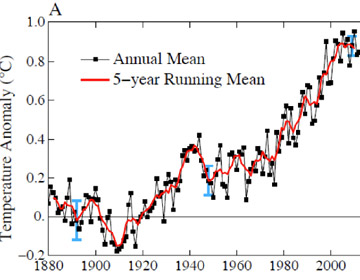 World must aim for one degrees Celsius warming, instead of two say leading scientists. Two degrees is too much: that’s the conclusion of a landmark new paper by top economists and climatologists, including James Hansen formerly of NASA. The paper, appearing in the open-access journal PLoS ONE, argues that global society must aim for only […]
World must aim for one degrees Celsius warming, instead of two say leading scientists. Two degrees is too much: that’s the conclusion of a landmark new paper by top economists and climatologists, including James Hansen formerly of NASA. The paper, appearing in the open-access journal PLoS ONE, argues that global society must aim for only […]
Coal’s future carbon costs may make it more expensive than wind energy
 At first glance, a recent report from the U.S. White House on the social cost of carbon reads like a daunting economics exam. A small chart poses the first question about the price tag policymakers attach to future greenhouse gas emissions: Does each metric ton of carbon that billows into the air cost $11, $33 […]
At first glance, a recent report from the U.S. White House on the social cost of carbon reads like a daunting economics exam. A small chart poses the first question about the price tag policymakers attach to future greenhouse gas emissions: Does each metric ton of carbon that billows into the air cost $11, $33 […]
‘Remarkable year’: could 2012 mark the beginning of a carbon emissions slowdown?
 Global carbon dioxide emissions hit another new record of 34.5 billion tons last year, according to a new report by the Netherlands Environment Assessment Agency and the European Commission’s Joint Research Centre, but there may be a silver lining. Dubbing 2012 a “remarkable year,” the report found that the rate of carbon emission’s rise slowed […]
Global carbon dioxide emissions hit another new record of 34.5 billion tons last year, according to a new report by the Netherlands Environment Assessment Agency and the European Commission’s Joint Research Centre, but there may be a silver lining. Dubbing 2012 a “remarkable year,” the report found that the rate of carbon emission’s rise slowed […]
Renewable energy revolution will require better management of metals
 If we are to avoid catastrophic climate change, scientists say global society will need a rapid and aggressive replacement of fossil fuel energy for renewable, such as solar, wind, geo-thermal, and tidal. While experts say a renewable revolution would not only mitigate climate change but also likely invigorate economies and cut life-threatening pollution, such a […]
If we are to avoid catastrophic climate change, scientists say global society will need a rapid and aggressive replacement of fossil fuel energy for renewable, such as solar, wind, geo-thermal, and tidal. While experts say a renewable revolution would not only mitigate climate change but also likely invigorate economies and cut life-threatening pollution, such a […]
Indigenous groups protest hydropower congress as controversy hits meeting in Malaysia
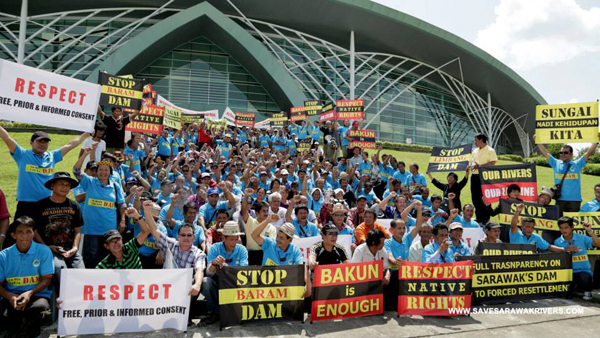 The opening of the International Hydropower Association (IHA) World Congress in the Malaysian state of Sarawak was marred today by indigenous protests and controversy after a local indigenous leader was barred from attending a pre-conference workshop. Over 300 people from local indigenous people protested the ongoing construction of around a dozen mega-dams in the state […]
The opening of the International Hydropower Association (IHA) World Congress in the Malaysian state of Sarawak was marred today by indigenous protests and controversy after a local indigenous leader was barred from attending a pre-conference workshop. Over 300 people from local indigenous people protested the ongoing construction of around a dozen mega-dams in the state […]
‘Carbon bubble’ could cause next global financial crisis
 The world could be heading for a major economic crisis as stock markets inflate an investment bubble in fossil fuels to the tune of trillions of dollars, according to leading economists. “The financial crisis has shown what happens when risks accumulate unnoticed,” said Lord (Nicholas) Stern, a professor at the London School of Economics. He […]
The world could be heading for a major economic crisis as stock markets inflate an investment bubble in fossil fuels to the tune of trillions of dollars, according to leading economists. “The financial crisis has shown what happens when risks accumulate unnoticed,” said Lord (Nicholas) Stern, a professor at the London School of Economics. He […]
Proposed coal plant threatens Critically Endangered Philippine cockatoo
 One kilometer off the Philippine island of Palawan lies the Rasa Island Wildlife Sanctuary; here forest grows unimpeded from a coral island surrounded by mangroves and coral reefs. Although tiny, over a hundred bird species have been recorded on the island along with a major population of large flying foxes, while in the waters below […]
One kilometer off the Philippine island of Palawan lies the Rasa Island Wildlife Sanctuary; here forest grows unimpeded from a coral island surrounded by mangroves and coral reefs. Although tiny, over a hundred bird species have been recorded on the island along with a major population of large flying foxes, while in the waters below […]
Solar Photovoltaic Projects: In the Mainstream Power Market – book review
 Solar Photovoltaic Projects: In the Mainstream Power Market, written by renewables energy pioneer Philip Wolfe, is an excellent introduction to the solar photovoltaic project development and power markets sector. Mr. Wolfe’s multi-decadal experience in the solar sector first founding BP Solar in the 1970s and then later working with various renewable energy finance initiatives, brings […]
Solar Photovoltaic Projects: In the Mainstream Power Market, written by renewables energy pioneer Philip Wolfe, is an excellent introduction to the solar photovoltaic project development and power markets sector. Mr. Wolfe’s multi-decadal experience in the solar sector first founding BP Solar in the 1970s and then later working with various renewable energy finance initiatives, brings […]
Featured video: moving green, local energy forward in Southeast Asia
 Rainforest in Sabah, Malaysia on the island of Borneo. Photo by: Rhett A. Butler. A new video highlights the work and drive of renewable energy proponents at the inaugural meeting of Southeast Asia Renewable Energy People’s Assembly (SEAREPA) in the Malaysian state of Sabah. Held last year, the meeting brought together 80 organizations from 12 […]
Rainforest in Sabah, Malaysia on the island of Borneo. Photo by: Rhett A. Butler. A new video highlights the work and drive of renewable energy proponents at the inaugural meeting of Southeast Asia Renewable Energy People’s Assembly (SEAREPA) in the Malaysian state of Sabah. Held last year, the meeting brought together 80 organizations from 12 […]
Looking bright: solar power passes 100 gigawatts worldwide
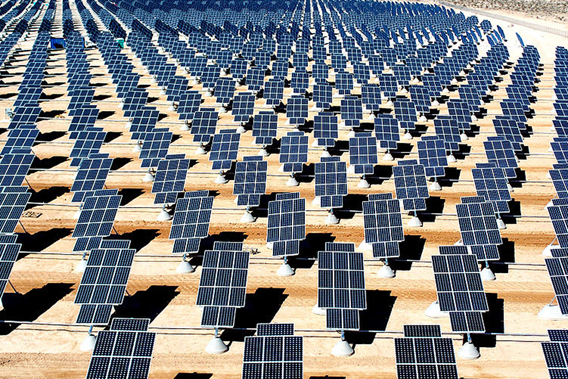 Solar power on Nellis Air Force Base in Nevada. Photo by: U.S. Air Force photo/Airman 1st Class Nadine Y. Barclay. The world’s installed solar capacity hit 101 gigawatts last year, according to new data from the European Photovoltaic Industry Association (EPIA). Last year alone, saw nearly 30 gigawatts of solar power added around the world. […]
Solar power on Nellis Air Force Base in Nevada. Photo by: U.S. Air Force photo/Airman 1st Class Nadine Y. Barclay. The world’s installed solar capacity hit 101 gigawatts last year, according to new data from the European Photovoltaic Industry Association (EPIA). Last year alone, saw nearly 30 gigawatts of solar power added around the world. […]
New wind power cheaper than coal or gas in Australia
 Electricity supplied from a new wind farm is cheaper than that from a new gas or coal-fired power plant in Australia, reports a new analysis published by Bloomberg New Energy Finance. According to the study, wind-generated electricity costs AU$80 ($83) per megawatt hour compared with compared to AU$143/MWh ($148) from a new coal plant or […]
Electricity supplied from a new wind farm is cheaper than that from a new gas or coal-fired power plant in Australia, reports a new analysis published by Bloomberg New Energy Finance. According to the study, wind-generated electricity costs AU$80 ($83) per megawatt hour compared with compared to AU$143/MWh ($148) from a new coal plant or […]
Paradigm shift needed to avert global environmental collapse, according to author of new book The Blueprint: Averting Global Collapse
 Scientists and experts are increasingly concerned that we are entering an age of ecological collapse with untold impacts for future generations. In Daniel Rirdan’s new book, The Blueprint, he outlines how to avoid this fate. Author, global strategist, and speaker Daniel Rirdan set out to create a plan addressing the future of our planet. His […]
Scientists and experts are increasingly concerned that we are entering an age of ecological collapse with untold impacts for future generations. In Daniel Rirdan’s new book, The Blueprint, he outlines how to avoid this fate. Author, global strategist, and speaker Daniel Rirdan set out to create a plan addressing the future of our planet. His […]
Google invests $200m in west Texas wind farm
 Google has made another big renewable energy investment, putting $200 million into a Texas wind farm, said the Internet search giant in a post on its official blog. The 161 megawatt project — called the Spinning Spur Wind Project — is located in Oldham County about 35 miles from Amarillo. It generates enough electricity to […]
Google has made another big renewable energy investment, putting $200 million into a Texas wind farm, said the Internet search giant in a post on its official blog. The 161 megawatt project — called the Spinning Spur Wind Project — is located in Oldham County about 35 miles from Amarillo. It generates enough electricity to […]
‘No-one is listening to the entire scientific community’: global carbon emissions set to hit new high
 Coal truck in western China. Photo by: Rhett A. Butler. Global carbon dioxide (CO2) emissions from industrial sources are set to hit a new record high this year according to a new analysis by Global Carbon Project. The analysis in Nature Climate Changes predicts that CO2 emissions will rise another 2.6 percent, hitting 35.6 billion […]
Coal truck in western China. Photo by: Rhett A. Butler. Global carbon dioxide (CO2) emissions from industrial sources are set to hit a new record high this year according to a new analysis by Global Carbon Project. The analysis in Nature Climate Changes predicts that CO2 emissions will rise another 2.6 percent, hitting 35.6 billion […]
As Doha Climate Summit kicks off, more ambitious cuts to greenhouse gas emissions needed
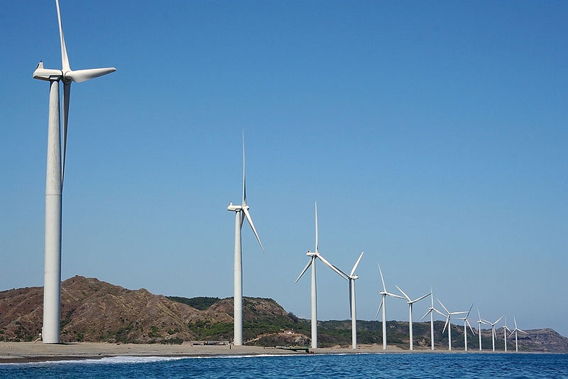 Bangui Windfarm in the Philippines. Photo by: John Ryan Cordova. As the 18th meeting of the UN Framework Convention on Climate Change (UNFCCC) kicks off this morning in oil and gas rich Qatar, the world body warns that much more ambitious greenhouse gas cuts are needed to keep catastrophic climate change at bay. A new […]
Bangui Windfarm in the Philippines. Photo by: John Ryan Cordova. As the 18th meeting of the UN Framework Convention on Climate Change (UNFCCC) kicks off this morning in oil and gas rich Qatar, the world body warns that much more ambitious greenhouse gas cuts are needed to keep catastrophic climate change at bay. A new […]
Sarawak minister tells clean energy activists to ‘stop breathing’
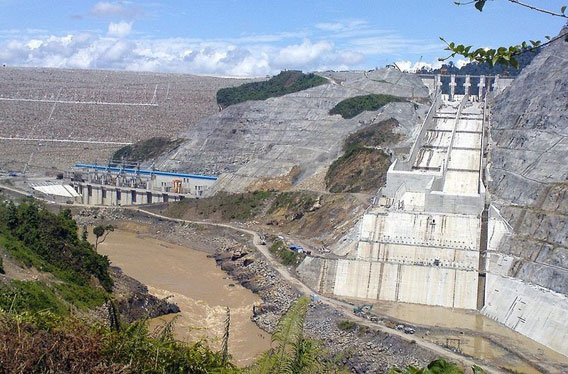 Bakun dam during construction. Photo by: Mohamad Shoox. A top minister in the Malaysian state of Sarawak has told activists campaigning for cleaner energy to ‘stop breathing’, reports The Borneo Post. “I would like to throw a challenge at them (critics) on two fronts,” Land Development Minister Tan Sri Dr James Jemut Masing told the […]
Bakun dam during construction. Photo by: Mohamad Shoox. A top minister in the Malaysian state of Sarawak has told activists campaigning for cleaner energy to ‘stop breathing’, reports The Borneo Post. “I would like to throw a challenge at them (critics) on two fronts,” Land Development Minister Tan Sri Dr James Jemut Masing told the […]
Micro-hydro and decentralized green energy goals set in Borneo
 Participants from diverse backgrounds and groups marking on a map the creation of partnerships through identified projects at the end of the Southeast Asia Renewable Energy People’s Assembly (SEAREPA) at the Rainforest Discovery Centre in Sandakan, Sabah. Photo by: Suzanne Chong/LEAP. The first ever meeting of the Southeast Asia Renewable Energy People’s Assembly (SEAREPA) ended […]
Participants from diverse backgrounds and groups marking on a map the creation of partnerships through identified projects at the end of the Southeast Asia Renewable Energy People’s Assembly (SEAREPA) at the Rainforest Discovery Centre in Sandakan, Sabah. Photo by: Suzanne Chong/LEAP. The first ever meeting of the Southeast Asia Renewable Energy People’s Assembly (SEAREPA) ended […]
After defeating coal plant, Borneo hosts renewable energy meeting
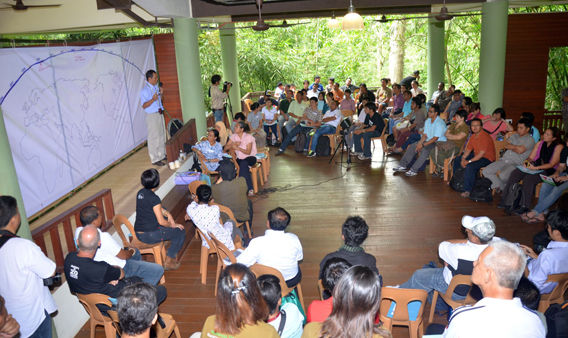 A participant sharing a story at the inaugural Southeast Asia Renewable Energy People’s Assembly (SEAREPA) at the Rainforest Discovery Centre in Sandakan, Sabah. Photo courtesy of SEAREPA. Last year, a coalition of environmentalists and locals won a David-versus-Goliath battle against a massive coal plant in the Malaysian state of Sabah on Borneo. After facing a […]
A participant sharing a story at the inaugural Southeast Asia Renewable Energy People’s Assembly (SEAREPA) at the Rainforest Discovery Centre in Sandakan, Sabah. Photo courtesy of SEAREPA. Last year, a coalition of environmentalists and locals won a David-versus-Goliath battle against a massive coal plant in the Malaysian state of Sabah on Borneo. After facing a […]
Will we need to pull carbon out of the atmosphere to save ourselves?
 The ongoing decline in Arctic sea ice hit a new record this year that rocked even the most pessimistic predictions. The low sea ice extent hit 18 percent below the previous record set in just 2007, and was only around half the size it was in 1980. Here, NASA satellites catches a glimpse of the […]
The ongoing decline in Arctic sea ice hit a new record this year that rocked even the most pessimistic predictions. The low sea ice extent hit 18 percent below the previous record set in just 2007, and was only around half the size it was in 1980. Here, NASA satellites catches a glimpse of the […]
Wind can power the world, says two new studies
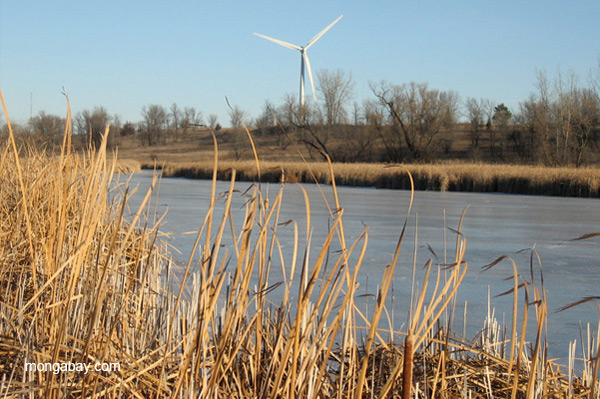 Wind turbine in Minnesota, U.S. Photo by: Tiffany Roufs. Wind power is up to the challenge of providing more-than-enough energy for global society, according to two new and unrelated studies. Both studies, one published in Nature Climate Change and the other in the Proceedings of the National Academy of Sciences (PNAS), found that wind power […]
Wind turbine in Minnesota, U.S. Photo by: Tiffany Roufs. Wind power is up to the challenge of providing more-than-enough energy for global society, according to two new and unrelated studies. Both studies, one published in Nature Climate Change and the other in the Proceedings of the National Academy of Sciences (PNAS), found that wind power […]
Tigers vs. coal in India: when big energy meets vanishing cats
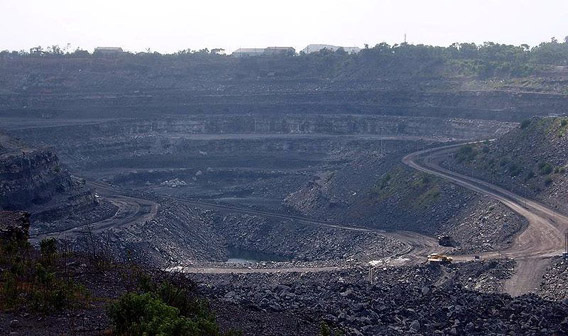 Surface coal mining in Bihar, India. Around 70-80 percent of India’s power is currently provided by coal. Burning coal fuels climate change, causes acid rain, and spreads toxic pollutants into the environment, but now a new Greenpeace report warns that coal may also imperil the world’s biggest feline: the tiger. Home to world’s largest population […]
Surface coal mining in Bihar, India. Around 70-80 percent of India’s power is currently provided by coal. Burning coal fuels climate change, causes acid rain, and spreads toxic pollutants into the environment, but now a new Greenpeace report warns that coal may also imperil the world’s biggest feline: the tiger. Home to world’s largest population […]
Soccer lights up kids’ lives: new technology produces cheap, portable power
.568.jpg) SOCCKET: the soccer ball that produces electricity. Photo courtesy of Uncharted Play. Recently, Jessica O. Matthews and Julia Silverman, both Harvard graduates, were awarded Harvard Foundation’s Scientists of the Year award for their invention of a soccer ball that converts kinetic energy to electricity. The two women, who were both social science majors, came up […]
SOCCKET: the soccer ball that produces electricity. Photo courtesy of Uncharted Play. Recently, Jessica O. Matthews and Julia Silverman, both Harvard graduates, were awarded Harvard Foundation’s Scientists of the Year award for their invention of a soccer ball that converts kinetic energy to electricity. The two women, who were both social science majors, came up […]
Scientists: if we don’t act now we’re screwed
 Aerial view of the infamous Río Huaypetue gold mine in the Peruvian Amazon. This remote but massive gold mine is known for the destruction of primary rainforest, widespread mercury pollution, and child and slave labor. Photo by: Rhett A. Butler. Scientists warn that the Earth may be reaching a planetary tipping point due to a […]
Aerial view of the infamous Río Huaypetue gold mine in the Peruvian Amazon. This remote but massive gold mine is known for the destruction of primary rainforest, widespread mercury pollution, and child and slave labor. Photo by: Rhett A. Butler. Scientists warn that the Earth may be reaching a planetary tipping point due to a […]
Another record in global carbon emissions puts globe on track for ‘devastating consequences’
 Surface coal mining in Bihar, India. Around 40 percent of India’s power is currently provided by coal, the most carbon intensive fuel source. Last year global carbon dioxide emissions rose 3.2 percent to a new record of 31.6 gigatons, keeping the planet on track to suffer dangerous climate change, which could propel global crop failures, […]
Surface coal mining in Bihar, India. Around 40 percent of India’s power is currently provided by coal, the most carbon intensive fuel source. Last year global carbon dioxide emissions rose 3.2 percent to a new record of 31.6 gigatons, keeping the planet on track to suffer dangerous climate change, which could propel global crop failures, […]
Consumption, population, and declining Earth: wake-up call for Rio+20
 Suburban sprawl in Albuquerque, New Mexico. The average American’s ecological footprint is the fifth highest in the world. Photo by: Jeremy Hance. Human society is consuming natural resources as if there were one-and-a-half Earths, and not just a single blue planet, according to the most recent Living Planet Report released today. If governments and societies […]
Suburban sprawl in Albuquerque, New Mexico. The average American’s ecological footprint is the fifth highest in the world. Photo by: Jeremy Hance. Human society is consuming natural resources as if there were one-and-a-half Earths, and not just a single blue planet, according to the most recent Living Planet Report released today. If governments and societies […]
For Earth Day, 17 celebrated scientists on how to make a better world
 Observations of planet Earth from the Moderate Resolution Imaging Spectroradiometer (MODIS) on July 11, 2005. Photo by: NASA. Seventeen top scientists and four acclaimed conservation organizations have called for radical action to create a better world for this and future generations. Compiled by 21 past winners of the prestigious Blue Planet Prize, a new paper […]
Observations of planet Earth from the Moderate Resolution Imaging Spectroradiometer (MODIS) on July 11, 2005. Photo by: NASA. Seventeen top scientists and four acclaimed conservation organizations have called for radical action to create a better world for this and future generations. Compiled by 21 past winners of the prestigious Blue Planet Prize, a new paper […]
Will mega-dams destroy the Amazon?
 150 new dams may destroy connectivity of the Amazon River to the Andes and drive deforestation. Construction of a canal for the Belo Monte Dam project, near Altamira taken by Daniel Beltrá for Greenpeace. Once completed, the Belo Monte Dam will be the third largest in the world. It will submerge up to 400,000 hectares […]
150 new dams may destroy connectivity of the Amazon River to the Andes and drive deforestation. Construction of a canal for the Belo Monte Dam project, near Altamira taken by Daniel Beltrá for Greenpeace. Once completed, the Belo Monte Dam will be the third largest in the world. It will submerge up to 400,000 hectares […]
Solar cells cross new threshold
 Imagine powering your cell phone by leaving it on the window sill. Sounds like science fiction? Actually, this might soon turn into reality. Scientists have been exploring the potential of solar energy for decades. One of the cheapest ways to turn solar energy into electricity is by creating solar cells from organic polymers, which are […]
Imagine powering your cell phone by leaving it on the window sill. Sounds like science fiction? Actually, this might soon turn into reality. Scientists have been exploring the potential of solar energy for decades. One of the cheapest ways to turn solar energy into electricity is by creating solar cells from organic polymers, which are […]
Activists form network to fight Sarawak dam-building spree
 Last October indigenous groups, local people, and domestic NGOs formed the Save Sarawak’s Rivers Network to fight the planned construction of a dozen dams in the Malaysian state on the island of Borneo. The coalition opposes the dam-building plans, known as the Sarawak Corridor of Renewable Energy (SCORE) initiative, due to its impacts on indigenous […]
Last October indigenous groups, local people, and domestic NGOs formed the Save Sarawak’s Rivers Network to fight the planned construction of a dozen dams in the Malaysian state on the island of Borneo. The coalition opposes the dam-building plans, known as the Sarawak Corridor of Renewable Energy (SCORE) initiative, due to its impacts on indigenous […]
Brazilian mining company connected to Belo Monte dam voted worst corporation
 The world’s second largest mining company, Vale, has been given the dubious honor of being voted the world’s most awful corporation in terms of human rights abuses and environmental destruction by the Public Eye Awards. Vale received over 25,000 votes online, likely prompted in part by its stake in the hugely controversial Brazilian mega-dam, Belo […]
The world’s second largest mining company, Vale, has been given the dubious honor of being voted the world’s most awful corporation in terms of human rights abuses and environmental destruction by the Public Eye Awards. Vale received over 25,000 votes online, likely prompted in part by its stake in the hugely controversial Brazilian mega-dam, Belo […]
California sets tough new clean car standards
The U.S. state that takes climate change most seriously—California—has unanimously approved new rules dubbed the Advanced Clean Cars program to lower carbon emissions, reduce oil dependence, mitigate health impacts from pollution, and save consumers money in the long-term. According to the new standards, by 2025 cars sold in California must cut greenhouse gas emissions by […]
Emissions from palm oil biodiesel highest of major biofuels, says EU
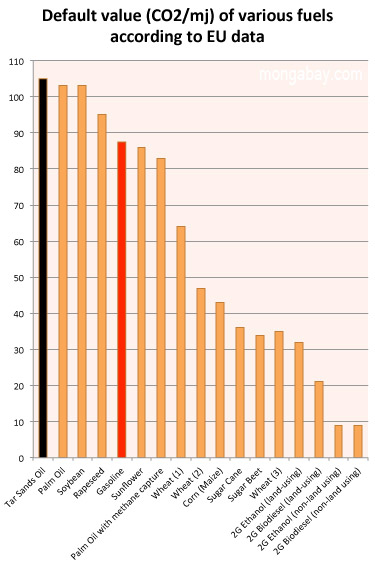 Greenhouse gas emissions from palm oil-based biodiesel are the highest among major biofuels when the effects of deforestation and peatlands degradation are considered, according to calculations by the European Commission. The emissions estimates, which haven’t been officially released, have important implications for the biofuels industry in Europe. As reported by EurActiv, the data from the […]
Greenhouse gas emissions from palm oil-based biodiesel are the highest among major biofuels when the effects of deforestation and peatlands degradation are considered, according to calculations by the European Commission. The emissions estimates, which haven’t been officially released, have important implications for the biofuels industry in Europe. As reported by EurActiv, the data from the […]
Palm oil does not meet U.S. renewable fuels standard, rules EPA
 Oil palm plantations and rainforest in Malaysia The U.S. Environmental Protection Agency (EPA) ruled on Friday that palm oil-based biofuels will not meet the renewable fuels standard due to carbon emissions associated with deforestation, reports The Hill. According to a notice published Friday in the Federal Register, palm oil-based biodiesel fails to meet a requirement […]
Oil palm plantations and rainforest in Malaysia The U.S. Environmental Protection Agency (EPA) ruled on Friday that palm oil-based biofuels will not meet the renewable fuels standard due to carbon emissions associated with deforestation, reports The Hill. According to a notice published Friday in the Federal Register, palm oil-based biodiesel fails to meet a requirement […]
Sarah Laskow: even renewable energy has a dark side
 Sarah Laskow is a freelance writer who has covered environmental issues for Grist, GOOD, and Newsweek.com, among others. Raised in New Jersey and educated at Yale where she studied literature, Sarah now lives across the river in Manhattan with her partner. She’s done extensive traveling in West Africa, Europe, and Central America. Sarah can be […]
Sarah Laskow is a freelance writer who has covered environmental issues for Grist, GOOD, and Newsweek.com, among others. Raised in New Jersey and educated at Yale where she studied literature, Sarah now lives across the river in Manhattan with her partner. She’s done extensive traveling in West Africa, Europe, and Central America. Sarah can be […]
Top 10 Environmental Stories of 2011
 Victories won by activists around the world tops our list of the big environmental stories of the year. In this photo: a young woman is placed in handcuffs and arrested for civil disobedience against the Keystone XL Pipeline in the U.S. In all, 1,252 people were arrested in the two week long action. Photo by: […]
Victories won by activists around the world tops our list of the big environmental stories of the year. In this photo: a young woman is placed in handcuffs and arrested for civil disobedience against the Keystone XL Pipeline in the U.S. In all, 1,252 people were arrested in the two week long action. Photo by: […]
Facebook pledges to go green…someday soon
After a massive campaign by Greenpeace to get everyone’s favorite social media site to quit coal energy, Facebook has announced a new energy policy and a partnership with Greenpeace. The policy includes a goal “to power all of our operations with clean and renewable energy,” however does not go so far as to state it […]
Mixed reactions to the Durban agreement
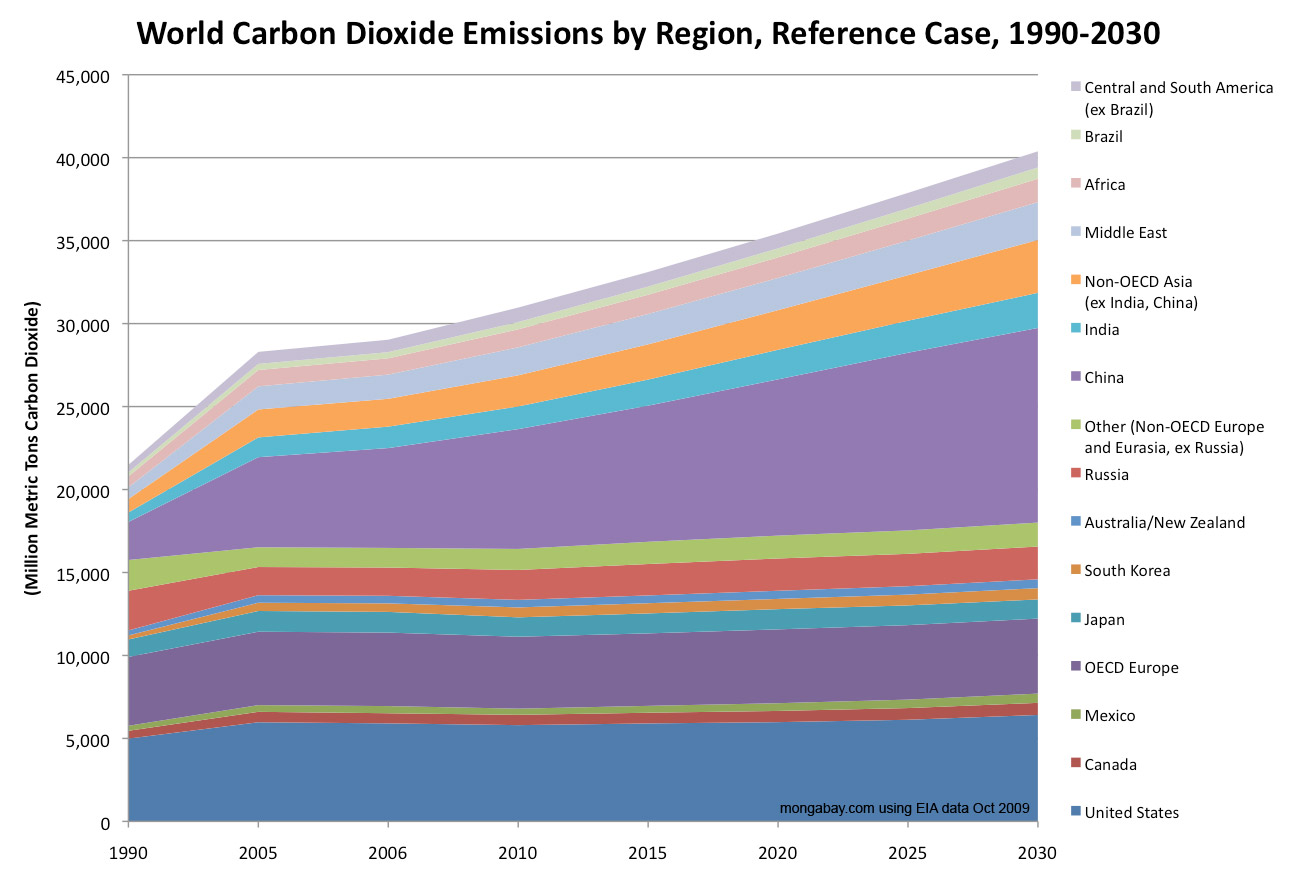 Click to enlarge. Early Sunday morning over 190 of the world’s countries signed on to a new climate agreement at the 17th UN Framework Convention on Climate Change (UNFCCC) in Durban, South Africa. The summit was supposed to end on Friday, but marathon negotiations pushed government officials to burn the midnight oil for about 36 […]
Click to enlarge. Early Sunday morning over 190 of the world’s countries signed on to a new climate agreement at the 17th UN Framework Convention on Climate Change (UNFCCC) in Durban, South Africa. The summit was supposed to end on Friday, but marathon negotiations pushed government officials to burn the midnight oil for about 36 […]
Featured video: are hydroelectric dams a solution to climate change?
A new video from NGOs International Rivers and Friends of the Earth International argues that a spree of dam building in the tropics is a false solution to the climate crisis. The video has been released to coincide with the UN’s 17th Climate Summit now beginning in Durban, South Africa. With precipitation becoming less assured […]
IEA warns: five years to slash emissions or face dangerous climate change
 Not known for alarmism and sometimes criticized for being too optimistic, the International Energy Agency (IEA) has warned that without bold action in the next five years the world will lock itself into high-emissions energy sources that will push climate change beyond the 2 degrees Celsius considered relatively ‘safe’ by many scientists and officials. “As […]
Not known for alarmism and sometimes criticized for being too optimistic, the International Energy Agency (IEA) has warned that without bold action in the next five years the world will lock itself into high-emissions energy sources that will push climate change beyond the 2 degrees Celsius considered relatively ‘safe’ by many scientists and officials. “As […]
The dam-maker: China involved in 289 dam projects worldwide
China is currently involved in 289 hydroelectric projects worldwide, as reported by International Rivers. Most of the dams are planned for hydropower, and over half are considered ‘large’ projects. The list includes completed dams, one currently under construction, and ones in early planning stages. While dams are often considered ‘green’ power, those in the tropics […]
Hydroelectric dam still a greenhouse gas source after 10 years
 Hydroelectric power is often promoted as green energy, yet dams, especially in the tropics, can be significant sources of greenhouse gas emissions. When built, reservoirs trap vegetation, which, as it rots, emits both methane and carbon into the atmosphere. A new study in Science of the Total Environment found that a dam in Lao PDR […]
Hydroelectric power is often promoted as green energy, yet dams, especially in the tropics, can be significant sources of greenhouse gas emissions. When built, reservoirs trap vegetation, which, as it rots, emits both methane and carbon into the atmosphere. A new study in Science of the Total Environment found that a dam in Lao PDR […]
Sober up: world running out of time to keep planet from over-heating
 If governments are to keep the pledge they made in Copenhagen to limit global warming within the ‘safe range’ of two degrees Celsius, they are running out of time, according to two sobering papers from Nature. One of the studies finds that if the world is to have a 66 percent chance of staying below […]
If governments are to keep the pledge they made in Copenhagen to limit global warming within the ‘safe range’ of two degrees Celsius, they are running out of time, according to two sobering papers from Nature. One of the studies finds that if the world is to have a 66 percent chance of staying below […]
Judge: work must halt on monster dam, Belo Monte
 The decades-long fight over Brazilian megadam, the Belo Monte, has taken another U-turn after a judge ordered work to stop immediately since the dam would devastate vital fishing grounds for local people. In June the Brazilian government gave a go-ahead to the $11-17 billion dam, despite large-scale opposition from indigenous groups along the Xingu River […]
The decades-long fight over Brazilian megadam, the Belo Monte, has taken another U-turn after a judge ordered work to stop immediately since the dam would devastate vital fishing grounds for local people. In June the Brazilian government gave a go-ahead to the $11-17 billion dam, despite large-scale opposition from indigenous groups along the Xingu River […]
Expanding ethanol threatens last remnants of Atlantic Forest
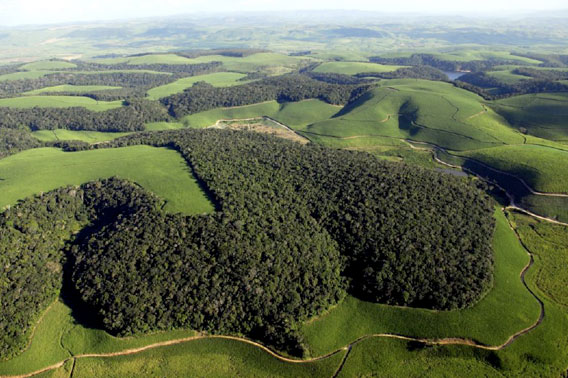 A typical scenario in the Atlantic Forest at the Northeastern Biodiversity Corridor, where forest remants are surrounded by sugarcane plantations. Most of the remaining forest fragments are, on average, smaller than 100 ha. Photo credit: Adriano Gambarini. Aggressively expanding sugarcane ethanol is putting Brazil’s nearly-vanished Atlantic Forest at risk, according to an opinion piece in […]
A typical scenario in the Atlantic Forest at the Northeastern Biodiversity Corridor, where forest remants are surrounded by sugarcane plantations. Most of the remaining forest fragments are, on average, smaller than 100 ha. Photo credit: Adriano Gambarini. Aggressively expanding sugarcane ethanol is putting Brazil’s nearly-vanished Atlantic Forest at risk, according to an opinion piece in […]
Activists worldwide push for leaving the fossil fuel age behind
 Young people rally in Kiev, Ukraine at apart of the Moving Planet campaign. Photo by: Maxm Gorpenyuk. On six continents, in over 75 percent of the world’s countries, people came out en masse yesterday to attend over 2,000 events to demonstrate the power of renewable energy to combat global climate change. As apart of the […]
Young people rally in Kiev, Ukraine at apart of the Moving Planet campaign. Photo by: Maxm Gorpenyuk. On six continents, in over 75 percent of the world’s countries, people came out en masse yesterday to attend over 2,000 events to demonstrate the power of renewable energy to combat global climate change. As apart of the […]
Germany proves the promise of renewable energy: hits 20 percent renewables
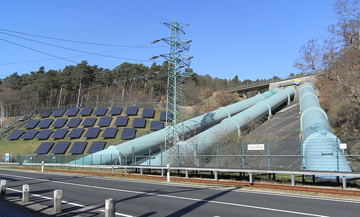 As many people in the United States question whether renewable energy is a viable alternative to fossil fuels, Germany now derives 20.8 percent of its electricity from renewable sources—a 15 percent increase since 2000, reports Der Spiegel. In contrast, the United States generates only 10 percent of its electricity from renewable sources, 6 percent of […]
As many people in the United States question whether renewable energy is a viable alternative to fossil fuels, Germany now derives 20.8 percent of its electricity from renewable sources—a 15 percent increase since 2000, reports Der Spiegel. In contrast, the United States generates only 10 percent of its electricity from renewable sources, 6 percent of […]
Nobel laureates: ‘we are transgressing planetary boundaries that have kept civilization safe for the past 10,000 years’
 Last week the 3rd Nobel Laureates Symposium on Global Sustainability concluded with participants—including 17 past Nobel Prize winners and 40 other experts—crafting and signing the Stockholm Memorandum. The document calls for emergency actions to tackle human pressures on the Earth’s environment while ensuring a more equitable and just world. “Science makes clear that we are […]
Last week the 3rd Nobel Laureates Symposium on Global Sustainability concluded with participants—including 17 past Nobel Prize winners and 40 other experts—crafting and signing the Stockholm Memorandum. The document calls for emergency actions to tackle human pressures on the Earth’s environment while ensuring a more equitable and just world. “Science makes clear that we are […]
Has the green energy revolution finally arrived?
 When historians look back at the fight to combat climate change—not to mention the struggle to overcome our global addiction to fossil fuels—will 2011 be considered a watershed moment? Maybe. In the last couple months, three countries—each in the top ten in terms of GDP—have suddenly made major renewable energy promises. Germany, Japan, and, just […]
When historians look back at the fight to combat climate change—not to mention the struggle to overcome our global addiction to fossil fuels—will 2011 be considered a watershed moment? Maybe. In the last couple months, three countries—each in the top ten in terms of GDP—have suddenly made major renewable energy promises. Germany, Japan, and, just […]
Violent protests follow approval of massive dam project in Patagonia
 The wild rivers of Patagonia may soon never be the same. Last week, Chile’s Aysén Environmental Review Commission approved the environmental assessment of a five dam proposal on two rivers. The approval, however, is marred in controversy and has set off protests in many cities, including Santiago. Critics say the series of dams will destroy […]
The wild rivers of Patagonia may soon never be the same. Last week, Chile’s Aysén Environmental Review Commission approved the environmental assessment of a five dam proposal on two rivers. The approval, however, is marred in controversy and has set off protests in many cities, including Santiago. Critics say the series of dams will destroy […]
Obama focuses on climate change in Earth Day proclamation
After a long absence of speaking directly to the issue of climate change—he did not mention it once in his State of the Union speech in January—US President Barack Obama used his Earth Day proclamation to focus on it. “The United States can be a leader in reducing the dangerous pollution that causes global warming […]
Opposition rises against Mekong dam as governments ponder decision
 Mekong river at Chiang Saen in Thailand. Photo by: Rhett A. Butler. As the governments of Laos, Thailand, Cambodia, and Vietnam ready to meet on April 19th to decide whether or not to move forward on the Xayaburi Dam, critics of Mekong River hydroelectric project have warned that the dam will devastate freshwater biodiversity and […]
Mekong river at Chiang Saen in Thailand. Photo by: Rhett A. Butler. As the governments of Laos, Thailand, Cambodia, and Vietnam ready to meet on April 19th to decide whether or not to move forward on the Xayaburi Dam, critics of Mekong River hydroelectric project have warned that the dam will devastate freshwater biodiversity and […]
Gas from ‘fracking’ not climate friendly
It appears every time a fossil fuels industry claims its energy is ‘green’ or ‘climate-friendly’, scientists discover this just isn’t so. The most recent culprit is natural gas produced by an already controversial method known as hydraulic fracturing, or fracking, which extracts the gas from shale basins. A new study in Climatic Change has found […]
World Bank proposes to limit funding to coal plants
 Following years of criticism from environmentalists and some governments the World Bank has proposed new rules regarding carbon-intensive coal plants, reports the Guardian. The new rules would allow lending for coal-fired plants only to the world’s poorest nations and would only lend after other alternatives, such as renewable energy, had been ruled out. World Bank […]
Following years of criticism from environmentalists and some governments the World Bank has proposed new rules regarding carbon-intensive coal plants, reports the Guardian. The new rules would allow lending for coal-fired plants only to the world’s poorest nations and would only lend after other alternatives, such as renewable energy, had been ruled out. World Bank […]
Bats worth billions
 US agriculture stands to lose billions in free ecosystem services from the often-feared and rarely respected humble bat. According to a recent study in Science bats in North America provide the US agricultural industry at least $3.7 billion and up to a staggering $53 billion a year by eating mounds of potentially pesky insects. Yet […]
US agriculture stands to lose billions in free ecosystem services from the often-feared and rarely respected humble bat. According to a recent study in Science bats in North America provide the US agricultural industry at least $3.7 billion and up to a staggering $53 billion a year by eating mounds of potentially pesky insects. Yet […]
Sustainability takes only cents
Real economic global results from decoupling economic growth from unsustainable natural resource management and inefficient industrial processes are the central themes of Cents and Sustainability. Implementing wealth creation strategies at the local, national, and international level is the primary economic theme, or modus operandi, of the 21st Century, as opposed to 20th Century wealth appropriation […]
Clean energy investments rise 630% in 7 years
According to a report by the US Pew Environment Group global clean energy investments, which do not include nuclear power, jumped 630% since 2004. The report detailing 2010 clean energy investments found that China remains the global leader in clean energy, while the US fell from 2nd to 3rd. This is the second year in […]
Bill Clinton takes on Brazil’s megadams, James Cameron backs tribal groups
Former US President, Bill Clinton, spoke out against Brazil’s megadams at the 2nd World Sustainability Forum, which was also attended by former California governor, Arnold Schwarzenegger, and film director, James Cameron, who has been an outspoken critic of the most famous of the controversial dams, the Belo Monte on the Xingu River. As reported by […]
New organization seeks to make biofuels sustainable, but is it possible?
Not too long ago policy-makers, scientists, and environmentalists saw biofuels as a significant tool to provide sustainable energy to the world. However, as it became clear that biofuels were not only connected to deforestation, pollution, and greenhouse gas emissions (sometimes exceeding fossil fuels), but also competed with the global food supply and water sources, biofuels […]
World’s most controversial dam, Brazil’s Belo Monte, back on
A recent injunction against controversial dam, Belo Monte, in Brazil has been overturned, allowing the first phase of construction to go ahead. The ruling by a higher court argued that not all environmental conditions must be met on the dam in order for construction to start. Issued on February 25th, the injunction against the dam […]
Indigenous leaders take fight over Amazon dams to Europe
 Three indigenous Amazonian leaders spent this week touring Europe to raise awareness about the threat that a number of proposed monster dams pose to their people and the Amazon forest. Culminating in a press conference and protests in London, the international trip hopes to build pressure to stop three current hydroelectric projects, one in Peru, […]
Three indigenous Amazonian leaders spent this week touring Europe to raise awareness about the threat that a number of proposed monster dams pose to their people and the Amazon forest. Culminating in a press conference and protests in London, the international trip hopes to build pressure to stop three current hydroelectric projects, one in Peru, […]
Photo gallery: Borneo paradise saved from beachside coal plant
 The beachside site of the now canceled coal-fired power plant in Kampung Sinakut, Lahad Datu, Sabah. Photo courtesy of Green SURF. Note: many of these photos were published in a previous post on the coal plant. Last week the Malaysian government announced it had canceled a plan to build a coal-fired plant in the state […]
The beachside site of the now canceled coal-fired power plant in Kampung Sinakut, Lahad Datu, Sabah. Photo courtesy of Green SURF. Note: many of these photos were published in a previous post on the coal plant. Last week the Malaysian government announced it had canceled a plan to build a coal-fired plant in the state […]
Coal’s true cost in the US: up to half a trillion
According to the global market coal is cheap, yet a new study in the Annals of the New York Academy of Sciences finds that the hidden costs of coal are expensive, very expensive. Estimating the hidden costs of coal, such as health and environmental impacts, the study found that burning coal costs the US up […]
Environmentalists and locals win fight against coal plant in Borneo
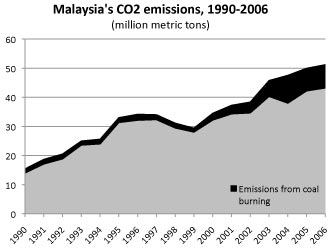 Environmentalists, scientists, and locals have won the battle against a controversial coal plant in the Malaysian state of Sabah in northern Borneo. The State and Federal government announced today that they would “pursue other alternative sources of energy, namely gas, to meet Sabah’s power supply needs.” Proposed for an undeveloped beach on the north-eastern coast […]
Environmentalists, scientists, and locals have won the battle against a controversial coal plant in the Malaysian state of Sabah in northern Borneo. The State and Federal government announced today that they would “pursue other alternative sources of energy, namely gas, to meet Sabah’s power supply needs.” Proposed for an undeveloped beach on the north-eastern coast […]
The ocean crisis: hope in troubled waters, an interview with Carl Safina
 The view from Lazy Point. Photo courtesy of Carl Safina. Being compared—by more than one reviewer—to Henry Thoreau and Rachel Carson would make any nature writer’s day. But add in effusive reviews that compare one to a jazz musician, Ernest Hemingway, and Charles Darwin, and you have a sense of the praise heaped on Carl […]
The view from Lazy Point. Photo courtesy of Carl Safina. Being compared—by more than one reviewer—to Henry Thoreau and Rachel Carson would make any nature writer’s day. But add in effusive reviews that compare one to a jazz musician, Ernest Hemingway, and Charles Darwin, and you have a sense of the praise heaped on Carl […]
Is Obama’s clean energy revolution possible?
 Recent studies point to the feasibility of a global clean energy revolution. Last night US President Barack Obama called for a massive green energy make-over of the world’s largest economy. Describing the challenge as ‘this generation’s Sputnik moment’ the US president set a goal of producing 80 percent of America’s energy by clean sources by […]
Recent studies point to the feasibility of a global clean energy revolution. Last night US President Barack Obama called for a massive green energy make-over of the world’s largest economy. Describing the challenge as ‘this generation’s Sputnik moment’ the US president set a goal of producing 80 percent of America’s energy by clean sources by […]
Prairie grass-based biofuels could meet half current fuel demand without affecting forests, food
Biofuels could meet up to half the world’s current fuel consumption without affecting food production or forests, argues a study published last month in the journal Environmental Science and Technology. Analyzing the extent of marginal grasslands, including abandoned and degraded grassland, using data on soil, topography, climate and current land use, Ximing Cai of the […]
Indonesia to open protected forests to geothermal power
The Indonesian government will soon issue a decree allowing geothermal mining in protected forests, reports The Jakarta Post. Mining of any kind is currently prohibited in protected forest areas, but because the government says geothermal mining is “environmentally friendly” it would be allowed. Geothermal would enable Indonesia to reduce its dependence on oil, reserves of […]
New Zealand: Can you sink a rainbow?
 25 years on from Greenpeace’s joint stand with New Zealand’s government against potentially environmentally devastating practices, the country is at a Crossroads The Rainbow Warrior after the bombing by French commandos. Image courtesy of Greenpeace In light of the subject of this article, condolences go out to the families of the 29 miners who died […]
25 years on from Greenpeace’s joint stand with New Zealand’s government against potentially environmentally devastating practices, the country is at a Crossroads The Rainbow Warrior after the bombing by French commandos. Image courtesy of Greenpeace In light of the subject of this article, condolences go out to the families of the 29 miners who died […]
U.S. Department of Energy makes $1.5B loan to massive solar plant
 The U.S. Department of Energy has finalized a guarantee to provide a loan of $1.45 billion to Abengoa Solar Inc. which will fund the world’s largest parabolic trough concentrating solar plant. The plant is expected to serve 70,000 households and avoid 475,000 tons of carbon dioxide emissions per year. The plant, called Solana, will be […]
The U.S. Department of Energy has finalized a guarantee to provide a loan of $1.45 billion to Abengoa Solar Inc. which will fund the world’s largest parabolic trough concentrating solar plant. The plant is expected to serve 70,000 households and avoid 475,000 tons of carbon dioxide emissions per year. The plant, called Solana, will be […]
Formal petition filed against Belo Monte dam
The struggle against Brazil’s Belo Monte dam on the Xingu River continues as today indigenous groups sent a formal petition to the Inter-American Commission on Human Rights (IACHR) to suspend the dam’s construction, stating the dam violates human rights. The dam, which has been contentious in Brazil for decades, would flood 500 square miles of […]
US elects barrage of climate change deniers, threatening support for green energy
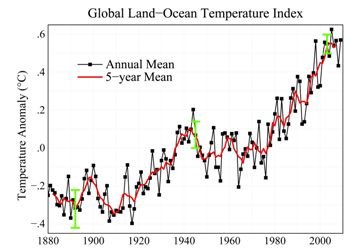 The US midterm election, which won Republicans the House but safeguarded the Senate for Democrats, has brought in a number of self-proclaimed climate change deniers, ending any likelihood that an energy bill will be passed over the next two years and essentially stumbling the White House’s strategy on climate change. Newly elected Republican Senators Rand […]
The US midterm election, which won Republicans the House but safeguarded the Senate for Democrats, has brought in a number of self-proclaimed climate change deniers, ending any likelihood that an energy bill will be passed over the next two years and essentially stumbling the White House’s strategy on climate change. Newly elected Republican Senators Rand […]
Majority of Americans confused on climate change basics
 Most Americans don’t understand the basics of climate change, according to a new poll by researchers with Yale. The poll found that over half of Americans deserve an ‘F’ on basic understanding of climate science and climate change, while only 1% would receive an ‘A’. While 63% of Americans say that the globe is warming, […]
Most Americans don’t understand the basics of climate change, according to a new poll by researchers with Yale. The poll found that over half of Americans deserve an ‘F’ on basic understanding of climate science and climate change, while only 1% would receive an ‘A’. While 63% of Americans say that the globe is warming, […]
Humanity consuming the Earth: by 2030 we’ll need two planets
 Too many people consuming too much is depleting the world’s natural resources faster than they are replenished, imperiling not only the world’s species but risking the well-being of human societies, according to a new massive study by the World Wildlife Fund (WWF), entitled the Living Planet Report. The report finds that humanity is currently consuming […]
Too many people consuming too much is depleting the world’s natural resources faster than they are replenished, imperiling not only the world’s species but risking the well-being of human societies, according to a new massive study by the World Wildlife Fund (WWF), entitled the Living Planet Report. The report finds that humanity is currently consuming […]
New Google wind project moves clean energy forward in US
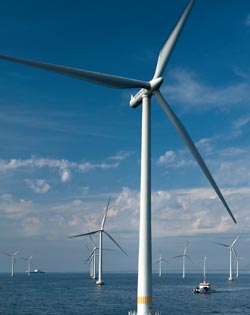 While the US has fallen far behind China and Europe in clean energy power, an announcement by Google today brings hope to green energy backers. Google is putting its considerable name and a lot of cash behind a $5 billion energy transmission line that would link up proposed wind turbines off the US’s East Coast […]
While the US has fallen far behind China and Europe in clean energy power, an announcement by Google today brings hope to green energy backers. Google is putting its considerable name and a lot of cash behind a $5 billion energy transmission line that would link up proposed wind turbines off the US’s East Coast […]
Farms in the sky, an interview with Dickson Despommier
 To solve today’s environmental crises—climate change, deforestation, mass extinction, and marine degradation—while feeding a growing population (on its way to 9 billion) will require not only thinking outside the box, but a “new box altogether” according to Dr. Dickson Despommier, author of the new book, The Vertical Farm. Exciting policy-makers and environmentalists, Despommier’s bold idea […]
To solve today’s environmental crises—climate change, deforestation, mass extinction, and marine degradation—while feeding a growing population (on its way to 9 billion) will require not only thinking outside the box, but a “new box altogether” according to Dr. Dickson Despommier, author of the new book, The Vertical Farm. Exciting policy-makers and environmentalists, Despommier’s bold idea […]
Do wind farms drive local warming?
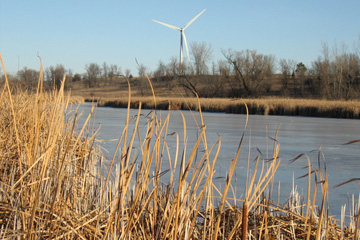 Using decades-old data researchers have proven a long-suspected effect of wind turbines: under certain conditions large-scale wind farms can change local weather. Temperatures recorded from a wind farm in San Gorgonio, California in 1989 shows that turbines cooled local temperatures during the day, but warmed them at night. However, researchers in the paper published in […]
Using decades-old data researchers have proven a long-suspected effect of wind turbines: under certain conditions large-scale wind farms can change local weather. Temperatures recorded from a wind farm in San Gorgonio, California in 1989 shows that turbines cooled local temperatures during the day, but warmed them at night. However, researchers in the paper published in […]
Environmental destruction undercuts global economy to the tune of $6.6 trillion
 The cost of environmental damage to the global economy hit 6.6 trillion US dollars—11 percent of the global GDP—in 2008, according to a new study by the Principles for Responsible (PRI) and UNEP Finance Initiative. If business continues as usual, the study predicts that environmental damage will cost 28 trillion dollars by 2050. The new […]
The cost of environmental damage to the global economy hit 6.6 trillion US dollars—11 percent of the global GDP—in 2008, according to a new study by the Principles for Responsible (PRI) and UNEP Finance Initiative. If business continues as usual, the study predicts that environmental damage will cost 28 trillion dollars by 2050. The new […]
Dapatkah Biochar Selamatkan Dunia?
 Sebuah wawancara dengan Laurens Rademakers dari Biochar Fund. Biochar – penggunaan arang yang diproduksi dari membakar biomassa untuk pertanian – mungkin merupakan saru dari revolusi lingkungan dan sosial yang terpenting di abad ini. Praktek yang sepertinya sederhana ini – sebuah teknologi yang kembali ke ribuan tahun yang lalu – memiliki potensi untuk membantu mengurangi sebagian […]
Sebuah wawancara dengan Laurens Rademakers dari Biochar Fund. Biochar – penggunaan arang yang diproduksi dari membakar biomassa untuk pertanian – mungkin merupakan saru dari revolusi lingkungan dan sosial yang terpenting di abad ini. Praktek yang sepertinya sederhana ini – sebuah teknologi yang kembali ke ribuan tahun yang lalu – memiliki potensi untuk membantu mengurangi sebagian […]
EU’s biofuels target driving land grabs in Africa, says group
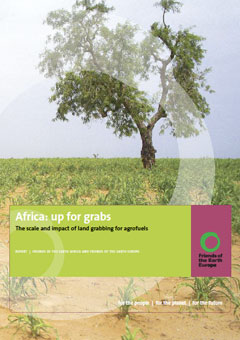 The European Union’s renewable fuels target is driving land grabs in Africa that threaten the environment and local communities, claims a new report from Friends of the Earth (FOE). Africa: up for grabs – The scale and impact of land grabbing for agrofuels [PDF] reviews a series of land deals signed across more than a […]
The European Union’s renewable fuels target is driving land grabs in Africa that threaten the environment and local communities, claims a new report from Friends of the Earth (FOE). Africa: up for grabs – The scale and impact of land grabbing for agrofuels [PDF] reviews a series of land deals signed across more than a […]
146 dams threaten Amazon basin
Although developers and government often tout dams as environmentally-friendly energy sources, this is not always the case. Dams impact river flows, changing ecosystems indefinitely; they may flood large areas forcing people and wildlife to move; and in the tropics they can also become massive source of greenhouse gases due to emissions of methane. Despite these […]
Could biochar save the world?
 An interview with Laurens Rademakers of Biochar Fund. Biochar—the agricultural application of charcoal produced from burning biomass—may be one of this century’s most important social and environmental revolutions. This seemingly humble practice—a technology that goes back thousands of years—has the potential to help mitigate a number of entrenched global problems: desperate hunger, lack of soil […]
An interview with Laurens Rademakers of Biochar Fund. Biochar—the agricultural application of charcoal produced from burning biomass—may be one of this century’s most important social and environmental revolutions. This seemingly humble practice—a technology that goes back thousands of years—has the potential to help mitigate a number of entrenched global problems: desperate hunger, lack of soil […]
Visiting the Gulf: how wildlife and people are faring in America’s worst environmental disaster, an interview with Jennifer Jacquet
 “President Obama called it ‘the worst environmental disaster America has ever faced.’ So I thought I should face it and head to the Gulf”—these are the opening words on the popular blog Guilty Planet as the author, marine biologist Jennifer Jacquet, embarked on a ten day trip to Louisiana. As a scientist, Jacquet was, of […]
“President Obama called it ‘the worst environmental disaster America has ever faced.’ So I thought I should face it and head to the Gulf”—these are the opening words on the popular blog Guilty Planet as the author, marine biologist Jennifer Jacquet, embarked on a ten day trip to Louisiana. As a scientist, Jacquet was, of […]
UE amanatkan standar lingkungan biofuel untuk lindungi hutan dan lahan basah
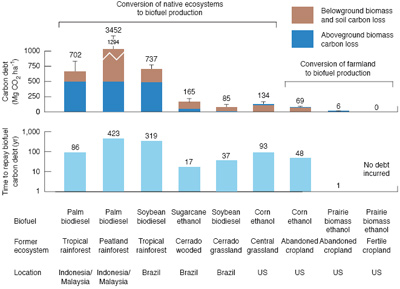 UE kini bergerak untuk membuat standar lingkungan untuk biofuel yang digunakan di Eropa, mensyaratkan biofuel untuk memberikan “pengurangan substansial” pada emisi gas rumah kaca dan tidak menghasilkan perubahan fungsi hutan atau lahan basah, menurut pernyataan dari Komisi Eropa. Rencana ini meminta industri, pemerintah, dan LSM untuk menyiapkan “skema sukarela” yang memberikan sertifikasi bahwa biofuel yang […]
UE kini bergerak untuk membuat standar lingkungan untuk biofuel yang digunakan di Eropa, mensyaratkan biofuel untuk memberikan “pengurangan substansial” pada emisi gas rumah kaca dan tidak menghasilkan perubahan fungsi hutan atau lahan basah, menurut pernyataan dari Komisi Eropa. Rencana ini meminta industri, pemerintah, dan LSM untuk menyiapkan “skema sukarela” yang memberikan sertifikasi bahwa biofuel yang […]
Fishermen express doubts about coal plant overlooking their fishing grounds
 Local fishermen in the Malaysian state of Sabah are uncertain of their future, if the government pushes ahead to build a 300 megawatt coal power plant. They have been told they will be moved from their current seaside village to one deeper inland, and while the coal plant will provide manual labor work in its […]
Local fishermen in the Malaysian state of Sabah are uncertain of their future, if the government pushes ahead to build a 300 megawatt coal power plant. They have been told they will be moved from their current seaside village to one deeper inland, and while the coal plant will provide manual labor work in its […]
Foto-foto tunjukkan daerah mirip-surga untuk lokasi pembangkit listrik batu bara di Borneo
 Dengan seluruh perhatian dunia sedang mengarah pada bencana lingkungan di Teluk Meksiko, banyak yang mulai merenungkan kebenaran dari tidak hanya Amerika, tapi ketergantungan dunia akan bahan bakar fossil. Meski begitu proyek-proyek pengadaan energi berbahan bakar fosil skala besar terus berjalan maju, termasuk di kota Sabah, Malaysia di Borneo yang akan membangun 300 MW pembangkit listrik […]
Dengan seluruh perhatian dunia sedang mengarah pada bencana lingkungan di Teluk Meksiko, banyak yang mulai merenungkan kebenaran dari tidak hanya Amerika, tapi ketergantungan dunia akan bahan bakar fossil. Meski begitu proyek-proyek pengadaan energi berbahan bakar fosil skala besar terus berjalan maju, termasuk di kota Sabah, Malaysia di Borneo yang akan membangun 300 MW pembangkit listrik […]
EU mandates biofuel environmental standards to protect forests, wetlands
 The E.U. today moved to establish environmental standards for biofuels used in Europe, requiring biofuels to deliver “substantial reductions” in greenhouse gas emissions and not result in conversion of forests or wetlands, according to a statement from the European Commission. The plan calls for industry, governments and NGOs to set up “voluntary schemes” which certify […]
The E.U. today moved to establish environmental standards for biofuels used in Europe, requiring biofuels to deliver “substantial reductions” in greenhouse gas emissions and not result in conversion of forests or wetlands, according to a statement from the European Commission. The plan calls for industry, governments and NGOs to set up “voluntary schemes” which certify […]
Bill Gates: larang batu bara dan berinvestasi di teknologi energi bersih
Planet membutuhkan “keajaiban energi” untuk mengatasi tantangan ganda dari memenuhi permintaan energi dan mengatasi perubahan iklim, ujar penemu Microsoft Bill Gates dalam pidato Jumat di Konferensi TED di Long Beach, California. “Yang akan harus kita lakukan dalam skala global adalah menciptakan sistem baru,” ungkap Gates. “Sehingga kita membutuhkan keajaiban energi.” Hanya beberapa minggu setelah yayasannya […]
Left Must Fine Tune Its Position on Cuba Embargo in Light of Oil Spill
 With no end in sight to the environmental catastrophe in the Gulf of Mexico, some may wonder whether BP’s spill could become truly international in scope. That, at least, is the fear in Cuba where people are worried that strong currents could carry the slick to pristine white beaches along the island’s northern coast. In […]
With no end in sight to the environmental catastrophe in the Gulf of Mexico, some may wonder whether BP’s spill could become truly international in scope. That, at least, is the fear in Cuba where people are worried that strong currents could carry the slick to pristine white beaches along the island’s northern coast. In […]
Photos reveal paradise-like site for coal plant in Borneo
 With the world’s eyes on the environmental catastrophe in the Gulf of Mexico, many are beginning to ponder the rightness of not just America’s, but the world’s dependence on fossil fuels. Yet large-scale fossil-fuel energy projects continue to march ahead, including one in the Malaysian state of Sabah on Borneo to build a 300 MW […]
With the world’s eyes on the environmental catastrophe in the Gulf of Mexico, many are beginning to ponder the rightness of not just America’s, but the world’s dependence on fossil fuels. Yet large-scale fossil-fuel energy projects continue to march ahead, including one in the Malaysian state of Sabah on Borneo to build a 300 MW […]
Who’s to blame for the oil spill?
 Why we get the oil spill we deserve. America, we deserve the oil spill now threatening the beautiful coast of Louisiana. This disaster is not natural, like the earthquake that devastated Haiti or tsunami that swept Southeast Asia in 2006; this disaster is man-made, American-made in fact, pure and simple. So, while in the upcoming […]
Why we get the oil spill we deserve. America, we deserve the oil spill now threatening the beautiful coast of Louisiana. This disaster is not natural, like the earthquake that devastated Haiti or tsunami that swept Southeast Asia in 2006; this disaster is man-made, American-made in fact, pure and simple. So, while in the upcoming […]
US emissions from coal could be stopped in 20 years
A new study in Environmental Science and Technology (ES&T) concludes that the US could stop all emissions from coal-fired plants within 20 years time using only existing technologies and some that will be ready within the next decade. Such an accomplishment would go a long way toward lowering the US’s carbon emissions and mitigating the […]
U.S. approves first offshore wind farm
 The Obama Administration has approved the nation’s first offshore wind farm after more than eight years of legal challenges, reports the Associated Press. Speaking Wednesday in Boston, U.S. Interior Secretary Ken Salazar said the $2 billion Cape Wind project marks “a new direction in our nation’s energy future.” The 130-turbine, 420-megawatt wind farm will generate […]
The Obama Administration has approved the nation’s first offshore wind farm after more than eight years of legal challenges, reports the Associated Press. Speaking Wednesday in Boston, U.S. Interior Secretary Ken Salazar said the $2 billion Cape Wind project marks “a new direction in our nation’s energy future.” The 130-turbine, 420-megawatt wind farm will generate […]
Half a trillion spent on fossil fuel subsidies mostly “a complete waste of money”
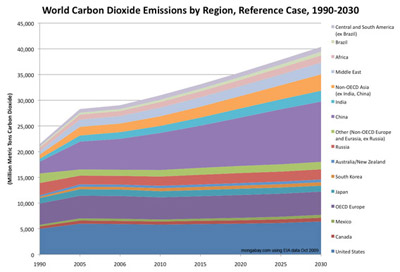 Despite a warming planet linked to the burning of fossil fuels, governments around the world still spend 500 billion US dollars a year subsidizing fossil fuel industries. A new study from the Global Subsidies Initiative (GSI) of the International Institute for Sustainable Development looks at the difficult political situation behind ending fossil fuel subsidies. “Fossil […]
Despite a warming planet linked to the burning of fossil fuels, governments around the world still spend 500 billion US dollars a year subsidizing fossil fuel industries. A new study from the Global Subsidies Initiative (GSI) of the International Institute for Sustainable Development looks at the difficult political situation behind ending fossil fuel subsidies. “Fossil […]
World failing on every environmental issue: an op-ed for Earth Day
 The biodiversity crisis, the climate crisis, the deforestation crisis: we are living in an age when environmental issues have moved from regional problems to global ones. A generation or two before ours and one might speak of saving the beauty of Northern California; conserving a single species—say the white rhino—from extinction; or preserving an ecological […]
The biodiversity crisis, the climate crisis, the deforestation crisis: we are living in an age when environmental issues have moved from regional problems to global ones. A generation or two before ours and one might speak of saving the beauty of Northern California; conserving a single species—say the white rhino—from extinction; or preserving an ecological […]
What happened to China?: the nation’s environmental woes and its future
 China has long been an example of what not to do to achieve environmentally sustainability. Ranking 133rd out of 146 countries in 2005 for environmental performance, China faces major environmental problems including severe air and water pollution, deforestation, water-issues, desertification, extinction, and overpopulation. A new article in Science discusses the complex issues that have led […]
China has long been an example of what not to do to achieve environmentally sustainability. Ranking 133rd out of 146 countries in 2005 for environmental performance, China faces major environmental problems including severe air and water pollution, deforestation, water-issues, desertification, extinction, and overpopulation. A new article in Science discusses the complex issues that have led […]
James Cameron, in real life, fights to save indigenous groups from massive dam construction in Brazil
After creating a hugely successful science-fiction film about a mega-corporation destroying the indigenous culture of another planet, James Cameron has become a surprisingly noteworthy voice on environmental issues, especially those dealing with the very non-fantastical situation of indigenous cultures fighting exploitation. This week Cameron traveled to Brazil for a three-day visit to the Big Bend […]
Analysis shows Borneo can say ‘no’ to coal power
 Plans for a coal power plant in the Malaysian state of Sabah in northern Borneo have run into stiff opposition. Environmentalists say the coal plant could damage extensive coral reef systems, pollute water supplies, open rainforests to mining, and contribute to global climate change, undercutting Sabah’s image as a ‘green’ destination. The federal government contends […]
Plans for a coal power plant in the Malaysian state of Sabah in northern Borneo have run into stiff opposition. Environmentalists say the coal plant could damage extensive coral reef systems, pollute water supplies, open rainforests to mining, and contribute to global climate change, undercutting Sabah’s image as a ‘green’ destination. The federal government contends […]
Consumers fail at identifying green companies
 An article today in New Scientist shows that American consumers have a difficult time correctly identifying green companies, often confusing ‘greenwashing’ for true green credentials or not bestowing enough credit where credit is truly due. By combining data from Earthsense, which polled 30,000 Americans about on their views of ‘green’ companies, and Trucost which assesses […]
An article today in New Scientist shows that American consumers have a difficult time correctly identifying green companies, often confusing ‘greenwashing’ for true green credentials or not bestowing enough credit where credit is truly due. By combining data from Earthsense, which polled 30,000 Americans about on their views of ‘green’ companies, and Trucost which assesses […]
Bill Gates: ban coal and invest in clean energy technology
The planet needs “energy miracles” to overcome the dual challenges of meeting energy demand and addressing climate change, said Microsoft founder Bill Gates during a speech Friday at the TED Conference in Long Beach, California. “What we’re going to have to do at a global scale is create a new system,” Gates said. “So we […]
Amazon rainforest will bear cost of biofuel policies in Brazil
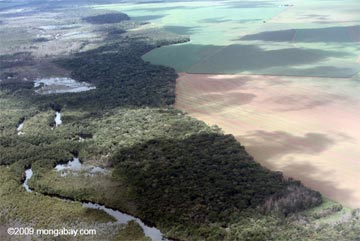 Business-as-usual agricultural expansion to meet biofuel production targets for 2020 will take a heavy toll on Brazil’s Amazon rainforest in coming years, undermining the potential emissions savings of transitioning from fossil fuels to biofuels, warns a new paper published in the Proceedings of the National Academy of Sciences (PNAS). The research suggests that intensification of […]
Business-as-usual agricultural expansion to meet biofuel production targets for 2020 will take a heavy toll on Brazil’s Amazon rainforest in coming years, undermining the potential emissions savings of transitioning from fossil fuels to biofuels, warns a new paper published in the Proceedings of the National Academy of Sciences (PNAS). The research suggests that intensification of […]
Could special bonds fund the green revolution and stabilize the climate?
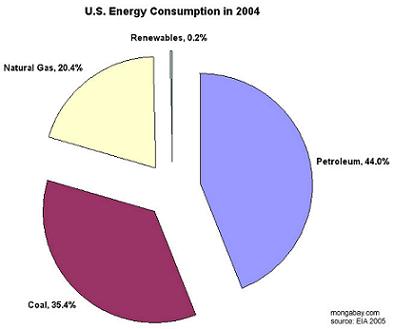 There is no question that governments around the world are moving slowly and sluggishly to combat climate change, especially when placed against the measures recommended by climate scientists. Only a handful of nations have actually cut overall greenhouse gas emissions, and the past couple decades have seen emissions rise rapidly worldwide as nations like India […]
There is no question that governments around the world are moving slowly and sluggishly to combat climate change, especially when placed against the measures recommended by climate scientists. Only a handful of nations have actually cut overall greenhouse gas emissions, and the past couple decades have seen emissions rise rapidly worldwide as nations like India […]
China leaves US (and Europe) in the dust on renewable energy
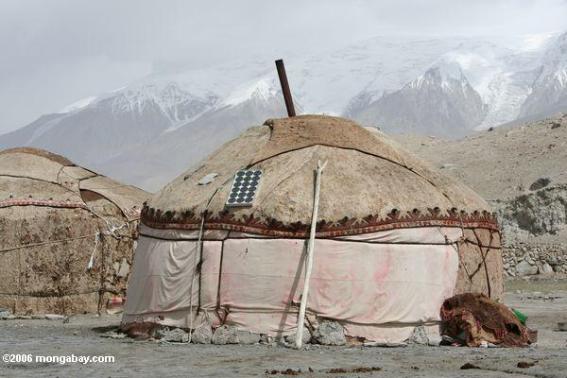 This year China has become the world’s largest manufacturer of solar panels and wind turbines, doubling its wind capacity since 2005. The economically booming nation—and the world’s most populous—has also invested heavily in nuclear power and the world’s most efficient coal plants, according to the New York Times. Still, even with massive investments in green […]
This year China has become the world’s largest manufacturer of solar panels and wind turbines, doubling its wind capacity since 2005. The economically booming nation—and the world’s most populous—has also invested heavily in nuclear power and the world’s most efficient coal plants, according to the New York Times. Still, even with massive investments in green […]
UK failing to meet biofuel sustainability standard
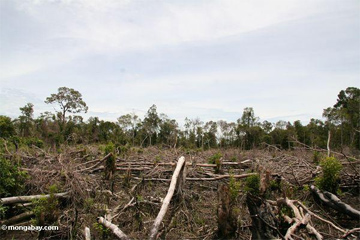 Only 4 percent of biofuel imported for use in the UK — and 20 percent of biofuel used overall — meets the environmental sustainability standard set by the Renewable Transport Fuel Obligation (RFTO), reports a new assessment from the Renewable Fuels Agency. The report found Britain exceeded its overall biofuel target of 2.5 percent of […]
Only 4 percent of biofuel imported for use in the UK — and 20 percent of biofuel used overall — meets the environmental sustainability standard set by the Renewable Transport Fuel Obligation (RFTO), reports a new assessment from the Renewable Fuels Agency. The report found Britain exceeded its overall biofuel target of 2.5 percent of […]
Iceland leads world on environmental issues, but China, US, and Canada plummet
 Evaluating 163 nations on their environmental performance, the Environmental Performance Index (EPI) has named Iceland the most environmental nation. Released every two years, the EPI also found that the world’s two largest super-powers—China and the US—have both fallen behind on confronting environmental challenges. Despite being at the top of the list, Iceland continues to face […]
Evaluating 163 nations on their environmental performance, the Environmental Performance Index (EPI) has named Iceland the most environmental nation. Released every two years, the EPI also found that the world’s two largest super-powers—China and the US—have both fallen behind on confronting environmental challenges. Despite being at the top of the list, Iceland continues to face […]
Could space technology save our planet?
A new book, Paradise Regained: the Regreening of Earth argues that the solutions to the world’s current environmental crises—including climate change—could be lying far beyond our planet. “As a scientist and an advocate for space development, I believe that those that are in the environmental movement and space advocates should be working together to help […]
United States to speed up green technology patents
 Green technology patents will see a year shaved off the average forty month wait time to approve new patents in the US. The US Patent and Trademark Office (USPTO) is implementing a one-year pilot program to push green technology patent applications through the process more quickly, so that the technologies can reach the market faster. […]
Green technology patents will see a year shaved off the average forty month wait time to approve new patents in the US. The US Patent and Trademark Office (USPTO) is implementing a one-year pilot program to push green technology patent applications through the process more quickly, so that the technologies can reach the market faster. […]
US provides 3 billion in subsidies for Exxon-mobil project in Papua New Guinea
While officials from around their world are working night-and-day to come up with an international agreement to combat climate change in Copenhagen, the US Export-Import Bank confirmed it will subsidize a natural gas project in Papua New Guinea to the tune of 3 billion dollars—a record for the bank. Critics say the project will clear […]
Blackout in Brazil: Hydropower and Our Climate Conundrum
 Would a climate change tribunal offer justice to those affected by global warming? It’s everyone’s worst nightmare: being caught in an underground subway in the midst of a power outage. Yet, that is exactly what happened recently when Brazilian commuters in the city of São Paulo were trapped inside trains and literally had to be […]
Would a climate change tribunal offer justice to those affected by global warming? It’s everyone’s worst nightmare: being caught in an underground subway in the midst of a power outage. Yet, that is exactly what happened recently when Brazilian commuters in the city of São Paulo were trapped inside trains and literally had to be […]
New rating systems seeks to promote sustainable landscapes from shopping malls to city parks
 The Sustainable Sites Initiative has developed the United States’ first rating system for the design, construction, and on-going maintenance of a wide-variety of landscapes, both with and without buildings, including shopping malls, subdivisions, university campuses, corporate buildings, transportation centers, parks and other recreation areas, and single-family homes. “While carbon-neutral performance remains the holy grail for […]
The Sustainable Sites Initiative has developed the United States’ first rating system for the design, construction, and on-going maintenance of a wide-variety of landscapes, both with and without buildings, including shopping malls, subdivisions, university campuses, corporate buildings, transportation centers, parks and other recreation areas, and single-family homes. “While carbon-neutral performance remains the holy grail for […]
US subsidies of oil and coal more than double the subsidies of renewable energy
 During the fiscal years of 2002-2008 the United States handed out subsidies to fossil fuel industries to a tune of 72 billion dollars, while renewable energy subsidies, during the same period, reached 29 billion dollars. Conducted by the Environmental Law Institute (ELI) in partnership with the Woodrow Wilson International Center for Scholars, the research shows […]
During the fiscal years of 2002-2008 the United States handed out subsidies to fossil fuel industries to a tune of 72 billion dollars, while renewable energy subsidies, during the same period, reached 29 billion dollars. Conducted by the Environmental Law Institute (ELI) in partnership with the Woodrow Wilson International Center for Scholars, the research shows […]
Power, profit, and pollution: dams and the uncertain future of Sarawak

Maldives president tells world: ‘please, don’t be stupid’ on climate change
 Maldives announces it will be carbon neutral in ten years
Maldives announces it will be carbon neutral in ten years
Solar powered conservation

Environmental disappointments under Obama

Little hydroelectric dams become all the rage, but do they harm the environment?
Biofuel company eyes dead zone in the Gulf of Mexico for creating fish-powered fuel
‘Dead zones’ in the ocean are called such for a reason. Every year agricultural run-off, especially fertilizer, floods the oceans with an abundance of nutrients leading to algae blooms, i.e. massive explosions of phytoplankton. The demise of these blooms, and the rise of bacteria feeding on them, eventually starves the entire area of oxygen creating […]
Will hydrocarbon biofuels replace gasoline and ethanol?
 In a Perspectives piece in Science, John R. Regalbuto argues that the world will soon see a revolution in biofuels, but not those made from corn. Instead Regalbuto, program director of Catalysis and Biocatalysis at the National Science Foundation, says that the future of biofuels is in substances that can be converted into liquid hydrocarbons, […]
In a Perspectives piece in Science, John R. Regalbuto argues that the world will soon see a revolution in biofuels, but not those made from corn. Instead Regalbuto, program director of Catalysis and Biocatalysis at the National Science Foundation, says that the future of biofuels is in substances that can be converted into liquid hydrocarbons, […]
New Yangtze River dam could doom more endangered species
 Eight Chinese environmentalists and scientists have composed a letter warning that a new dam under consideration for the Yangtze River could lead to the extinction of several endangered species. The letter contends that Xiaonanhia Dam, which would be 30 kilometers upstream from the city of Chongqing, will negatively impact the river’s only fish reserve. Spanning […]
Eight Chinese environmentalists and scientists have composed a letter warning that a new dam under consideration for the Yangtze River could lead to the extinction of several endangered species. The letter contends that Xiaonanhia Dam, which would be 30 kilometers upstream from the city of Chongqing, will negatively impact the river’s only fish reserve. Spanning […]
High-flying kites could power New York
 A fleet of kites could harvest enough energy from high-altitude winds to power New York, report researchers from the Carnegie Institution and California State University. Using 28 years of data from the National Center for Environmental Prediction and the Department of Energy, Ken Caldeira of the Carnegie Institution’s Department of Global Ecology and Cristina Archer […]
A fleet of kites could harvest enough energy from high-altitude winds to power New York, report researchers from the Carnegie Institution and California State University. Using 28 years of data from the National Center for Environmental Prediction and the Department of Energy, Ken Caldeira of the Carnegie Institution’s Department of Global Ecology and Cristina Archer […]
Bill Clinton speaks out for rainforests in Brazil
Former US president Bill Clinton spoke out against rainforest destruction on Monday in Brazil. Headlining the Ethanol Summit 2009 in Sao Paulo, Clinton spoke of the positive role ethanol could play in lowering carbon emissions, but not when at the expense of rainforest. “What people are worried about Brazil is not (whether) you have the […]
Congo biochar initiative will reduce poverty, protect forests, slow climate change
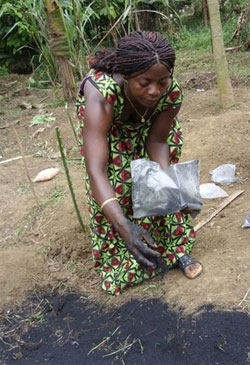 Congo biochar initiative wins critical funding to support poverty alleviation, climate change mitigation An initiative using soil carbon enrichment techniques to boost agricultural yields, alleviate poverty, and protect endangered forests in Central Africa was today selected as one of six projects to win funding under the Congo Basin Forest Fund (CBFF). The scientific committee of […]
Congo biochar initiative wins critical funding to support poverty alleviation, climate change mitigation An initiative using soil carbon enrichment techniques to boost agricultural yields, alleviate poverty, and protect endangered forests in Central Africa was today selected as one of six projects to win funding under the Congo Basin Forest Fund (CBFF). The scientific committee of […]
Bioelectricity bests ethanol on two fronts: land use and global warming
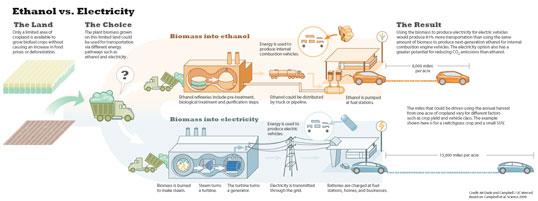 Yesterday the Obama Administration established a Biofuels Interagency Working Group to oversee implementation of new rules and research regarding biofuels. On the group’s first day they would do well to look at a new study in Science Magazine comparing the efficacy of ethanol versus bioelectricity. Researchers compared ethanol and bioelectricity in terms of miles per […]
Yesterday the Obama Administration established a Biofuels Interagency Working Group to oversee implementation of new rules and research regarding biofuels. On the group’s first day they would do well to look at a new study in Science Magazine comparing the efficacy of ethanol versus bioelectricity. Researchers compared ethanol and bioelectricity in terms of miles per […]
U.S. climate change legislation may cut energy costs – report
 The U.S. can dramatically cut greenhouse gas emissions while reducing energy spending at the same time, reports a new study by the Union of Concerned Scientists (UCS). “Climate 2030: A National Blueprint for a Clean Energy Economy” found that implementing new climate, energy and transportation policies would allow the United States to meet an emissions-reduction […]
The U.S. can dramatically cut greenhouse gas emissions while reducing energy spending at the same time, reports a new study by the Union of Concerned Scientists (UCS). “Climate 2030: A National Blueprint for a Clean Energy Economy” found that implementing new climate, energy and transportation policies would allow the United States to meet an emissions-reduction […]
Clean energy investment moving too slowly to avoid irreversible climate change

Largest US protest on climate change today
Cellulosic ethanol healthier, better for the environment, than corn ethanol
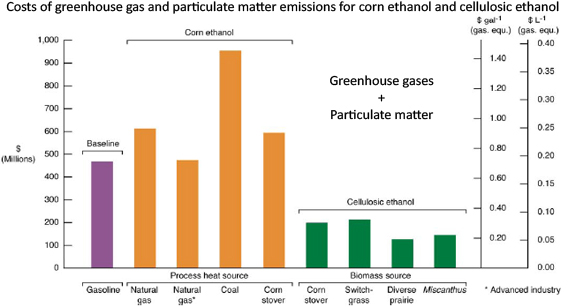 Prairie grass ethanol will kill fewer people and foul the environment less than corn ethanol
Prairie grass ethanol will kill fewer people and foul the environment less than corn ethanol
Wind energy jobs now exceed coal mining jobs
Will ‘peak oil’ spur expanded coal use? And what does it mean for climate?
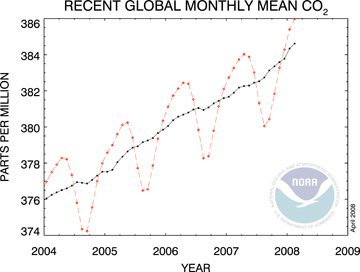 Whether oil is succeeded by coal or renewables will have major impact on climate The world must phase out emissions from coal by 2030 to avert dangerous climate change, said scientists speaking at the annual meeting of the American Geophysical Union in San Francisco. Arguing that the planet will face environmental constraints well before fossil […]
Whether oil is succeeded by coal or renewables will have major impact on climate The world must phase out emissions from coal by 2030 to avert dangerous climate change, said scientists speaking at the annual meeting of the American Geophysical Union in San Francisco. Arguing that the planet will face environmental constraints well before fossil […]
Africa eyes geothermal power
Africa eyes geothermal power Africa eyes geothermal power mongabay.com December 12, 2008
Finland, Sweden push for loophole that would drive destruction of peatlands around the world
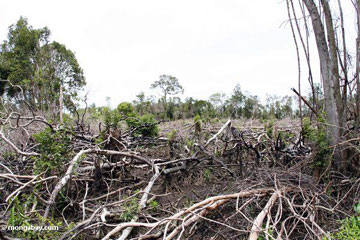 Finland, Sweden push for loophole that would drive destruction of peatlands around the world Finland, Sweden push for loophole that would drive destruction of peatlands around the world mongabay.com December 9, 2008
Finland, Sweden push for loophole that would drive destruction of peatlands around the world Finland, Sweden push for loophole that would drive destruction of peatlands around the world mongabay.com December 9, 2008
Living up to the Pope’s words: the Vatican turns to solar power
Living up to the Pope’s words: the Vatican turns to solar power Living up to the Pope’s words: the Vatican turns to solar power Jeremy Hance, mongabay.com November 28, 2008
Limiting global warming to 2-degree rise will require $180/t carbon price says energy think tank
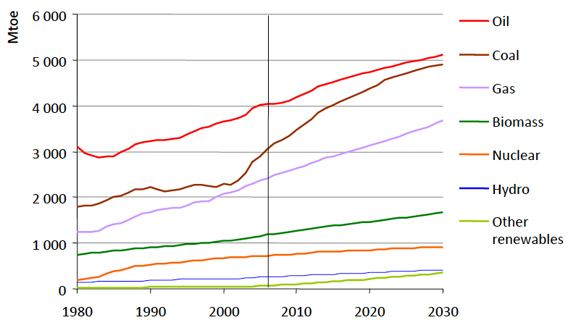 Developing countries must limit emissions to prevent global warming, says energy agency Developing countries must limit emissions to prevent global warming, says energy agency mongabay.com November 13, 2008 Limiting global warming to 2-degree rise will require $180/t carbon price says energy think tank
Developing countries must limit emissions to prevent global warming, says energy agency Developing countries must limit emissions to prevent global warming, says energy agency mongabay.com November 13, 2008 Limiting global warming to 2-degree rise will require $180/t carbon price says energy think tank
Biodiversity of rainforests should not be compared with oil palm plantations says palm oil council chief
 Scientists should not compare biodiversity of rainforests with oil palm plantations says palm oil council chief Biodiversity of rainforests should not be compared with oil palm plantations says palm oil council chief mongabay.com November 11, 2008 Dr. Yusof Basiron, the controversial CEO of the Malaysian Palm Oil Council (MPOC), blogs about the sustainability of palm […]
Scientists should not compare biodiversity of rainforests with oil palm plantations says palm oil council chief Biodiversity of rainforests should not be compared with oil palm plantations says palm oil council chief mongabay.com November 11, 2008 Dr. Yusof Basiron, the controversial CEO of the Malaysian Palm Oil Council (MPOC), blogs about the sustainability of palm […]
First RSPO-certified (“eco-friendly”) palm oil shipment to arrive in Europe
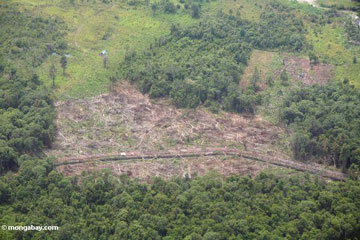 First RSPO-certified (“eco-friendly”) palm oil shipment to arrive in Europe First RSPO-certified (“eco-friendly”) palm oil shipment to arrive in Europe mongabay.com November 10, 2008
First RSPO-certified (“eco-friendly”) palm oil shipment to arrive in Europe First RSPO-certified (“eco-friendly”) palm oil shipment to arrive in Europe mongabay.com November 10, 2008
EU’s sustainable biofuels push angers Malaysia, Brazil
 EU’s sustainable biofuels push angers Malaysia, Brazil EU’s sustainable biofuels push angers Malaysia, Brazil mongabay.com November 7, 2008
EU’s sustainable biofuels push angers Malaysia, Brazil EU’s sustainable biofuels push angers Malaysia, Brazil mongabay.com November 7, 2008
Feeds: news | india | latam | brasil | indonesia
 Lake Balbina, a man-made reservoir created to supply hydroelectric power to the city of Manaus in Brazil. Courtesy of NASA. Nearly 200 civil society organizations have called on world leaders to exclude large hydroelectric projects from receiving green climate funds and other incentives. The message of the letter, published Monday during climate talks in Lima, […]
Lake Balbina, a man-made reservoir created to supply hydroelectric power to the city of Manaus in Brazil. Courtesy of NASA. Nearly 200 civil society organizations have called on world leaders to exclude large hydroelectric projects from receiving green climate funds and other incentives. The message of the letter, published Monday during climate talks in Lima, […] Biomass burning takes many forms: wildfires, slash-and-burn agriculture, clearing forests and other vegetation, and even industrialized burning for energy production. Yet this burning—mostly manmade but also natural—takes a massive toll both on human health and the environment, according to a new paper in Journal of Geophysical Research: Atmospheres. “We calculate that 5 to 10 percent […]
Biomass burning takes many forms: wildfires, slash-and-burn agriculture, clearing forests and other vegetation, and even industrialized burning for energy production. Yet this burning—mostly manmade but also natural—takes a massive toll both on human health and the environment, according to a new paper in Journal of Geophysical Research: Atmospheres. “We calculate that 5 to 10 percent […] The U.S. Environmental Protection Agency’s (EPA) June 2nd regulation proposal hit all the expected chords. Following on the heels of a January regulation for new power plants, the Clean Power Plan focuses on all existing electric generation. By 2030, the plan aims to reduce 2005-level carbon dioxide emissions by 30 percent and soot and smog-causing […]
The U.S. Environmental Protection Agency’s (EPA) June 2nd regulation proposal hit all the expected chords. Following on the heels of a January regulation for new power plants, the Clean Power Plan focuses on all existing electric generation. By 2030, the plan aims to reduce 2005-level carbon dioxide emissions by 30 percent and soot and smog-causing […] Massive offshore wind turbine arrays would reduce hurricane wind speeds and storm surge, reports a study published this week in Nature Climate Change. And while the size (tens of thousands of turbines) and cost (hundreds of billions of dollars) is difficult to imagine, the reduction in storm damage and value of electricity produced would effectively […]
Massive offshore wind turbine arrays would reduce hurricane wind speeds and storm surge, reports a study published this week in Nature Climate Change. And while the size (tens of thousands of turbines) and cost (hundreds of billions of dollars) is difficult to imagine, the reduction in storm damage and value of electricity produced would effectively […] The Congo River traverses the continent of Africa, ending its journey in the Democratic Republic of Congo (DRC) where it spills 1.5 million cubic feet per second into the Atlantic Ocean. Now, plans are underway to harness this tremendous force of water in what promises to be the world’s largest hydropower scheme, The Grand Inga. […]
The Congo River traverses the continent of Africa, ending its journey in the Democratic Republic of Congo (DRC) where it spills 1.5 million cubic feet per second into the Atlantic Ocean. Now, plans are underway to harness this tremendous force of water in what promises to be the world’s largest hydropower scheme, The Grand Inga. […] World must aim for one degrees Celsius warming, instead of two say leading scientists. Two degrees is too much: that’s the conclusion of a landmark new paper by top economists and climatologists, including James Hansen formerly of NASA. The paper, appearing in the open-access journal PLoS ONE, argues that global society must aim for only […]
World must aim for one degrees Celsius warming, instead of two say leading scientists. Two degrees is too much: that’s the conclusion of a landmark new paper by top economists and climatologists, including James Hansen formerly of NASA. The paper, appearing in the open-access journal PLoS ONE, argues that global society must aim for only […] At first glance, a recent report from the U.S. White House on the social cost of carbon reads like a daunting economics exam. A small chart poses the first question about the price tag policymakers attach to future greenhouse gas emissions: Does each metric ton of carbon that billows into the air cost $11, $33 […]
At first glance, a recent report from the U.S. White House on the social cost of carbon reads like a daunting economics exam. A small chart poses the first question about the price tag policymakers attach to future greenhouse gas emissions: Does each metric ton of carbon that billows into the air cost $11, $33 […] Global carbon dioxide emissions hit another new record of 34.5 billion tons last year, according to a new report by the Netherlands Environment Assessment Agency and the European Commission’s Joint Research Centre, but there may be a silver lining. Dubbing 2012 a “remarkable year,” the report found that the rate of carbon emission’s rise slowed […]
Global carbon dioxide emissions hit another new record of 34.5 billion tons last year, according to a new report by the Netherlands Environment Assessment Agency and the European Commission’s Joint Research Centre, but there may be a silver lining. Dubbing 2012 a “remarkable year,” the report found that the rate of carbon emission’s rise slowed […] The opening of the International Hydropower Association (IHA) World Congress in the Malaysian state of Sarawak was marred today by indigenous protests and controversy after a local indigenous leader was barred from attending a pre-conference workshop. Over 300 people from local indigenous people protested the ongoing construction of around a dozen mega-dams in the state […]
The opening of the International Hydropower Association (IHA) World Congress in the Malaysian state of Sarawak was marred today by indigenous protests and controversy after a local indigenous leader was barred from attending a pre-conference workshop. Over 300 people from local indigenous people protested the ongoing construction of around a dozen mega-dams in the state […] The world could be heading for a major economic crisis as stock markets inflate an investment bubble in fossil fuels to the tune of trillions of dollars, according to leading economists. “The financial crisis has shown what happens when risks accumulate unnoticed,” said Lord (Nicholas) Stern, a professor at the London School of Economics. He […]
The world could be heading for a major economic crisis as stock markets inflate an investment bubble in fossil fuels to the tune of trillions of dollars, according to leading economists. “The financial crisis has shown what happens when risks accumulate unnoticed,” said Lord (Nicholas) Stern, a professor at the London School of Economics. He […] One kilometer off the Philippine island of Palawan lies the Rasa Island Wildlife Sanctuary; here forest grows unimpeded from a coral island surrounded by mangroves and coral reefs. Although tiny, over a hundred bird species have been recorded on the island along with a major population of large flying foxes, while in the waters below […]
One kilometer off the Philippine island of Palawan lies the Rasa Island Wildlife Sanctuary; here forest grows unimpeded from a coral island surrounded by mangroves and coral reefs. Although tiny, over a hundred bird species have been recorded on the island along with a major population of large flying foxes, while in the waters below […] Solar Photovoltaic Projects: In the Mainstream Power Market, written by renewables energy pioneer Philip Wolfe, is an excellent introduction to the solar photovoltaic project development and power markets sector. Mr. Wolfe’s multi-decadal experience in the solar sector first founding BP Solar in the 1970s and then later working with various renewable energy finance initiatives, brings […]
Solar Photovoltaic Projects: In the Mainstream Power Market, written by renewables energy pioneer Philip Wolfe, is an excellent introduction to the solar photovoltaic project development and power markets sector. Mr. Wolfe’s multi-decadal experience in the solar sector first founding BP Solar in the 1970s and then later working with various renewable energy finance initiatives, brings […] Rainforest in Sabah, Malaysia on the island of Borneo. Photo by: Rhett A. Butler. A new video highlights the work and drive of renewable energy proponents at the inaugural meeting of Southeast Asia Renewable Energy People’s Assembly (SEAREPA) in the Malaysian state of Sabah. Held last year, the meeting brought together 80 organizations from 12 […]
Rainforest in Sabah, Malaysia on the island of Borneo. Photo by: Rhett A. Butler. A new video highlights the work and drive of renewable energy proponents at the inaugural meeting of Southeast Asia Renewable Energy People’s Assembly (SEAREPA) in the Malaysian state of Sabah. Held last year, the meeting brought together 80 organizations from 12 […] Solar power on Nellis Air Force Base in Nevada. Photo by: U.S. Air Force photo/Airman 1st Class Nadine Y. Barclay. The world’s installed solar capacity hit 101 gigawatts last year, according to new data from the European Photovoltaic Industry Association (EPIA). Last year alone, saw nearly 30 gigawatts of solar power added around the world. […]
Solar power on Nellis Air Force Base in Nevada. Photo by: U.S. Air Force photo/Airman 1st Class Nadine Y. Barclay. The world’s installed solar capacity hit 101 gigawatts last year, according to new data from the European Photovoltaic Industry Association (EPIA). Last year alone, saw nearly 30 gigawatts of solar power added around the world. […] Electricity supplied from a new wind farm is cheaper than that from a new gas or coal-fired power plant in Australia, reports a new analysis published by Bloomberg New Energy Finance. According to the study, wind-generated electricity costs AU$80 ($83) per megawatt hour compared with compared to AU$143/MWh ($148) from a new coal plant or […]
Electricity supplied from a new wind farm is cheaper than that from a new gas or coal-fired power plant in Australia, reports a new analysis published by Bloomberg New Energy Finance. According to the study, wind-generated electricity costs AU$80 ($83) per megawatt hour compared with compared to AU$143/MWh ($148) from a new coal plant or […] Scientists and experts are increasingly concerned that we are entering an age of ecological collapse with untold impacts for future generations. In Daniel Rirdan’s new book, The Blueprint, he outlines how to avoid this fate. Author, global strategist, and speaker Daniel Rirdan set out to create a plan addressing the future of our planet. His […]
Scientists and experts are increasingly concerned that we are entering an age of ecological collapse with untold impacts for future generations. In Daniel Rirdan’s new book, The Blueprint, he outlines how to avoid this fate. Author, global strategist, and speaker Daniel Rirdan set out to create a plan addressing the future of our planet. His […] Google has made another big renewable energy investment, putting $200 million into a Texas wind farm, said the Internet search giant in a post on its official blog. The 161 megawatt project — called the Spinning Spur Wind Project — is located in Oldham County about 35 miles from Amarillo. It generates enough electricity to […]
Google has made another big renewable energy investment, putting $200 million into a Texas wind farm, said the Internet search giant in a post on its official blog. The 161 megawatt project — called the Spinning Spur Wind Project — is located in Oldham County about 35 miles from Amarillo. It generates enough electricity to […] Bangui Windfarm in the Philippines. Photo by: John Ryan Cordova. As the 18th meeting of the UN Framework Convention on Climate Change (UNFCCC) kicks off this morning in oil and gas rich Qatar, the world body warns that much more ambitious greenhouse gas cuts are needed to keep catastrophic climate change at bay. A new […]
Bangui Windfarm in the Philippines. Photo by: John Ryan Cordova. As the 18th meeting of the UN Framework Convention on Climate Change (UNFCCC) kicks off this morning in oil and gas rich Qatar, the world body warns that much more ambitious greenhouse gas cuts are needed to keep catastrophic climate change at bay. A new […] Bakun dam during construction. Photo by: Mohamad Shoox. A top minister in the Malaysian state of Sarawak has told activists campaigning for cleaner energy to ‘stop breathing’, reports The Borneo Post. “I would like to throw a challenge at them (critics) on two fronts,” Land Development Minister Tan Sri Dr James Jemut Masing told the […]
Bakun dam during construction. Photo by: Mohamad Shoox. A top minister in the Malaysian state of Sarawak has told activists campaigning for cleaner energy to ‘stop breathing’, reports The Borneo Post. “I would like to throw a challenge at them (critics) on two fronts,” Land Development Minister Tan Sri Dr James Jemut Masing told the […] Participants from diverse backgrounds and groups marking on a map the creation of partnerships through identified projects at the end of the Southeast Asia Renewable Energy People’s Assembly (SEAREPA) at the Rainforest Discovery Centre in Sandakan, Sabah. Photo by: Suzanne Chong/LEAP. The first ever meeting of the Southeast Asia Renewable Energy People’s Assembly (SEAREPA) ended […]
Participants from diverse backgrounds and groups marking on a map the creation of partnerships through identified projects at the end of the Southeast Asia Renewable Energy People’s Assembly (SEAREPA) at the Rainforest Discovery Centre in Sandakan, Sabah. Photo by: Suzanne Chong/LEAP. The first ever meeting of the Southeast Asia Renewable Energy People’s Assembly (SEAREPA) ended […] A participant sharing a story at the inaugural Southeast Asia Renewable Energy People’s Assembly (SEAREPA) at the Rainforest Discovery Centre in Sandakan, Sabah. Photo courtesy of SEAREPA. Last year, a coalition of environmentalists and locals won a David-versus-Goliath battle against a massive coal plant in the Malaysian state of Sabah on Borneo. After facing a […]
A participant sharing a story at the inaugural Southeast Asia Renewable Energy People’s Assembly (SEAREPA) at the Rainforest Discovery Centre in Sandakan, Sabah. Photo courtesy of SEAREPA. Last year, a coalition of environmentalists and locals won a David-versus-Goliath battle against a massive coal plant in the Malaysian state of Sabah on Borneo. After facing a […] The ongoing decline in Arctic sea ice hit a new record this year that rocked even the most pessimistic predictions. The low sea ice extent hit 18 percent below the previous record set in just 2007, and was only around half the size it was in 1980. Here, NASA satellites catches a glimpse of the […]
The ongoing decline in Arctic sea ice hit a new record this year that rocked even the most pessimistic predictions. The low sea ice extent hit 18 percent below the previous record set in just 2007, and was only around half the size it was in 1980. Here, NASA satellites catches a glimpse of the […] Wind turbine in Minnesota, U.S. Photo by: Tiffany Roufs. Wind power is up to the challenge of providing more-than-enough energy for global society, according to two new and unrelated studies. Both studies, one published in Nature Climate Change and the other in the Proceedings of the National Academy of Sciences (PNAS), found that wind power […]
Wind turbine in Minnesota, U.S. Photo by: Tiffany Roufs. Wind power is up to the challenge of providing more-than-enough energy for global society, according to two new and unrelated studies. Both studies, one published in Nature Climate Change and the other in the Proceedings of the National Academy of Sciences (PNAS), found that wind power […] Surface coal mining in Bihar, India. Around 70-80 percent of India’s power is currently provided by coal. Burning coal fuels climate change, causes acid rain, and spreads toxic pollutants into the environment, but now a new Greenpeace report warns that coal may also imperil the world’s biggest feline: the tiger. Home to world’s largest population […]
Surface coal mining in Bihar, India. Around 70-80 percent of India’s power is currently provided by coal. Burning coal fuels climate change, causes acid rain, and spreads toxic pollutants into the environment, but now a new Greenpeace report warns that coal may also imperil the world’s biggest feline: the tiger. Home to world’s largest population […].568.jpg) SOCCKET: the soccer ball that produces electricity. Photo courtesy of Uncharted Play. Recently, Jessica O. Matthews and Julia Silverman, both Harvard graduates, were awarded Harvard Foundation’s Scientists of the Year award for their invention of a soccer ball that converts kinetic energy to electricity. The two women, who were both social science majors, came up […]
SOCCKET: the soccer ball that produces electricity. Photo courtesy of Uncharted Play. Recently, Jessica O. Matthews and Julia Silverman, both Harvard graduates, were awarded Harvard Foundation’s Scientists of the Year award for their invention of a soccer ball that converts kinetic energy to electricity. The two women, who were both social science majors, came up […] Aerial view of the infamous Río Huaypetue gold mine in the Peruvian Amazon. This remote but massive gold mine is known for the destruction of primary rainforest, widespread mercury pollution, and child and slave labor. Photo by: Rhett A. Butler. Scientists warn that the Earth may be reaching a planetary tipping point due to a […]
Aerial view of the infamous Río Huaypetue gold mine in the Peruvian Amazon. This remote but massive gold mine is known for the destruction of primary rainforest, widespread mercury pollution, and child and slave labor. Photo by: Rhett A. Butler. Scientists warn that the Earth may be reaching a planetary tipping point due to a […] Surface coal mining in Bihar, India. Around 40 percent of India’s power is currently provided by coal, the most carbon intensive fuel source. Last year global carbon dioxide emissions rose 3.2 percent to a new record of 31.6 gigatons, keeping the planet on track to suffer dangerous climate change, which could propel global crop failures, […]
Surface coal mining in Bihar, India. Around 40 percent of India’s power is currently provided by coal, the most carbon intensive fuel source. Last year global carbon dioxide emissions rose 3.2 percent to a new record of 31.6 gigatons, keeping the planet on track to suffer dangerous climate change, which could propel global crop failures, […] Suburban sprawl in Albuquerque, New Mexico. The average American’s ecological footprint is the fifth highest in the world. Photo by: Jeremy Hance. Human society is consuming natural resources as if there were one-and-a-half Earths, and not just a single blue planet, according to the most recent Living Planet Report released today. If governments and societies […]
Suburban sprawl in Albuquerque, New Mexico. The average American’s ecological footprint is the fifth highest in the world. Photo by: Jeremy Hance. Human society is consuming natural resources as if there were one-and-a-half Earths, and not just a single blue planet, according to the most recent Living Planet Report released today. If governments and societies […] Observations of planet Earth from the Moderate Resolution Imaging Spectroradiometer (MODIS) on July 11, 2005. Photo by: NASA. Seventeen top scientists and four acclaimed conservation organizations have called for radical action to create a better world for this and future generations. Compiled by 21 past winners of the prestigious Blue Planet Prize, a new paper […]
Observations of planet Earth from the Moderate Resolution Imaging Spectroradiometer (MODIS) on July 11, 2005. Photo by: NASA. Seventeen top scientists and four acclaimed conservation organizations have called for radical action to create a better world for this and future generations. Compiled by 21 past winners of the prestigious Blue Planet Prize, a new paper […] 150 new dams may destroy connectivity of the Amazon River to the Andes and drive deforestation. Construction of a canal for the Belo Monte Dam project, near Altamira taken by Daniel Beltrá for Greenpeace. Once completed, the Belo Monte Dam will be the third largest in the world. It will submerge up to 400,000 hectares […]
150 new dams may destroy connectivity of the Amazon River to the Andes and drive deforestation. Construction of a canal for the Belo Monte Dam project, near Altamira taken by Daniel Beltrá for Greenpeace. Once completed, the Belo Monte Dam will be the third largest in the world. It will submerge up to 400,000 hectares […] Imagine powering your cell phone by leaving it on the window sill. Sounds like science fiction? Actually, this might soon turn into reality. Scientists have been exploring the potential of solar energy for decades. One of the cheapest ways to turn solar energy into electricity is by creating solar cells from organic polymers, which are […]
Imagine powering your cell phone by leaving it on the window sill. Sounds like science fiction? Actually, this might soon turn into reality. Scientists have been exploring the potential of solar energy for decades. One of the cheapest ways to turn solar energy into electricity is by creating solar cells from organic polymers, which are […] Last October indigenous groups, local people, and domestic NGOs formed the Save Sarawak’s Rivers Network to fight the planned construction of a dozen dams in the Malaysian state on the island of Borneo. The coalition opposes the dam-building plans, known as the Sarawak Corridor of Renewable Energy (SCORE) initiative, due to its impacts on indigenous […]
Last October indigenous groups, local people, and domestic NGOs formed the Save Sarawak’s Rivers Network to fight the planned construction of a dozen dams in the Malaysian state on the island of Borneo. The coalition opposes the dam-building plans, known as the Sarawak Corridor of Renewable Energy (SCORE) initiative, due to its impacts on indigenous […] The world’s second largest mining company, Vale, has been given the dubious honor of being voted the world’s most awful corporation in terms of human rights abuses and environmental destruction by the Public Eye Awards. Vale received over 25,000 votes online, likely prompted in part by its stake in the hugely controversial Brazilian mega-dam, Belo […]
The world’s second largest mining company, Vale, has been given the dubious honor of being voted the world’s most awful corporation in terms of human rights abuses and environmental destruction by the Public Eye Awards. Vale received over 25,000 votes online, likely prompted in part by its stake in the hugely controversial Brazilian mega-dam, Belo […] Greenhouse gas emissions from palm oil-based biodiesel are the highest among major biofuels when the effects of deforestation and peatlands degradation are considered, according to calculations by the European Commission. The emissions estimates, which haven’t been officially released, have important implications for the biofuels industry in Europe. As reported by EurActiv, the data from the […]
Greenhouse gas emissions from palm oil-based biodiesel are the highest among major biofuels when the effects of deforestation and peatlands degradation are considered, according to calculations by the European Commission. The emissions estimates, which haven’t been officially released, have important implications for the biofuels industry in Europe. As reported by EurActiv, the data from the […] Sarah Laskow is a freelance writer who has covered environmental issues for Grist, GOOD, and Newsweek.com, among others. Raised in New Jersey and educated at Yale where she studied literature, Sarah now lives across the river in Manhattan with her partner. She’s done extensive traveling in West Africa, Europe, and Central America. Sarah can be […]
Sarah Laskow is a freelance writer who has covered environmental issues for Grist, GOOD, and Newsweek.com, among others. Raised in New Jersey and educated at Yale where she studied literature, Sarah now lives across the river in Manhattan with her partner. She’s done extensive traveling in West Africa, Europe, and Central America. Sarah can be […] Victories won by activists around the world tops our list of the big environmental stories of the year. In this photo: a young woman is placed in handcuffs and arrested for civil disobedience against the Keystone XL Pipeline in the U.S. In all, 1,252 people were arrested in the two week long action. Photo by: […]
Victories won by activists around the world tops our list of the big environmental stories of the year. In this photo: a young woman is placed in handcuffs and arrested for civil disobedience against the Keystone XL Pipeline in the U.S. In all, 1,252 people were arrested in the two week long action. Photo by: […] Click to enlarge. Early Sunday morning over 190 of the world’s countries signed on to a new climate agreement at the 17th UN Framework Convention on Climate Change (UNFCCC) in Durban, South Africa. The summit was supposed to end on Friday, but marathon negotiations pushed government officials to burn the midnight oil for about 36 […]
Click to enlarge. Early Sunday morning over 190 of the world’s countries signed on to a new climate agreement at the 17th UN Framework Convention on Climate Change (UNFCCC) in Durban, South Africa. The summit was supposed to end on Friday, but marathon negotiations pushed government officials to burn the midnight oil for about 36 […] Not known for alarmism and sometimes criticized for being too optimistic, the International Energy Agency (IEA) has warned that without bold action in the next five years the world will lock itself into high-emissions energy sources that will push climate change beyond the 2 degrees Celsius considered relatively ‘safe’ by many scientists and officials. “As […]
Not known for alarmism and sometimes criticized for being too optimistic, the International Energy Agency (IEA) has warned that without bold action in the next five years the world will lock itself into high-emissions energy sources that will push climate change beyond the 2 degrees Celsius considered relatively ‘safe’ by many scientists and officials. “As […] Hydroelectric power is often promoted as green energy, yet dams, especially in the tropics, can be significant sources of greenhouse gas emissions. When built, reservoirs trap vegetation, which, as it rots, emits both methane and carbon into the atmosphere. A new study in Science of the Total Environment found that a dam in Lao PDR […]
Hydroelectric power is often promoted as green energy, yet dams, especially in the tropics, can be significant sources of greenhouse gas emissions. When built, reservoirs trap vegetation, which, as it rots, emits both methane and carbon into the atmosphere. A new study in Science of the Total Environment found that a dam in Lao PDR […] If governments are to keep the pledge they made in Copenhagen to limit global warming within the ‘safe range’ of two degrees Celsius, they are running out of time, according to two sobering papers from Nature. One of the studies finds that if the world is to have a 66 percent chance of staying below […]
If governments are to keep the pledge they made in Copenhagen to limit global warming within the ‘safe range’ of two degrees Celsius, they are running out of time, according to two sobering papers from Nature. One of the studies finds that if the world is to have a 66 percent chance of staying below […] The decades-long fight over Brazilian megadam, the Belo Monte, has taken another U-turn after a judge ordered work to stop immediately since the dam would devastate vital fishing grounds for local people. In June the Brazilian government gave a go-ahead to the $11-17 billion dam, despite large-scale opposition from indigenous groups along the Xingu River […]
The decades-long fight over Brazilian megadam, the Belo Monte, has taken another U-turn after a judge ordered work to stop immediately since the dam would devastate vital fishing grounds for local people. In June the Brazilian government gave a go-ahead to the $11-17 billion dam, despite large-scale opposition from indigenous groups along the Xingu River […] A typical scenario in the Atlantic Forest at the Northeastern Biodiversity Corridor, where forest remants are surrounded by sugarcane plantations. Most of the remaining forest fragments are, on average, smaller than 100 ha. Photo credit: Adriano Gambarini. Aggressively expanding sugarcane ethanol is putting Brazil’s nearly-vanished Atlantic Forest at risk, according to an opinion piece in […]
A typical scenario in the Atlantic Forest at the Northeastern Biodiversity Corridor, where forest remants are surrounded by sugarcane plantations. Most of the remaining forest fragments are, on average, smaller than 100 ha. Photo credit: Adriano Gambarini. Aggressively expanding sugarcane ethanol is putting Brazil’s nearly-vanished Atlantic Forest at risk, according to an opinion piece in […] Young people rally in Kiev, Ukraine at apart of the Moving Planet campaign. Photo by: Maxm Gorpenyuk. On six continents, in over 75 percent of the world’s countries, people came out en masse yesterday to attend over 2,000 events to demonstrate the power of renewable energy to combat global climate change. As apart of the […]
Young people rally in Kiev, Ukraine at apart of the Moving Planet campaign. Photo by: Maxm Gorpenyuk. On six continents, in over 75 percent of the world’s countries, people came out en masse yesterday to attend over 2,000 events to demonstrate the power of renewable energy to combat global climate change. As apart of the […] As many people in the United States question whether renewable energy is a viable alternative to fossil fuels, Germany now derives 20.8 percent of its electricity from renewable sources—a 15 percent increase since 2000, reports Der Spiegel. In contrast, the United States generates only 10 percent of its electricity from renewable sources, 6 percent of […]
As many people in the United States question whether renewable energy is a viable alternative to fossil fuels, Germany now derives 20.8 percent of its electricity from renewable sources—a 15 percent increase since 2000, reports Der Spiegel. In contrast, the United States generates only 10 percent of its electricity from renewable sources, 6 percent of […] Last week the 3rd Nobel Laureates Symposium on Global Sustainability concluded with participants—including 17 past Nobel Prize winners and 40 other experts—crafting and signing the Stockholm Memorandum. The document calls for emergency actions to tackle human pressures on the Earth’s environment while ensuring a more equitable and just world. “Science makes clear that we are […]
Last week the 3rd Nobel Laureates Symposium on Global Sustainability concluded with participants—including 17 past Nobel Prize winners and 40 other experts—crafting and signing the Stockholm Memorandum. The document calls for emergency actions to tackle human pressures on the Earth’s environment while ensuring a more equitable and just world. “Science makes clear that we are […] When historians look back at the fight to combat climate change—not to mention the struggle to overcome our global addiction to fossil fuels—will 2011 be considered a watershed moment? Maybe. In the last couple months, three countries—each in the top ten in terms of GDP—have suddenly made major renewable energy promises. Germany, Japan, and, just […]
When historians look back at the fight to combat climate change—not to mention the struggle to overcome our global addiction to fossil fuels—will 2011 be considered a watershed moment? Maybe. In the last couple months, three countries—each in the top ten in terms of GDP—have suddenly made major renewable energy promises. Germany, Japan, and, just […] The wild rivers of Patagonia may soon never be the same. Last week, Chile’s Aysén Environmental Review Commission approved the environmental assessment of a five dam proposal on two rivers. The approval, however, is marred in controversy and has set off protests in many cities, including Santiago. Critics say the series of dams will destroy […]
The wild rivers of Patagonia may soon never be the same. Last week, Chile’s Aysén Environmental Review Commission approved the environmental assessment of a five dam proposal on two rivers. The approval, however, is marred in controversy and has set off protests in many cities, including Santiago. Critics say the series of dams will destroy […] Mekong river at Chiang Saen in Thailand. Photo by: Rhett A. Butler. As the governments of Laos, Thailand, Cambodia, and Vietnam ready to meet on April 19th to decide whether or not to move forward on the Xayaburi Dam, critics of Mekong River hydroelectric project have warned that the dam will devastate freshwater biodiversity and […]
Mekong river at Chiang Saen in Thailand. Photo by: Rhett A. Butler. As the governments of Laos, Thailand, Cambodia, and Vietnam ready to meet on April 19th to decide whether or not to move forward on the Xayaburi Dam, critics of Mekong River hydroelectric project have warned that the dam will devastate freshwater biodiversity and […] Following years of criticism from environmentalists and some governments the World Bank has proposed new rules regarding carbon-intensive coal plants, reports the Guardian. The new rules would allow lending for coal-fired plants only to the world’s poorest nations and would only lend after other alternatives, such as renewable energy, had been ruled out. World Bank […]
Following years of criticism from environmentalists and some governments the World Bank has proposed new rules regarding carbon-intensive coal plants, reports the Guardian. The new rules would allow lending for coal-fired plants only to the world’s poorest nations and would only lend after other alternatives, such as renewable energy, had been ruled out. World Bank […] US agriculture stands to lose billions in free ecosystem services from the often-feared and rarely respected humble bat. According to a recent study in Science bats in North America provide the US agricultural industry at least $3.7 billion and up to a staggering $53 billion a year by eating mounds of potentially pesky insects. Yet […]
US agriculture stands to lose billions in free ecosystem services from the often-feared and rarely respected humble bat. According to a recent study in Science bats in North America provide the US agricultural industry at least $3.7 billion and up to a staggering $53 billion a year by eating mounds of potentially pesky insects. Yet […] Three indigenous Amazonian leaders spent this week touring Europe to raise awareness about the threat that a number of proposed monster dams pose to their people and the Amazon forest. Culminating in a press conference and protests in London, the international trip hopes to build pressure to stop three current hydroelectric projects, one in Peru, […]
Three indigenous Amazonian leaders spent this week touring Europe to raise awareness about the threat that a number of proposed monster dams pose to their people and the Amazon forest. Culminating in a press conference and protests in London, the international trip hopes to build pressure to stop three current hydroelectric projects, one in Peru, […] The beachside site of the now canceled coal-fired power plant in Kampung Sinakut, Lahad Datu, Sabah. Photo courtesy of Green SURF. Note: many of these photos were published in a previous post on the coal plant. Last week the Malaysian government announced it had canceled a plan to build a coal-fired plant in the state […]
The beachside site of the now canceled coal-fired power plant in Kampung Sinakut, Lahad Datu, Sabah. Photo courtesy of Green SURF. Note: many of these photos were published in a previous post on the coal plant. Last week the Malaysian government announced it had canceled a plan to build a coal-fired plant in the state […] Environmentalists, scientists, and locals have won the battle against a controversial coal plant in the Malaysian state of Sabah in northern Borneo. The State and Federal government announced today that they would “pursue other alternative sources of energy, namely gas, to meet Sabah’s power supply needs.” Proposed for an undeveloped beach on the north-eastern coast […]
Environmentalists, scientists, and locals have won the battle against a controversial coal plant in the Malaysian state of Sabah in northern Borneo. The State and Federal government announced today that they would “pursue other alternative sources of energy, namely gas, to meet Sabah’s power supply needs.” Proposed for an undeveloped beach on the north-eastern coast […] The view from Lazy Point. Photo courtesy of Carl Safina. Being compared—by more than one reviewer—to Henry Thoreau and Rachel Carson would make any nature writer’s day. But add in effusive reviews that compare one to a jazz musician, Ernest Hemingway, and Charles Darwin, and you have a sense of the praise heaped on Carl […]
The view from Lazy Point. Photo courtesy of Carl Safina. Being compared—by more than one reviewer—to Henry Thoreau and Rachel Carson would make any nature writer’s day. But add in effusive reviews that compare one to a jazz musician, Ernest Hemingway, and Charles Darwin, and you have a sense of the praise heaped on Carl […] Recent studies point to the feasibility of a global clean energy revolution. Last night US President Barack Obama called for a massive green energy make-over of the world’s largest economy. Describing the challenge as ‘this generation’s Sputnik moment’ the US president set a goal of producing 80 percent of America’s energy by clean sources by […]
Recent studies point to the feasibility of a global clean energy revolution. Last night US President Barack Obama called for a massive green energy make-over of the world’s largest economy. Describing the challenge as ‘this generation’s Sputnik moment’ the US president set a goal of producing 80 percent of America’s energy by clean sources by […] 25 years on from Greenpeace’s joint stand with New Zealand’s government against potentially environmentally devastating practices, the country is at a Crossroads The Rainbow Warrior after the bombing by French commandos. Image courtesy of Greenpeace In light of the subject of this article, condolences go out to the families of the 29 miners who died […]
25 years on from Greenpeace’s joint stand with New Zealand’s government against potentially environmentally devastating practices, the country is at a Crossroads The Rainbow Warrior after the bombing by French commandos. Image courtesy of Greenpeace In light of the subject of this article, condolences go out to the families of the 29 miners who died […] The U.S. Department of Energy has finalized a guarantee to provide a loan of $1.45 billion to Abengoa Solar Inc. which will fund the world’s largest parabolic trough concentrating solar plant. The plant is expected to serve 70,000 households and avoid 475,000 tons of carbon dioxide emissions per year. The plant, called Solana, will be […]
The U.S. Department of Energy has finalized a guarantee to provide a loan of $1.45 billion to Abengoa Solar Inc. which will fund the world’s largest parabolic trough concentrating solar plant. The plant is expected to serve 70,000 households and avoid 475,000 tons of carbon dioxide emissions per year. The plant, called Solana, will be […] The US midterm election, which won Republicans the House but safeguarded the Senate for Democrats, has brought in a number of self-proclaimed climate change deniers, ending any likelihood that an energy bill will be passed over the next two years and essentially stumbling the White House’s strategy on climate change. Newly elected Republican Senators Rand […]
The US midterm election, which won Republicans the House but safeguarded the Senate for Democrats, has brought in a number of self-proclaimed climate change deniers, ending any likelihood that an energy bill will be passed over the next two years and essentially stumbling the White House’s strategy on climate change. Newly elected Republican Senators Rand […] Most Americans don’t understand the basics of climate change, according to a new poll by researchers with Yale. The poll found that over half of Americans deserve an ‘F’ on basic understanding of climate science and climate change, while only 1% would receive an ‘A’. While 63% of Americans say that the globe is warming, […]
Most Americans don’t understand the basics of climate change, according to a new poll by researchers with Yale. The poll found that over half of Americans deserve an ‘F’ on basic understanding of climate science and climate change, while only 1% would receive an ‘A’. While 63% of Americans say that the globe is warming, […] Too many people consuming too much is depleting the world’s natural resources faster than they are replenished, imperiling not only the world’s species but risking the well-being of human societies, according to a new massive study by the World Wildlife Fund (WWF), entitled the Living Planet Report. The report finds that humanity is currently consuming […]
Too many people consuming too much is depleting the world’s natural resources faster than they are replenished, imperiling not only the world’s species but risking the well-being of human societies, according to a new massive study by the World Wildlife Fund (WWF), entitled the Living Planet Report. The report finds that humanity is currently consuming […] While the US has fallen far behind China and Europe in clean energy power, an announcement by Google today brings hope to green energy backers. Google is putting its considerable name and a lot of cash behind a $5 billion energy transmission line that would link up proposed wind turbines off the US’s East Coast […]
While the US has fallen far behind China and Europe in clean energy power, an announcement by Google today brings hope to green energy backers. Google is putting its considerable name and a lot of cash behind a $5 billion energy transmission line that would link up proposed wind turbines off the US’s East Coast […] To solve today’s environmental crises—climate change, deforestation, mass extinction, and marine degradation—while feeding a growing population (on its way to 9 billion) will require not only thinking outside the box, but a “new box altogether” according to Dr. Dickson Despommier, author of the new book, The Vertical Farm. Exciting policy-makers and environmentalists, Despommier’s bold idea […]
To solve today’s environmental crises—climate change, deforestation, mass extinction, and marine degradation—while feeding a growing population (on its way to 9 billion) will require not only thinking outside the box, but a “new box altogether” according to Dr. Dickson Despommier, author of the new book, The Vertical Farm. Exciting policy-makers and environmentalists, Despommier’s bold idea […] Using decades-old data researchers have proven a long-suspected effect of wind turbines: under certain conditions large-scale wind farms can change local weather. Temperatures recorded from a wind farm in San Gorgonio, California in 1989 shows that turbines cooled local temperatures during the day, but warmed them at night. However, researchers in the paper published in […]
Using decades-old data researchers have proven a long-suspected effect of wind turbines: under certain conditions large-scale wind farms can change local weather. Temperatures recorded from a wind farm in San Gorgonio, California in 1989 shows that turbines cooled local temperatures during the day, but warmed them at night. However, researchers in the paper published in […] The cost of environmental damage to the global economy hit 6.6 trillion US dollars—11 percent of the global GDP—in 2008, according to a new study by the Principles for Responsible (PRI) and UNEP Finance Initiative. If business continues as usual, the study predicts that environmental damage will cost 28 trillion dollars by 2050. The new […]
The cost of environmental damage to the global economy hit 6.6 trillion US dollars—11 percent of the global GDP—in 2008, according to a new study by the Principles for Responsible (PRI) and UNEP Finance Initiative. If business continues as usual, the study predicts that environmental damage will cost 28 trillion dollars by 2050. The new […] Sebuah wawancara dengan Laurens Rademakers dari Biochar Fund. Biochar – penggunaan arang yang diproduksi dari membakar biomassa untuk pertanian – mungkin merupakan saru dari revolusi lingkungan dan sosial yang terpenting di abad ini. Praktek yang sepertinya sederhana ini – sebuah teknologi yang kembali ke ribuan tahun yang lalu – memiliki potensi untuk membantu mengurangi sebagian […]
Sebuah wawancara dengan Laurens Rademakers dari Biochar Fund. Biochar – penggunaan arang yang diproduksi dari membakar biomassa untuk pertanian – mungkin merupakan saru dari revolusi lingkungan dan sosial yang terpenting di abad ini. Praktek yang sepertinya sederhana ini – sebuah teknologi yang kembali ke ribuan tahun yang lalu – memiliki potensi untuk membantu mengurangi sebagian […] The European Union’s renewable fuels target is driving land grabs in Africa that threaten the environment and local communities, claims a new report from Friends of the Earth (FOE). Africa: up for grabs – The scale and impact of land grabbing for agrofuels [PDF] reviews a series of land deals signed across more than a […]
The European Union’s renewable fuels target is driving land grabs in Africa that threaten the environment and local communities, claims a new report from Friends of the Earth (FOE). Africa: up for grabs – The scale and impact of land grabbing for agrofuels [PDF] reviews a series of land deals signed across more than a […] An interview with Laurens Rademakers of Biochar Fund. Biochar—the agricultural application of charcoal produced from burning biomass—may be one of this century’s most important social and environmental revolutions. This seemingly humble practice—a technology that goes back thousands of years—has the potential to help mitigate a number of entrenched global problems: desperate hunger, lack of soil […]
An interview with Laurens Rademakers of Biochar Fund. Biochar—the agricultural application of charcoal produced from burning biomass—may be one of this century’s most important social and environmental revolutions. This seemingly humble practice—a technology that goes back thousands of years—has the potential to help mitigate a number of entrenched global problems: desperate hunger, lack of soil […] “President Obama called it ‘the worst environmental disaster America has ever faced.’ So I thought I should face it and head to the Gulf”—these are the opening words on the popular blog Guilty Planet as the author, marine biologist Jennifer Jacquet, embarked on a ten day trip to Louisiana. As a scientist, Jacquet was, of […]
“President Obama called it ‘the worst environmental disaster America has ever faced.’ So I thought I should face it and head to the Gulf”—these are the opening words on the popular blog Guilty Planet as the author, marine biologist Jennifer Jacquet, embarked on a ten day trip to Louisiana. As a scientist, Jacquet was, of […] UE kini bergerak untuk membuat standar lingkungan untuk biofuel yang digunakan di Eropa, mensyaratkan biofuel untuk memberikan “pengurangan substansial” pada emisi gas rumah kaca dan tidak menghasilkan perubahan fungsi hutan atau lahan basah, menurut pernyataan dari Komisi Eropa. Rencana ini meminta industri, pemerintah, dan LSM untuk menyiapkan “skema sukarela” yang memberikan sertifikasi bahwa biofuel yang […]
UE kini bergerak untuk membuat standar lingkungan untuk biofuel yang digunakan di Eropa, mensyaratkan biofuel untuk memberikan “pengurangan substansial” pada emisi gas rumah kaca dan tidak menghasilkan perubahan fungsi hutan atau lahan basah, menurut pernyataan dari Komisi Eropa. Rencana ini meminta industri, pemerintah, dan LSM untuk menyiapkan “skema sukarela” yang memberikan sertifikasi bahwa biofuel yang […] Local fishermen in the Malaysian state of Sabah are uncertain of their future, if the government pushes ahead to build a 300 megawatt coal power plant. They have been told they will be moved from their current seaside village to one deeper inland, and while the coal plant will provide manual labor work in its […]
Local fishermen in the Malaysian state of Sabah are uncertain of their future, if the government pushes ahead to build a 300 megawatt coal power plant. They have been told they will be moved from their current seaside village to one deeper inland, and while the coal plant will provide manual labor work in its […] Dengan seluruh perhatian dunia sedang mengarah pada bencana lingkungan di Teluk Meksiko, banyak yang mulai merenungkan kebenaran dari tidak hanya Amerika, tapi ketergantungan dunia akan bahan bakar fossil. Meski begitu proyek-proyek pengadaan energi berbahan bakar fosil skala besar terus berjalan maju, termasuk di kota Sabah, Malaysia di Borneo yang akan membangun 300 MW pembangkit listrik […]
Dengan seluruh perhatian dunia sedang mengarah pada bencana lingkungan di Teluk Meksiko, banyak yang mulai merenungkan kebenaran dari tidak hanya Amerika, tapi ketergantungan dunia akan bahan bakar fossil. Meski begitu proyek-proyek pengadaan energi berbahan bakar fosil skala besar terus berjalan maju, termasuk di kota Sabah, Malaysia di Borneo yang akan membangun 300 MW pembangkit listrik […] The E.U. today moved to establish environmental standards for biofuels used in Europe, requiring biofuels to deliver “substantial reductions” in greenhouse gas emissions and not result in conversion of forests or wetlands, according to a statement from the European Commission. The plan calls for industry, governments and NGOs to set up “voluntary schemes” which certify […]
The E.U. today moved to establish environmental standards for biofuels used in Europe, requiring biofuels to deliver “substantial reductions” in greenhouse gas emissions and not result in conversion of forests or wetlands, according to a statement from the European Commission. The plan calls for industry, governments and NGOs to set up “voluntary schemes” which certify […] With no end in sight to the environmental catastrophe in the Gulf of Mexico, some may wonder whether BP’s spill could become truly international in scope. That, at least, is the fear in Cuba where people are worried that strong currents could carry the slick to pristine white beaches along the island’s northern coast. In […]
With no end in sight to the environmental catastrophe in the Gulf of Mexico, some may wonder whether BP’s spill could become truly international in scope. That, at least, is the fear in Cuba where people are worried that strong currents could carry the slick to pristine white beaches along the island’s northern coast. In […] With the world’s eyes on the environmental catastrophe in the Gulf of Mexico, many are beginning to ponder the rightness of not just America’s, but the world’s dependence on fossil fuels. Yet large-scale fossil-fuel energy projects continue to march ahead, including one in the Malaysian state of Sabah on Borneo to build a 300 MW […]
With the world’s eyes on the environmental catastrophe in the Gulf of Mexico, many are beginning to ponder the rightness of not just America’s, but the world’s dependence on fossil fuels. Yet large-scale fossil-fuel energy projects continue to march ahead, including one in the Malaysian state of Sabah on Borneo to build a 300 MW […] Why we get the oil spill we deserve. America, we deserve the oil spill now threatening the beautiful coast of Louisiana. This disaster is not natural, like the earthquake that devastated Haiti or tsunami that swept Southeast Asia in 2006; this disaster is man-made, American-made in fact, pure and simple. So, while in the upcoming […]
Why we get the oil spill we deserve. America, we deserve the oil spill now threatening the beautiful coast of Louisiana. This disaster is not natural, like the earthquake that devastated Haiti or tsunami that swept Southeast Asia in 2006; this disaster is man-made, American-made in fact, pure and simple. So, while in the upcoming […] The Obama Administration has approved the nation’s first offshore wind farm after more than eight years of legal challenges, reports the Associated Press. Speaking Wednesday in Boston, U.S. Interior Secretary Ken Salazar said the $2 billion Cape Wind project marks “a new direction in our nation’s energy future.” The 130-turbine, 420-megawatt wind farm will generate […]
The Obama Administration has approved the nation’s first offshore wind farm after more than eight years of legal challenges, reports the Associated Press. Speaking Wednesday in Boston, U.S. Interior Secretary Ken Salazar said the $2 billion Cape Wind project marks “a new direction in our nation’s energy future.” The 130-turbine, 420-megawatt wind farm will generate […] Despite a warming planet linked to the burning of fossil fuels, governments around the world still spend 500 billion US dollars a year subsidizing fossil fuel industries. A new study from the Global Subsidies Initiative (GSI) of the International Institute for Sustainable Development looks at the difficult political situation behind ending fossil fuel subsidies. “Fossil […]
Despite a warming planet linked to the burning of fossil fuels, governments around the world still spend 500 billion US dollars a year subsidizing fossil fuel industries. A new study from the Global Subsidies Initiative (GSI) of the International Institute for Sustainable Development looks at the difficult political situation behind ending fossil fuel subsidies. “Fossil […] The biodiversity crisis, the climate crisis, the deforestation crisis: we are living in an age when environmental issues have moved from regional problems to global ones. A generation or two before ours and one might speak of saving the beauty of Northern California; conserving a single species—say the white rhino—from extinction; or preserving an ecological […]
The biodiversity crisis, the climate crisis, the deforestation crisis: we are living in an age when environmental issues have moved from regional problems to global ones. A generation or two before ours and one might speak of saving the beauty of Northern California; conserving a single species—say the white rhino—from extinction; or preserving an ecological […] China has long been an example of what not to do to achieve environmentally sustainability. Ranking 133rd out of 146 countries in 2005 for environmental performance, China faces major environmental problems including severe air and water pollution, deforestation, water-issues, desertification, extinction, and overpopulation. A new article in Science discusses the complex issues that have led […]
China has long been an example of what not to do to achieve environmentally sustainability. Ranking 133rd out of 146 countries in 2005 for environmental performance, China faces major environmental problems including severe air and water pollution, deforestation, water-issues, desertification, extinction, and overpopulation. A new article in Science discusses the complex issues that have led […] Plans for a coal power plant in the Malaysian state of Sabah in northern Borneo have run into stiff opposition. Environmentalists say the coal plant could damage extensive coral reef systems, pollute water supplies, open rainforests to mining, and contribute to global climate change, undercutting Sabah’s image as a ‘green’ destination. The federal government contends […]
Plans for a coal power plant in the Malaysian state of Sabah in northern Borneo have run into stiff opposition. Environmentalists say the coal plant could damage extensive coral reef systems, pollute water supplies, open rainforests to mining, and contribute to global climate change, undercutting Sabah’s image as a ‘green’ destination. The federal government contends […] Business-as-usual agricultural expansion to meet biofuel production targets for 2020 will take a heavy toll on Brazil’s Amazon rainforest in coming years, undermining the potential emissions savings of transitioning from fossil fuels to biofuels, warns a new paper published in the Proceedings of the National Academy of Sciences (PNAS). The research suggests that intensification of […]
Business-as-usual agricultural expansion to meet biofuel production targets for 2020 will take a heavy toll on Brazil’s Amazon rainforest in coming years, undermining the potential emissions savings of transitioning from fossil fuels to biofuels, warns a new paper published in the Proceedings of the National Academy of Sciences (PNAS). The research suggests that intensification of […] There is no question that governments around the world are moving slowly and sluggishly to combat climate change, especially when placed against the measures recommended by climate scientists. Only a handful of nations have actually cut overall greenhouse gas emissions, and the past couple decades have seen emissions rise rapidly worldwide as nations like India […]
There is no question that governments around the world are moving slowly and sluggishly to combat climate change, especially when placed against the measures recommended by climate scientists. Only a handful of nations have actually cut overall greenhouse gas emissions, and the past couple decades have seen emissions rise rapidly worldwide as nations like India […] This year China has become the world’s largest manufacturer of solar panels and wind turbines, doubling its wind capacity since 2005. The economically booming nation—and the world’s most populous—has also invested heavily in nuclear power and the world’s most efficient coal plants, according to the New York Times. Still, even with massive investments in green […]
This year China has become the world’s largest manufacturer of solar panels and wind turbines, doubling its wind capacity since 2005. The economically booming nation—and the world’s most populous—has also invested heavily in nuclear power and the world’s most efficient coal plants, according to the New York Times. Still, even with massive investments in green […] Only 4 percent of biofuel imported for use in the UK — and 20 percent of biofuel used overall — meets the environmental sustainability standard set by the Renewable Transport Fuel Obligation (RFTO), reports a new assessment from the Renewable Fuels Agency. The report found Britain exceeded its overall biofuel target of 2.5 percent of […]
Only 4 percent of biofuel imported for use in the UK — and 20 percent of biofuel used overall — meets the environmental sustainability standard set by the Renewable Transport Fuel Obligation (RFTO), reports a new assessment from the Renewable Fuels Agency. The report found Britain exceeded its overall biofuel target of 2.5 percent of […] Evaluating 163 nations on their environmental performance, the Environmental Performance Index (EPI) has named Iceland the most environmental nation. Released every two years, the EPI also found that the world’s two largest super-powers—China and the US—have both fallen behind on confronting environmental challenges. Despite being at the top of the list, Iceland continues to face […]
Evaluating 163 nations on their environmental performance, the Environmental Performance Index (EPI) has named Iceland the most environmental nation. Released every two years, the EPI also found that the world’s two largest super-powers—China and the US—have both fallen behind on confronting environmental challenges. Despite being at the top of the list, Iceland continues to face […] Green technology patents will see a year shaved off the average forty month wait time to approve new patents in the US. The US Patent and Trademark Office (USPTO) is implementing a one-year pilot program to push green technology patent applications through the process more quickly, so that the technologies can reach the market faster. […]
Green technology patents will see a year shaved off the average forty month wait time to approve new patents in the US. The US Patent and Trademark Office (USPTO) is implementing a one-year pilot program to push green technology patent applications through the process more quickly, so that the technologies can reach the market faster. […] Would a climate change tribunal offer justice to those affected by global warming? It’s everyone’s worst nightmare: being caught in an underground subway in the midst of a power outage. Yet, that is exactly what happened recently when Brazilian commuters in the city of São Paulo were trapped inside trains and literally had to be […]
Would a climate change tribunal offer justice to those affected by global warming? It’s everyone’s worst nightmare: being caught in an underground subway in the midst of a power outage. Yet, that is exactly what happened recently when Brazilian commuters in the city of São Paulo were trapped inside trains and literally had to be […] The Sustainable Sites Initiative has developed the United States’ first rating system for the design, construction, and on-going maintenance of a wide-variety of landscapes, both with and without buildings, including shopping malls, subdivisions, university campuses, corporate buildings, transportation centers, parks and other recreation areas, and single-family homes. “While carbon-neutral performance remains the holy grail for […]
The Sustainable Sites Initiative has developed the United States’ first rating system for the design, construction, and on-going maintenance of a wide-variety of landscapes, both with and without buildings, including shopping malls, subdivisions, university campuses, corporate buildings, transportation centers, parks and other recreation areas, and single-family homes. “While carbon-neutral performance remains the holy grail for […] During the fiscal years of 2002-2008 the United States handed out subsidies to fossil fuel industries to a tune of 72 billion dollars, while renewable energy subsidies, during the same period, reached 29 billion dollars. Conducted by the Environmental Law Institute (ELI) in partnership with the Woodrow Wilson International Center for Scholars, the research shows […]
During the fiscal years of 2002-2008 the United States handed out subsidies to fossil fuel industries to a tune of 72 billion dollars, while renewable energy subsidies, during the same period, reached 29 billion dollars. Conducted by the Environmental Law Institute (ELI) in partnership with the Woodrow Wilson International Center for Scholars, the research shows […]
 Maldives announces it will be carbon neutral in ten years
Maldives announces it will be carbon neutral in ten years

 In a Perspectives piece in Science, John R. Regalbuto argues that the world will soon see a revolution in biofuels, but not those made from corn. Instead Regalbuto, program director of Catalysis and Biocatalysis at the National Science Foundation, says that the future of biofuels is in substances that can be converted into liquid hydrocarbons, […]
In a Perspectives piece in Science, John R. Regalbuto argues that the world will soon see a revolution in biofuels, but not those made from corn. Instead Regalbuto, program director of Catalysis and Biocatalysis at the National Science Foundation, says that the future of biofuels is in substances that can be converted into liquid hydrocarbons, […] Eight Chinese environmentalists and scientists have composed a letter warning that a new dam under consideration for the Yangtze River could lead to the extinction of several endangered species. The letter contends that Xiaonanhia Dam, which would be 30 kilometers upstream from the city of Chongqing, will negatively impact the river’s only fish reserve. Spanning […]
Eight Chinese environmentalists and scientists have composed a letter warning that a new dam under consideration for the Yangtze River could lead to the extinction of several endangered species. The letter contends that Xiaonanhia Dam, which would be 30 kilometers upstream from the city of Chongqing, will negatively impact the river’s only fish reserve. Spanning […] A fleet of kites could harvest enough energy from high-altitude winds to power New York, report researchers from the Carnegie Institution and California State University. Using 28 years of data from the National Center for Environmental Prediction and the Department of Energy, Ken Caldeira of the Carnegie Institution’s Department of Global Ecology and Cristina Archer […]
A fleet of kites could harvest enough energy from high-altitude winds to power New York, report researchers from the Carnegie Institution and California State University. Using 28 years of data from the National Center for Environmental Prediction and the Department of Energy, Ken Caldeira of the Carnegie Institution’s Department of Global Ecology and Cristina Archer […] Congo biochar initiative wins critical funding to support poverty alleviation, climate change mitigation An initiative using soil carbon enrichment techniques to boost agricultural yields, alleviate poverty, and protect endangered forests in Central Africa was today selected as one of six projects to win funding under the Congo Basin Forest Fund (CBFF). The scientific committee of […]
Congo biochar initiative wins critical funding to support poverty alleviation, climate change mitigation An initiative using soil carbon enrichment techniques to boost agricultural yields, alleviate poverty, and protect endangered forests in Central Africa was today selected as one of six projects to win funding under the Congo Basin Forest Fund (CBFF). The scientific committee of […] Yesterday the Obama Administration established a Biofuels Interagency Working Group to oversee implementation of new rules and research regarding biofuels. On the group’s first day they would do well to look at a new study in Science Magazine comparing the efficacy of ethanol versus bioelectricity. Researchers compared ethanol and bioelectricity in terms of miles per […]
Yesterday the Obama Administration established a Biofuels Interagency Working Group to oversee implementation of new rules and research regarding biofuels. On the group’s first day they would do well to look at a new study in Science Magazine comparing the efficacy of ethanol versus bioelectricity. Researchers compared ethanol and bioelectricity in terms of miles per […] The U.S. can dramatically cut greenhouse gas emissions while reducing energy spending at the same time, reports a new study by the Union of Concerned Scientists (UCS). “Climate 2030: A National Blueprint for a Clean Energy Economy” found that implementing new climate, energy and transportation policies would allow the United States to meet an emissions-reduction […]
The U.S. can dramatically cut greenhouse gas emissions while reducing energy spending at the same time, reports a new study by the Union of Concerned Scientists (UCS). “Climate 2030: A National Blueprint for a Clean Energy Economy” found that implementing new climate, energy and transportation policies would allow the United States to meet an emissions-reduction […]
 Prairie grass ethanol will kill fewer people and foul the environment less than corn ethanol
Prairie grass ethanol will kill fewer people and foul the environment less than corn ethanol Whether oil is succeeded by coal or renewables will have major impact on climate The world must phase out emissions from coal by 2030 to avert dangerous climate change, said scientists speaking at the annual meeting of the American Geophysical Union in San Francisco. Arguing that the planet will face environmental constraints well before fossil […]
Whether oil is succeeded by coal or renewables will have major impact on climate The world must phase out emissions from coal by 2030 to avert dangerous climate change, said scientists speaking at the annual meeting of the American Geophysical Union in San Francisco. Arguing that the planet will face environmental constraints well before fossil […] Finland, Sweden push for loophole that would drive destruction of peatlands around the world Finland, Sweden push for loophole that would drive destruction of peatlands around the world mongabay.com December 9, 2008
Finland, Sweden push for loophole that would drive destruction of peatlands around the world Finland, Sweden push for loophole that would drive destruction of peatlands around the world mongabay.com December 9, 2008 Developing countries must limit emissions to prevent global warming, says energy agency Developing countries must limit emissions to prevent global warming, says energy agency mongabay.com November 13, 2008 Limiting global warming to 2-degree rise will require $180/t carbon price says energy think tank
Developing countries must limit emissions to prevent global warming, says energy agency Developing countries must limit emissions to prevent global warming, says energy agency mongabay.com November 13, 2008 Limiting global warming to 2-degree rise will require $180/t carbon price says energy think tank Scientists should not compare biodiversity of rainforests with oil palm plantations says palm oil council chief Biodiversity of rainforests should not be compared with oil palm plantations says palm oil council chief mongabay.com November 11, 2008 Dr. Yusof Basiron, the controversial CEO of the Malaysian Palm Oil Council (MPOC), blogs about the sustainability of palm […]
Scientists should not compare biodiversity of rainforests with oil palm plantations says palm oil council chief Biodiversity of rainforests should not be compared with oil palm plantations says palm oil council chief mongabay.com November 11, 2008 Dr. Yusof Basiron, the controversial CEO of the Malaysian Palm Oil Council (MPOC), blogs about the sustainability of palm […] First RSPO-certified (“eco-friendly”) palm oil shipment to arrive in Europe First RSPO-certified (“eco-friendly”) palm oil shipment to arrive in Europe mongabay.com November 10, 2008
First RSPO-certified (“eco-friendly”) palm oil shipment to arrive in Europe First RSPO-certified (“eco-friendly”) palm oil shipment to arrive in Europe mongabay.com November 10, 2008 EU’s sustainable biofuels push angers Malaysia, Brazil EU’s sustainable biofuels push angers Malaysia, Brazil mongabay.com November 7, 2008
EU’s sustainable biofuels push angers Malaysia, Brazil EU’s sustainable biofuels push angers Malaysia, Brazil mongabay.com November 7, 2008